What Is Experiential Tourism?
- Metropolitan State University
- Sustainable Fashion
- Art & Media
“Experiential tourism” has become a popular term for travel marketers, but it can mean different things to different people. For some, experiential travel means doing anything that falls outside of a standard sightseeing, museum-going itinerary. For others, it is defined by interactions with locals or by going to places that might not be considered tourist attractions at all.
The definitions might be different, but the goals of experiential travelers are usually similar: to immerse themselves in a way that leads to some sort of discovery, insight or inspiration. This travel philosophy is usually championed by fully independent travelers (those who travel without help from agents or guides), but tour companies and even non-profit organizations have embraced the trend, promising transformative experiences to people who buy their vacation packages or join their volun-tourism programs .
Is experiential tourism redefining travel or is it a fad that will eventually fade? If it is a lasting travel trend, how will it affect off-the-beaten-path destinations that usually do not see many mainstream tourists?

Leveling the field
For some places, the experiential travel trend could be a game-changer. Smaller destinations cannot hope to compete with tourism heavyweights when it comes to infrastructure, advertising budget and investment. They can, however, differentiate themselves by focusing on the unique experiences they offer.
Manitoba provides an example. The oft-forgotten Canadian province highlights how local tour companies and communities can use the experiential trend to gain an edge in the ultra-competitive travel marketplace. Travel Manitoba explains that small operators can “avoid unnecessary risks and major investments by shifting the opportunity focus from building more infrastructure to building the capacity of people who can tell your ‘story' and connect with the traveler.”
According to Manitoba’s tourism stakeholders, the “ingredients” of a successful experiential tourism strategy include hands-on activities and interactions with locals . They also highlight the need for guides to change their approach to guiding. The goal should be to facilitate tours so that tourists can make discoveries and gain insights on their own.
Can all smaller destinations benefit?
On paper, the Manitoba approach sounds like a great idea, but is it practical? Some conscientious travelers might choose a destination because they want to support such grassroots efforts, but most are, first and foremost, seeking experiences. If they want to succeed, these destinations have to deliver.
New Zealand’s tourism development in recent decades suggests that experiential tourism can indeed help off-the-radar places develop into mainstream destinations. Admittedly, this Southern Hemisphere country was able to take advantage of the buzz from the "Lord of the Rings" movies to help its tourism efforts. However, New Zealand has stuck with advertising campaigns that focus on adventure and culture rather than on attractions related to the popular films.
Adventure sports, culinary and wine tourism, and cultural excursions have led to a boom for New Zealand in both the U.S. and Asia Pacific markets. This has happened at a grassroots level, with more than nine out every 10 tour companies in the country having fewer than five employees. This means that even if people are there for the skiing or wine and nothing else, they will often be interacting directly with local people in a way that is more personal than in destinations with more traditional tourism infrastructure.
An emotional connection
Nova Scotia’s Cape Breton Island has, like Manitoba, published a list of ingredients, which they call “essentials,” necessary for a successful experiential tourism sector. Keywords like “hands on” and “authentic” are part of this document, but so is something else: “emotion.” In other words, the goal of travelers is to find experiences that allow them to feel a connection to a place rather than to just see it.
This is not a new idea. You often hear people express affection for major world cities like Paris, Hong Kong or New York without ever mentioning the Eiffel Tower, Victoria Peak or Times Square. Perhaps the real allure of experiential tourism is that it makes it acceptable to seek out this kind of emotional connection.
A win for sustainability
The issue of sustainability might be important to travelers, but it might not always be practical to travel in a sustainable way and to support the preservation of local culture and ecosystems. This is especially true in mainstream tourist destinations.
Experiential tourism, on the other hand, can make sustainability more practical when it comes to both culture and the environment.
How is this possible?
Uniqueness is one of the biggest assets that a place can have when it comes to experiential tourism. Ideally, tourists who are interested in this kind of travel would reward a destination for preserving its nature, culture, historic architecture and other aspects of their destination by spending their travel budget there.
Culinary tourism
Ulf Liljankoski / Flickr
One of the most popular forms of experiential travel is culinary tourism. This can involve visiting neighborhood restaurants or markets with a local guide, or it could be more in-depth and include cooking classes, wine tastings and even picking trips to farms or gardens. La Boqueria, a classic market in Barcelona, has been successful at offering cooking classes and other immersive experiences to people who would otherwise only come there to sightsee.
Food tourism is currently one of the most accessible forms of experiential travel. Tourists seem drawn to culinary experiences , proving that experiential travel can cross over into the mainstream. The foodie trend also shows that worries about the "McDonald's-ization" of the world are unfounded.
An authentic image
Andri Koolme / Flickr
Social media has played a part in the rise of culinary tourism. Whole social accounts are based on nothing but pictures of raw ingredients and beautifully plated dishes. This points to a larger trend that shows that, like it or not, social media is how people connect with and get inspired by like-minded travelers. What does this mean for experiential travel?
The “Instagram effect” is real, and marketing offices have started inviting photographers with large Instagram followings on press junkets. This has helped to redefine travel , with people wanting to have the same experiences as those they see on social media.
At a recent tourism event, the head of marketing for the Tourism Authority of Thailand, Chattan Kunjara na Ayudhya, pointed out that the process of taking images to post on social media can be beneficial for experiential travelers if the images are authentic. “An authentic image can tell a very complex story in a very simple way. These simple images are shared by travelers on a day to day basis.”
He went on the explain that destinations and tourism industry stakeholders should be responsible for presenting tourists with the opportunities to create such images. “We need to make sure that we are creating authentic experiences that are shareable."
Volunteer, see the world
Another aspect of experiential tourism involves immersing yourself in something that you are truly passionate about. This could be cooking, pottery or something more obscure, like the conservation of wild plants. Such nature-based immersive experiences are offered in Southern Oregon by the Wild River Coast Alliance , which organizes programs that support communities and ecology in the region.
For some, simply getting beyond the tourist trail and seeing the real culture of a destination is the ultimate example of experiential tourism. This has always been a popular option for youth travelers or so-called “gap-year” tourists. Tour packages offering such experiences often have an educational angle (studying abroad or participating in a language immersion program). Some involve homestays or volunteering on development projects while living abroad.
Understanding the place
Are tourists simply ticking experiences off their to-do list just as they’d tick off sightseeing sites, or are they actually gaining understanding of the places that they visit? The criticism of the experiential trend is that immersion experiences are, in general, just another way to package tourism. The trend may allow smaller destinations to capitalize on their unique attributes, but the travelers are still short-term visitors whose travel experiences are lacking .
Is it possible to be overzealous in this pursuit of experiences? In Luang Prabang, an historic city and UNESCO World Heritage Site in Laos, one tradition has become quite popular with tourists. The practice of donating food to feed the city’s monks occurs every morning. Local people congregate at the roadside and put food into the monks’ bowls as they walk past. Tourists began coming early in the morning to photograph the procession-like practice. Some even take part, raising concerns that this once quiet, solemn religious affair has descended into a noisy spectacle.
The Luang Prabang Airport reportedly has signs that offer advice on how to participate in the almsgiving in a respectful way.
The future of experiential tourism
The demand for air travel is expected to double in the next two decades. Tourism is growing at a steady rate. Despite criticisms and drawbacks, the growth of experiential tourism could allow smaller players in the tourism industry to benefit from this growth without having to sacrifice their culture, sell their land to developers or change the way that they live.
- What Is Ecotourism? Definition, Examples, and Pros and Cons
- Regenerative Travel: What It Is and How It's Outperforming Sustainable Tourism
- What Is Sustainable Tourism and Why Is It Important?
- What Is Community-Based Tourism? Definition and Popular Destinations
- What Is Overtourism and Why Is It Such a Big Problem?
- How to Be a Sustainable Traveler: 18 Tips
- Costa Rica’s Keys to Success as a Sustainable Tourism Pioneer
- Best of Green Awards 2021: Sustainable Travel
- New Zealand Aims to Become World's Largest 'Dark Sky Nation'
- Top 8 Agritourism Destinations in the World
- Artist's Viral Postcards Depict 50 American States in Climate Crisis
- 9 Not-So-Big Cities With Rich Cultural Scenes
- What Are the Three Pillars of Sustainability?
- How to Find the Perfect Second-Hand Wedding Dress
- 10 Small Towns With Big Personalities
- Floating Finnish Cabin Connects Guests to the Forest

What is experiential travel?
Disclaimer: Some posts on Tourism Teacher may contain affiliate links. If you appreciate this content, you can show your support by making a purchase through these links or by buying me a coffee . Thank you for your support!
Experiential travel is the one of the latest trends in the travel and tourism industry. Increasing in popularity, this type of tourism is often viewed as ‘good’, frequently facilitating niche tourism or sustainable tourism endeavours. But what actually is experiential travel and what is it all about? Read on to find out….
Where did experiential travel come from?
Why is experiential travel on the rise, how is experiential travel marketed, examples of experiential travel , how to make your trip more experiential, why is experiential travel a good way to see the world, further reading.
Put simply, experiential travel is travel that focuses on experiences first. It is a world away from spending a week lying on a beach or around a pool – though of course there is nothing wrong with tourism like this, and it’s something we all need from time to time! Experiential travel is also known as immersion travel. This is because people ( tourists ) are fully immersing themselves in a particular culture or a certain place – whether that be a specific site or a general country.
When travelling in this way, tourists will actively seek out and engage in things that make the place what it is. This includes eating local food, learning about the history of a place, speaking to the people who live there and so on. Experiential travel is very often transformative for people.
Nobody particularly invented experiential travel. Since the dawn of time (almost…) people have been travelling from their hometown to another place, and taking the time to engage with and learn about that destination. However, the concept does have a name now. Experiential travel has been likened to the concept of experiential education (which I discuss in my article on educational tourism ), which was first discussed by John Dewey in his 1938 book Experience and Education .
Dewey was an educator and philosopher. Study.com says, “John Dewey is probably most famous for his role in what is called progressive education. Progressive education is essentially a view of education that emphasizes the need to learn by doing. Dewey believed that human beings learn through a ‘hands-on’ approach. This places Dewey in the educational philosophy of pragmatism .
Pragmatists believe that reality must be experienced. From Dewey’s educational point of view, this means that students must interact with their environment in order to adapt and learn. Dewey felt the same idea was true for teachers and that teachers and students must learn together. His view of the classroom was deeply rooted in democratic ideals, which promoted equal voice among all participants in the learning experience.”
So, experiential travel is a similar type of thing. It was first mentioned itself in 1985, in a book called Insights in Strategic Retail Management by John Gattorna . The concept was described as being “where the destination is not as important as the experience which can be had there”. And this is exactly what it is!

People are looking more and more towards ‘doing’ things while travelling, rather than spending time just switching off and relaxing. But why is this? There are many reasons, including wanting to gain new knowledge and also emulate experiences we may have seen in films, on TV and on social media or blogs. But overall, there is an evident movement by consumers away from the traditional sun, sea and sand holiday model towards more unusual and immersive forms of travel.
And people don’t just want to have an immersive experience, they want to share it with the world too! UK-based holiday home insurance provider Schofields ran a survey that showed that 40.1% of ‘millennials’ consider whether or not a place is Instagrammable as their top priority when choosing and booking holiday destinations. People like to post stories and images that make them stand out from the rest of the crowd. Be that their friends, fans or just general social media followers!

Especially following the pandemic, people are really looking to get out and *do something*. Adventures are good for the soul, a chance to make memories and really live. For many, it feels like there hasn’t been a lot of chance to live over the past couple of years. So heading to a new and exciting destination and trying new activities, meeting new people, tasting new foods… it’s invigorating!
Experiential travel is rarely given this title when it is being sold. It is repackaged and relabelled, often called ‘adventure travel’ or ‘experience travel’. Scott Dunn , a luxury travel brand, is one company that do market this type of travel as being experiential. They describe it as being ‘ immersive, adventurous and authentic. A journey that gets you beneath the skin of a culture to experience life as a local. That could mean thrifting with a fashion designer in Milan or dining with a food blogger in Cape Town. In a work hard, play hard world, we design trips that challenge your perspective to encourage you to rethink your relationship with people and places’.
Experience Travel Group , which offers experiential travel throughout destinations across Asia, describe it as ‘boutique holidays for curious travellers’. And travel group Exodus offer adventure holidays, which boils down to experiential travel. They say “there’s something about the feeling of visiting a new country, culture or environment – whether that’s a mountain range, desert or jungle – that just can’t be beaten”.
Anything that is marketed as an adventure will be a chance to try experiential travel. Essentially if you’re not lying on a sunbed drinking cocktails and perusing the buffet for 2 weeks, your trip is probably some kind of experiential travel… or at least it can be!

Because the term experiential travel is broad, it naturally encompasses many different types of tourism and holidays that come in all sorts of shapes and sizes. A tourist might achieve an immersive experience by staying in a homestay and getting to know the local people and culture or they might choose to donate their time by taking a volunteer tourism trip. Travelling to places that are off the beaten path, such as Inner Mongolia or the Chinese Silk Road can be a great way to ensure that you have an immersive experience too.
Other ways that tourists might choose to experience experiential travel might by climbing Mount Toubkal or diving in Dahab . They might do a road trip through Canada or take a city break to Shanghai. Visiting these places and taking these trips doesn’t entirely make your experience one of ‘experiential travel’, however. It’s all about getting under the surface. So when you’re away on a city break, you might take a cooking class or a food tour- choose this rather than just heading to the city’s most popular restaurants or ask for ‘off the beaten track’ recommendations from locals, from taxi drivers, from shop assistants etc.
Experiential travel is a about immersion. There are many, many ways that you can be immersed in the local culture and way of life! Here are a few examples:
- Book a homestay or use a housesitting app – find out more about homestays here !
- Take a walking tour led by a local
- Book a cooking class making local dishes
- Eat at independent restaurants
- Join in with a community-improvement activity such as a beach clean up
- Experience local entertainment like a gig, football game or theatre show
- Speak to as many people as you can
- Use local/independent taxi firms rather than Uber
- Do some volunteer work
- Stay in the destination for an extended length of time e.g. through slow tourism
- Get off the beaten path
Experiential travel is so good for you. It helps broaden your horizons and teach you new things: you might learn a language, pick up some new recipes, learn the history of a culture you may not have even heard of before. It can change your perspective on things when you see the way other people live. A huge part of it is letting go of the stereotypes you might have (consciously or subconsciously) created in your mind about a community, a place, a certain group of people. Be willing to change your beliefs!

Experiential travel is also brilliant for local communities. Visiting a small, family-run restaurant rather than a chain, for example, ensures that your tourism dollars are benefiting real, local people and prevents economic leakage in tourism . This in turn helps to protect the culture we are absorbing on our travels. And visiting local communities, especially small tribes such as the Long Neck Tribe in Thailand , helps prevent globalisation and development in a way. By spending the time travelling to places to (respectfully) see and interact with these groups, tourists can help communities to achieve positive economic and social outcomes.
If you have enjoyed this article I am sure that you will love these too:
Ethical tourism: Everything you need to know
The human zoo | A simple explanation
Are zoos ethical? The pros and cons of visiting the zoo
Volunteer tourism: Everything you need to know
Liked this article? Click to share!
Experiential Travel: Creating Memories, Not Checklists
Trends in the tourism industry are constantly evolving, and experiential travel is one of the latest trends that has only increased in popularity over the years. The key point of experiential travel is to create memories that will last you a lifetime, and if that sounds like exactly your type of travel, this guide will be helpful.
What exactly is experiential travel, why should you engage in it more often, and the top tour operators for experiential trips are just some of the key things covered in this detailed guide. Keep reading to learn more about experiential travel and see why so many people have become engrossed with it!
What Is Experiential Travel?
Experiential travel is a travel method that has been talked about for decades but has become increasingly popular over the last few years. It’s essentially a way of traveling that allows you to really dig deep into the local culture and fully experience every new place you visit.
Experiential tourism is mostly focused on experiences as opposed to destinations. It also entails spending more time with locals and exploring off-the-beaten paths, instead of just visiting tourist attractions with the highest ratings on Trip Advisor and Google Maps.
This type of tourism is also known as immersion travel because it entails travelers being fully immersed in a local culture. I like to think that immersion travel is just one aspect of experiential travel, and that adventure travel is just as an important part of it.
You can immerse yourself in a local culture all you want but if you don’t actually have authentic local experiences, I don’t think you can still call it experiential travel.
The complete opposite of experiential travel would be something like traveling to a foreign destination and staying at a resort the entire time you’re there. Sure, it’s nice to relax for a few days and spend your time sipping cocktails on the beach, but can you really say you’ve visited Mexico if you’ve never left the hotel? Experiential travelers would disagree.
Benefits of Experiential Travel
The main advantage of experiential travel is that you will end your trips feeling enriched by local cultures, and you will create memories that will last forever. You will actually get to learn and understand the history and traditions of a place, and if you do it right, you can make friends everywhere in the world.
Another benefit of experiential travel is that it should be more affordable. You wouldn’t stay in a fancy hotel, but rather in an apartment rented out by a local. You can even look into house-sitting and pet-sitting options, or just stick to couchsurfing for the most authentic experiences.
Choosing local accommodation instead of mass hotel chains allows you to get in touch with the hosts, which can provide valuable tips about the local communities and the destination’s culture.
Examples of Experiential Travel
When I plan a trip to a new country, I usually start off by creating a map on Google Maps with all the most famous landmarks, tourist attractions, and museums. I prefer to do things by myself and I avoid hiring guides and travel agents, so I do aim to achieve some level of immersion into local culture.
I also make it a point to eat at as many local restaurants as possible and try all the most famous foods in that city. The opposite would be sticking to Burger King or McDonald’s because they’re “safe” options.
While all of that is part of immersion travel, a true experiential traveler wouldn’t aim to visit just the most famous attractions in a new city. Instead, they would look for knowledgeable locals who would help them find all the best-hidden gems and places that locals enjoy the most. It could include visiting a quaint restaurant with the best local cuisine or partaking in an activity that is specific to that city.
It means joining a pasta-making class when you’re in Italy, partaking in a Flamenco dance class while you’re exploring Spain, or attending a local football game when you’re staying in England.
Planning an Experiential Travel Trip
When you’re planning an experiential travel trip, try to focus on encountering authentic local experiences. I would suggest starting off with a quick walking tour of the city. But try to look for local guides that do these tours in smaller groups – it will be a much more immersive experience and you’ll get to actually learn something, especially if you’re spending time with like-minded travelers.
Then, I suggest you do some research about the cuisine of the place you are visiting and learn about the different local dishes. Try to find restaurants that are frequented by locals – if you’re not having too much success, ask your host or a local guide for recommendations.
I’ve found that asking people on Reddit can also yield some great results because there are often locals who are willing to help tourists get to know their cultures.
Next, consider what the country or city you’re visiting is most famous for and try to find attractions or experiences that incorporate that to really get a sense of how the locals are living. An example of this would be going on at least one hike if you’re traveling in the more rural areas of Switzerland, or swimming in the Rhine River if you’re staying in Basel because it’s what the locals actually do.
Top Experiential Travel Companies
Velocity black.
Velocity Black is one of the best examples of a modern concierge service that goes above and beyond for its clients. Services offered by the company include organizing trips and holidays that are tailored to your wants and needs. Velocity Black can offer its members deals on flights with the world’s best airlines, free upgrades, and access to some of the best hotels in the world.
The company is also able to organize special experiences for its clients, which range from hanging out with celebrities to swimming with orcas. The annual membership fee is £2,000 and there’s currently a waiting list to join.
Vivid Travel
Vivid Travel is an experiential travel company that focuses on creating personalized travel itineraries for their customers. The agents will ask you questions about preferences for accommodation, ideas for experiences, and attractions, but also about your budget and preferred vacation length.
Then, they can create you a unique itinerary that explores all the things that interest you the most, while staying within your budget. They’ll do all the booking for you, and it’s a great company to use if you don’t like doing the research and bookings yourself.
Niquesa Travel
Niquesa Travel is another tour operator that specializes in custom travel itineraries. It’s more of a luxury travel company, so not the best operator to use if you’re trying to travel on a tighter budget. The company can plan and organize every aspect of your trip, from flights to immersive experiences.
You can contact Niquesa Travel to arrange any type of trip you want, and they also have a few pre-made itineraries that sound amazing. Travel to Morocco on a limited budget and follow a series of clues as you explore the local culture, or go on a road trip through England in a supercar.
Black Tomato
Black Tomato is a favored luxury travel company for experiential travel. This company has pre-made itineraries for virtually every corner of the world, but its agents can also create entirely new customized itineraries for customers.
Trekking in Nepal, safaris in Uganda, and sailing in the Galapagos Islands are just some examples of trips this company can arrange for you. Allowing Black Tomato to plan your trip means you’ll need to tell them everything about your preferences and budget, and they’ll do absolutely everything for you from booking the plane tickets to reserving you a spot in the pasta-making class in Tuscany.
Abercrombie & Kent
Abercrombie & Kent is one of the oldest luxury travel companies with a history of more than six decades. The company is known for incredibly detailed personalized itineraries, as well as excellent service.
Booking a trip with Abercrombie & Kent means that you could attend a private tour of a museum, get customized meals, and stay at places that are off-limits for regular people. This is one of the priciest tour agencies for experiential travel, but also one that can offer you a unique and personalized experience in every corner of the world.
Current Trends in Experiential Travel
Trends in the travel industry are constantly changing, but the core of experiential travel will always be immersive experiences. Adventure tourism is becoming an increasingly important part of experiential travel, and more and more travelers are spending their time hiking, backpacking, rafting, skydiving, and engaging in all sorts of other adventures that are typical for the places they are visiting.
Meaningful engagement with the local communities is also a growing trend in experiential travel. Forming an emotional connection with people in a foreign place is essential for creating lifelong memories, and an increasing number of people will spend their time visiting schools, museums, theaters, and similar places that the locals frequent in their daily lives.
But the way I see it, you should focus on experiences you’re genuinely interested in, and skip any experiences you might not enjoy, regardless of how local they are. An example of this would be if you were in London – maybe it would be a truly authentic local experience to spend an afternoon at a pub and go to a football match, but if that’s not something you would genuinely enjoy, you absolutely shouldn’t do it.
Instead, do something that’s fun for you – see a play at the Globe Theater, or spend an afternoon in the Natural History Museum, if that’s more up your alley.
The Future of Experiential Travel
Even with the rise of experiential travel among young adults, there is still absolutely a market for those who prefer to spend their vacation days lounging and relaxing. However, experiential travel has become extremely popular over the past few years, and it was in part a result of the global pandemic of 2020.
Most of the world was stuck for nearly a year, unable to leave their house properly, let alone travel to a new destination. When the countless restrictions were finely dropped and we were allowed to start traveling again, people wanted to get out of the house and do something.
The future of experiential travel lies in more personalized experiences and sustainability. More and more tour operators are shifting to offering immersive travel experiences to satisfy the growing demand for experiential trips. Also, the importance of AI is growing at the same time as the demand for experiential tours, and it’s hard to imagine a world in which the two don’t become integrated.
It’s expected that travel companies will turn to AI to help create unique and personalized itineraries and that VR will become a bit component of experiential travel. It’s only a matter of time until VR allows us to become fully immersed in destinations that we cannot physically visit, whether it’s a trip to Macchu Picchu from the comfort of your couch or a tour of ancient Rome.
About the Author Anna Timbrook
Anna is the co-owner of expert world travel and can't wait to share her travel experience with the world. With over 54 countries under her belt she has a lot to write about! Including those insane encounters with black bears in Canada.
Leave a Comment:
Save my name, email, and website in this browser for the next time I comment.
- Overview Guide
- 1 Week Itinerary
- Train Journeys
- Epic Drives
- Stunning Lakes
- Historic Castles
- Lauterbrunnen
- Grindelwald
- Chocolate Tours
- Swiss National Park
- Majestic Mountains
- Spectacular Waterfalls
- Famous Things
- Tasty Fondue
- 10 Day Itinerary
- Cherry Blossoms
- Tokyo Shrines
- Dos and Don’ts
- Osaka Guide
- Osaka Itinerary
- Osaka or Kyoto
- Kyoto Day Trips
- Matsumoto Castle
- Tokyo Luxury Hotels
- Island Hopping
- Best Campsites
- Driving Tips
- Beaune, France
- Barcelona Itinerary
- Spain Itinerary
- Greece Itinerary
- Italy Road Trips
- Berlin Day Trips
- Norway Northern Lights
- Netherlands National Parks
- Mostar, Bosnia
- Best Airlines
- Midwest Ski Resorts
- Florida RV Parks
- Washington RV Parks
- Oregon RV Parks
- Utah Camping
- Texas Camping
- Chicago National Parks
- East Coast National Parks
- Colorado National Parks
- Joshua Tree
- Yellowstone
- Alberta Hikes
- Flashlights
- Water Filters
- Sleeping Pads
- Solar Lanterns
- Tent Brands
- 4-Person Tents
- 4 Seasons Tents
- Backpacking Tents
- Beach Tents
- Cabin Tents
- Multi-room Tents
- Pop-up Tents
- Truck Bed Tents
- Underwear (Men)
- Backpacks Under $100
- Microspikes
- Boonie Hats
- In The World
- New Zealand
- Hardisde Luggage
- Lightweight Luggage
- Luggage Sets
- Spinner Luggage
- Durable Suitcases
- Duffel Bags
- Kids Luggage
- Teen Luggage
- Space Saving Luggage
- Business Carry-Ons
- Garment Carry-Ons
- Suitcases Under $50
- Travel Briefcase
- Zipperless Suitcases
- Rolling Briefcase
- Luggage Straps
- Luxury Brands
- American Tourister
- AmazonBasics
- Delsey Chatelet
- Anti-Theft Backpacks
- Backpacks Under $50
- Baby Carrier Backpacks
- Cooler Backpacks
- Backpacking Backpacks
- Climbing Backpacks
- Backpacks for Back Pain
- Beach Backpacks
- Hiking Backpacks
- Business Travel Backpacks
- Laptop Backpacks
- Backpacks for Tablets
- Commuter Backpacks
- Travel Backpacks (Men)
- Travel Backpacks (Women)
- Waterproof Backpacks
- Wheeled Backpacks
- Down Jackets
- Down Parkas
- Fleece Jackets
- Hardshell Jackets
- Rain Jackets
- Softshell Jackets
- Eco Friendly Jackets
- Gore Tex Alternatives
- Heated Jackets
- Lightweight Jackets
- 3-in-1 Waterproof Jackets
- Parajumper Jackets
- Rain Poncho
- Ski Jackets
- Travel Hoodies
- Travel Jackets
- Winter Coats
- Helly Hansen
- Mammut Jackets
- Patagonia Nanopuff
- Survival Jackets
- Flower Captions
- Waterfall Captions
- Tree Captions
- Sunset Captions
- Sunflower Captions
- Rainbow Captions
- Paddle Boarding Captions
- Hot Air Balloon Captions
- Kayaking Captions
- Airplane Captions For Instagram
- Forest Captions
Vacayou Travel
Breathe into wellness with travel inspiration
A Travel Itinerary vs. a Meaningful Experience
Last updated September 2, 2023
A travel itinerary can be helpful when planning an upcoming trip. Itineraries provide tourists guidance, structure and activities. The rigid day-to-day schedule of an itinerary provides the anxious traveler with a sense of control.
There are many more benefits to a travel itinerary. Don’t believe us? We’ve got a fellow travel-lover to back us up. Travel Blogger Erin Keene lists eight more benefits in her article 8 Incredibly Helpful Advantages to Having a Travel Itinerary .
Choices, Options, “Types” and “Styles”
Oftentimes people become overwhelmed by the amount of choices out there. Travel options these days are limitless. From personalized safaris to all-inclusive resorts, it is no wonder that it takes so long to plan a trip.Here’s something you should keep in mind. Not only are there “types” of travel to consider, but there are travel “styles” as well.
Types of Travel and Styles of Travel
Travel has many categories. There’s adventure travel, wellness travel, fitness travel, spiritual travel and more. On top of these categories are the types and styles of travel. It’s important to understand the difference between the two so that you can enjoy your trip.
Travel Type(s): the person who is traveling. (e.g. budget traveler; beachcomber; active traveler; fitness traveler; cruise traveler; itinerary traveler; long-term traveler; staycation traveler; weekend getaway traveler).
Travel Style(s): the way that a person travels. (e.g. backpacking, camping, cruising, resort or hotel, AirBnB, road-tripping, group traveling, solo traveling, etc.)
Think about which type and style of travel resonates with you. Is your lifestyle luxurious? If so, an all-inclusive resort with beach access may sound appealing to you. Do you trust your secretary with your life? A travel itinerary may be best. Especially if your answer is yes.
Here are the differences between a travel itinerary and a meaningful experience. We have also included tips on how to choose the right one.
What Is a Travel Itinerary?
A travel itinerary is best described as a preset or pre-planned vacation. These pre-planned vacations are normally structured. Some travel itineraries are organized hour-to-hour. If it helps, think of a travel itinerary as a schedule. Each day of the trip will have pre-organized experiences and/or activities.
Here’s an example of a travel itinerary:
So You Want to Use a Travel Itinerary…
We don’t blame you. Travel itineraries do the hard work for you. An itinerary saves you the time and effort of finding tourist-friendly activities. However, they do involve a lot of pre-planning.
Whether you are creating the itinerary yourself or hiring a third party to design it for you, there is a lot of effort involved. This effort is typically put in before your departure. It is necessary that you start your travel itinerary well before your vacation. This is because travel itineraries require research, planning and organizing ahead of time.
What Makes a Good Travel Itinerary?
A travel itinerary is full of activities in various locations. Yes. It is true that a travel itinerary offers a variety of experiences. It’s also true that you may not need to participate in every activity listed on the itinerary.
The idea of a travel itinerary is to give you a taste of everything.
Depending on the pace of the travel itinerary, it can be slightly exhausting, especially when you cram too much into the time available.
Tips for Planning Your Vacation
A well-planned travel itinerary can be a wonderful tool for experiencing a new destination.
Are you going to plan your own travel itinerary? Great! We advise that you make sure to allow plenty of time to relax. Take it easy. Don’t wear yourself out. Vacations are supposed to be fun and active but they are also supposed to be rejuvenating. The last thing we want for you is fatigue and homesickness.
What Is a Meaningful Experience?
A meaningful experience is a vacation based around one or potentially two experiences. They can also be planned with a travel itinerary. The difference between the two is that a travel itinerary is not limited to a single experience.
Types of Meaningful Experiences
There are many different types of meaningful experiences. Especially when it comes to travel.
Whether your meaningful experience is spiritual, educational or restorative, you will find enjoyment within your vacation. Taking a vacation that is focused on providing you with a meaningful experience (such as a yoga retreat ) can help you get more out of the destination.
Travel for a meaningful experience usually entails completely absorbing yourself in said experience.
However, traveling for a meaningful experience can leave little time to explore the destination itself. For example: you are headed to Mexico for a yoga retreat.
In many cases, your time is spent on retreat inclusions, so unless you factor in additional travel days you won’t have the opportunity to experience much of your destination outside of the retreat.
What Is the Difference Between a Travel Itinerary and a Meaningful Experience ?
The main difference between a travel itinerary and a meaningful experience is where the focus lies. More often than not, a travel itinerary encompasses an array of activities and places. Whereas a meaningful experience zeroes in on the one experience.
This does not mean that if you choose a travel itinerary there isn’t a meaningful experience. A travel itinerary does provide experiences with meaning and value . What’s more is that the focus is broader.
Classic examples of a travel itinerary include organized tours around a country or city or a cruise sailing from port to port.
Another difference is that a travel itinerary generally means you bebop to multiple destinations; while a meaningful experience focuses more on the actual experience and related elements.
If you sign up for a meditation retreat at an Ashram in India, your focal point is meditation. It’s likely that you won’t travel around India or even the surrounding area. That is unless you do so before or after the meditation retreat.
Which One is Right for You?
The right choice really depends on what you want to get out of your time away.
If you want to learn a new skill or do a deep dive into a facet of wellness then a meaningful experience is right for you. If you’d like to experience a new country or destination, choose that travel itinerary.
Having said that, you’ll probably find that both are right for you at different moments.
Travel isn’t limited like that. You don’t ever have to choose one type of travel over another. In fact, combining both at different times is one of the best ways to get the most out of your destination and wellness-focused experiences.
So. Which style will you choose for your next trip? Vacayou’s travel concierge team can help you discover, book and plan your next travel itinerary or meaningful experience.
About Vacayou
At Vacayou [pronounced VACAY – YOU], we believe that travel has the power to change lives. The power to revive, rejuvenate and redirect your inner wellness warrior . And that’s why we’re here. Vacayou brings the world of wellness travel to you! No matter how far or how adventurous, our team scours the globe to curate the best in wellness travel. But the booking process can often be time-consuming and complicated. We’ve made it much easier for you to search, discover, and book wellness and active vacations . With Vacayou’s Instant Book, your dream wellness getaway is now just one click away . Start the trip of your lifetime today, with Vacayou . We are here to help create a healthier global community through wellness and active travel. To keep up with the latest wellness trends and experiences, be sure to subscribe to our newsletter .
You May Also Like
10 tips for outdoor adventure vacations, top 6 girls weekend hacks that won’t leave you haggard, 6 helpful travel tips for introverts.
- Active Travel 31
- Featured Trips 59
- Healthy Eating 24
- Healthy Living 40
- Live Well 1
- Mindfulness 36
- Most Popular 4
- Movement 30
- On Our Radar 5
- Product Hot List 2
- Retreats 25
- Spa Getaways 41
- Travel Tips 65
- Travel Trends 36
- Travel Well 0
- Well Q&A 25
- Wellness Getaways 102
- Wellness Trends 65
- Work-Life Harmony 10

- Become a Spotter
What’s an “authentic travel experience” anyway?
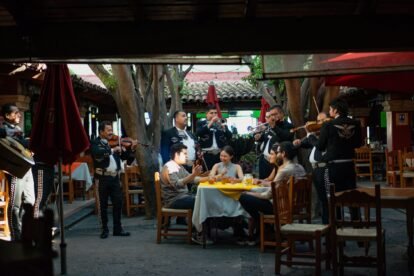
Mariachis in Mexico City (by Los Muertos Crew)
One of the buzzwords you hear a lot in the travel industry in the last few years is “authentic experience”. But what are authentic experiences? Why do we want them? And are they really that amazing? In this article, we’ll delve into this matter…
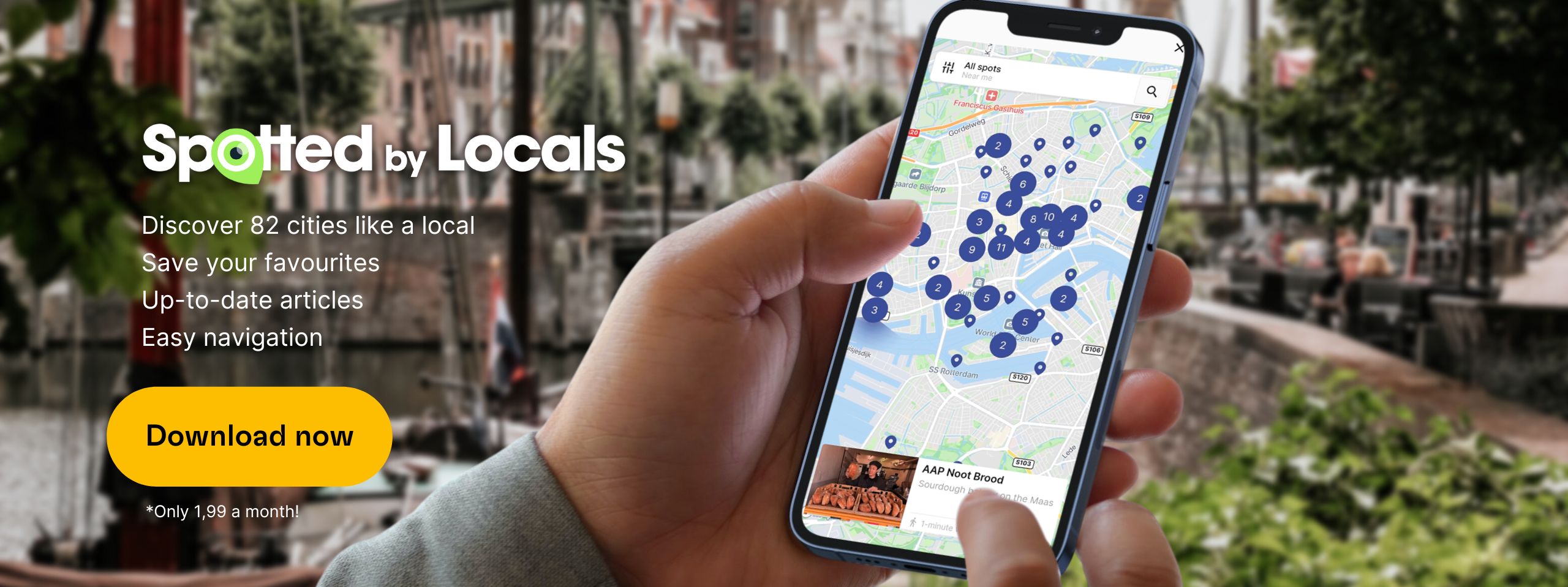
People want experiences

Immersive Van Gogh Experience (by Anna Velez)
The term “experience economy” has first been coined in 1998 as the next level of economy we’ll be entering after the “agrarian economy”, “industrial economy”, and “service economy” we have been through ( Pine & Gilmore, 1998 )
Millennials are the main target audience: According to an Eventbrite study, “more than 3 in 4 millennials (78%) would choose to spend money on a desirable experience or event over buying something desirable, and 55% of millennials say they’re spending more on events and live experiences than ever before.”
They are willing to spend a lot, but why? The same study found that the main motivators are FOMO (fear of missing out) and self-development.
Millennials want to do what they see on social media and feel pressured to do the same.
But they also see it as an important part of their self-development journey.
The difference between visiting and experiencing
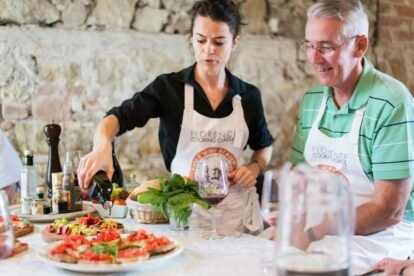
Cooking class in Italy (by Destination Florence)
You could say that traveling is already an experience in itself. However, there is a distinct difference between visiting a country and truly experiencing its culture. Travelers increasingly want to experience a unique, authentic, local, and immersive journey. This living like a local study showed that travelers increasingly demand authentic, experiential-oriented opportunities involving more meaningful interactions with locals.
Authentic experiences tend to be more memorable too. How memorable a trip is can be measured with an MTE test . The seven factors within MTES are hedonism, novelty, local culture, refreshment, meaningfulness, involvement, and knowledge. 24 items represent the factors; for example, local culture comprises three items (good impressions about the local people; closely experiencing the local culture, and local people in the destination were friendly).
But is it all real?

Men in kilts in Scotland (by Melody Ayres-Griffiths)
The idea of connecting with locals and truly experiencing local culture seems fantastic. But it may not be that simple. The Trip Doctor starts its great article about authentic travel experiences by describing a very travel experience that sounds very authentic, but also very uncomfortable. He asks “Do we really want an authentic travel experience?”
The Trip Doctor divides travellers into three categories:
- Those who want to authentically experience what people living in a destination see and do in their everyday lives, including food, culture, language, etc.
- Those who want to experience an authentic representation of the food, language, culture, etc. of a destination, created within the tourist bubble.
- Those who want to experience what they think the food, culture, language, etc. of a destination are like.
The article explains further that while most tourists think they fall into category 1, they actually fall into the second or the third. This is interesting as that means that most tourists don’t actually experience real local travel, they only think they do. But why is that?
We look for what does not exist.
The problem is is that we often have our own picture about the culture of a destination, and that’s what we’re going to look for. This picture is subjective and based on our personal perceptions, previous exposure to the culture (be it a movie or a friend from the place), and expectations. It almost never captures the whole picture.
Social media also plays a big role here. Social media is one of our biggest inspirations when it comes to choosing a destination. However, the way a destination is presented online is an idealized picture that does not exist in real life. Which sets our expectations wrong.
You can’t create authenticity.
“Not false or copied: Genuine and original, as opposed to being a fake or reproduction”
That’s the definition you’ll find in the dictionary when you look up authentic. An authentic experience is unique, can not be reproduced or staged. This is where the problems with fake authenticity begin.
Is a Scot wearing a kilt authentic? Or the Maori village in New Zealand who perform dance shows for tourist every night? And what about the painters in Montmartre in Paris? Some may class this as authentic, others may not. What we can’t deny here is that these experiences do not accurately represent the local culture. They are something from the past, not something that you would see a local do today.
Do we lose authenticity by looking for it?
So here’s where it gets really complicated, and uncomfortable. If locals perform their traditions for tourists, are they still authentic? Tourism has become a product, and authentic experiences also have become products. Heritage commodification is the process by which cultural themes and expressions come to be evaluated primarily in terms of their exchange value, specifically within the context of cultural tourism (Chambers 2005). These cultural expressions and aspects of heritage become “cultural goods”; transformed into commodities that can be bought, sold, and profited from. And as in all markets, these “goods” get adapted to what sells better.
So what now?
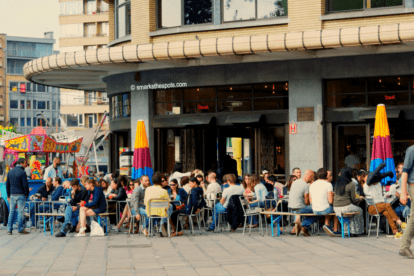
Locals at a bar (by S marks the spot)
So is wanting an authentic experience wrong? No not at all! But you should be aware of the theatre that is the tourism industry. If you want a real experience step out of it. Many tourism destinations have developed front-stage and backstage areas that serve similar purposes as those in a theater.
The front-stage is typically the area either formally or informally designated for tourism activities, which is often tied to a specific location in the city, for example, La Rambla in Barcelona.
If you step out of those zones you’ll have a widely different experience, the local one. That’s where you just go with the recommendations of the locals. Striking up a conversation at a local bar or testing out the restaurant the locals rave about, seeing a movie in the local theatre, or having a taste of the current cultural scene. That of course, is what we recommend you to do at Spotted by Locals
Latest Blog posts
![travel experience meaning 10 Unique Flea Markets in Europe [2024 Update!]](https://www.spottedbylocals.com/wp-content/uploads/midnightbazar-munich-by-ayla-amschlinger.jpg)
10 Unique Flea Markets in Europe [2024 Update!]
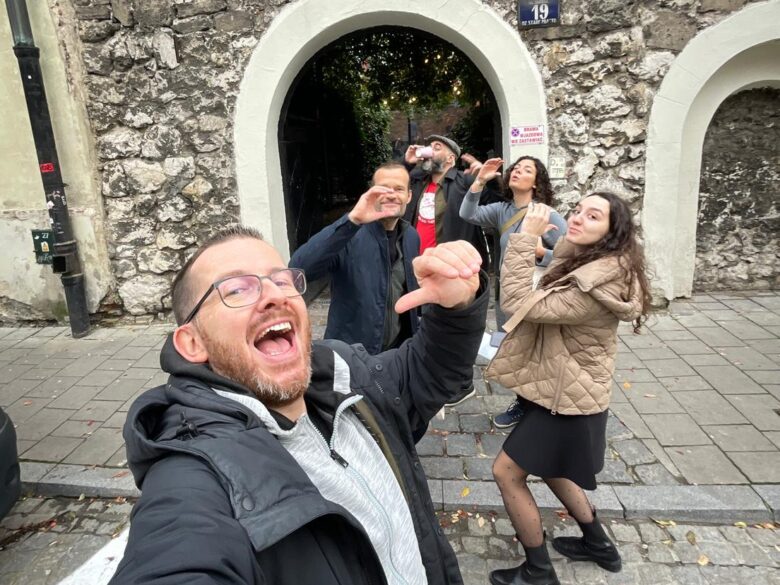
Spotters Weekend ’23 in Krakow: Connecting Communities

An Ideal Day in Zagreb: A Guide for the curious savvy traveller!

Our locals’ favourites in Munich: A Guide for the curious savvy traveller!

Unveiling the Hidden Gems of Prague: A Guide for the curious savvy traveller!
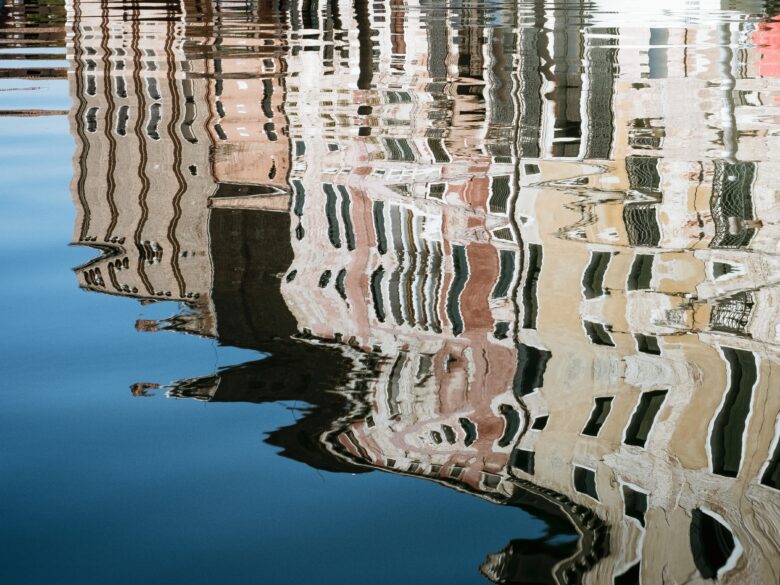
From Montreal to Milan: Carmen’s Adventures as a Spotter and Photographer
- © 2024 spottedbylocals.com™ // Terms of service // Privacy policy // (Why) we use cookies // Sitemap
- Design by joostliesveld.com
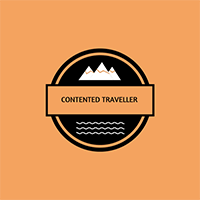
What is Experiential Travel, and why is it important
by Paula McInerney | Dec 14, 2016 | DESTINATIONS , Experiential Travel | 8 comments
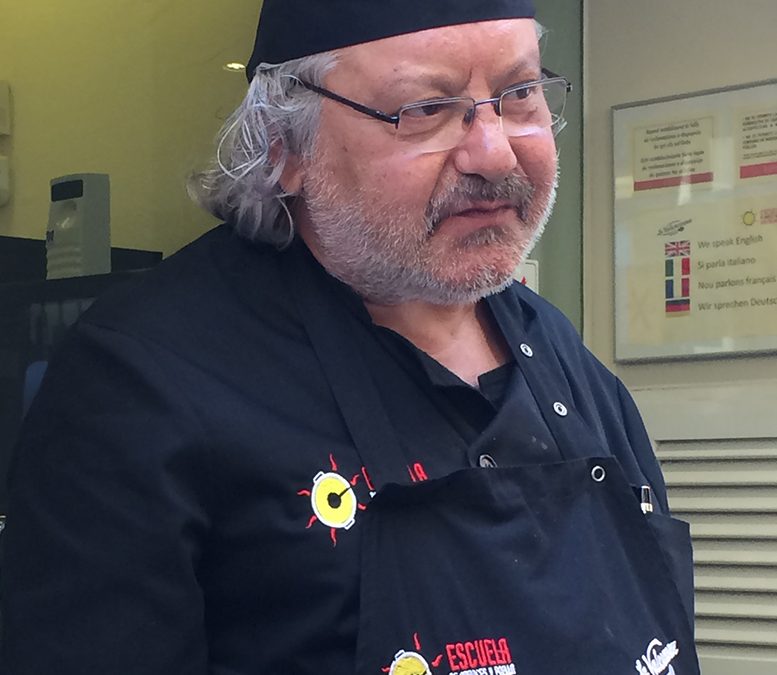
So what is Experiential Travel, and why is it so important? Let me explain.
It was the imperfect start to a perfect day and the start to our immersion experience in Valencia Spain. Chef Cross, and yes that is his real name, was cranky. We were unavoidably late to our paella class in Valencia, Spain . I tried to explain why we were late, but he didn’t speak English, and I don’t speak Spanish, so my explanations were sort of pointless; and well, he seemed just a little ..well…angry.
I was hot, and I was bothered because I have this punctuality fetish. He was hotter and seemingly more bothered that we were late to his Academy of Paella and he appeared to be a proud man. It was a Mexican standoff between one short, red-headed Australian with a bit of a temper and one big and cantankerous Spanish chef. Chef Cross had a beer in front of him, in the cobblestone alley outside of his school in this appealing Spanish city . I pointed to it, grabbed it, and took a sip…ok, ok, I took a gulp. He looked at me, smiled and therein nearly ended our Mexican standoff.
But more of that later.
I will just say that the best thing about experiential travel is the people you meet. The lovely man who was the volunteer tour guide in Tokyo, Japan, the girls from Antwerp who were hungry and chose to help us eat our meal. The ski instructor from Kitzbuhel and even the man from Kitzbuhel who firmly believed that I was his first affair at Bondi Beach. That is where the stories come from, and where the invaluable travel experiences come from.
It is rare that you will meet a person telling you that their travels went perfectly. The best stories are the ones where ‘things just happened’.
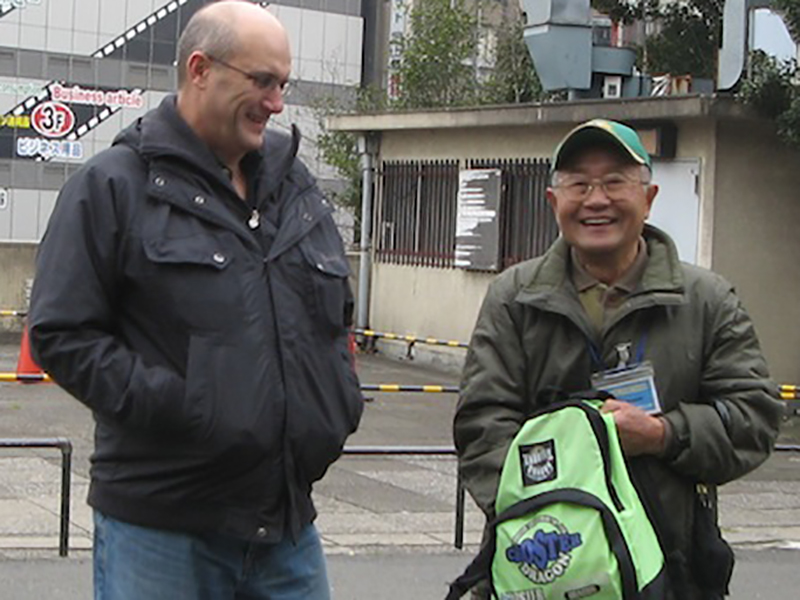
Gordon and Ichiro – our volunteer Tokyo Tour Guide
What is Experiential Travel?
- 1 What is Experiential Travel?
- 2 What Travelers Want
- 3 Why the Rise of Experiential Travel
- 4 What does Experiential Travel mean for Travel Bloggers?
- 5 Let me tell you about more Chef Cross
Well, experiential travel, often called immersion experiences, and are what a lot of travelers have been doing for a long time, but what a lot more are now demanding from the travel industry. It is about experiencing a place with all of your senses . Your sense of smell, taste, touch and the other ones, and getting a better feel of how other people live. Many people want to walk into a boulangerie and practice saying ‘Bonjour” and order a baguette in France, to drink kava in the Pacific islands , and to get naked and have an onsen in Japan , because these are examples of experiential travel. It can also be a cooking school, working with local people, and more importantly it is those serendipitous moments that you can never plan.
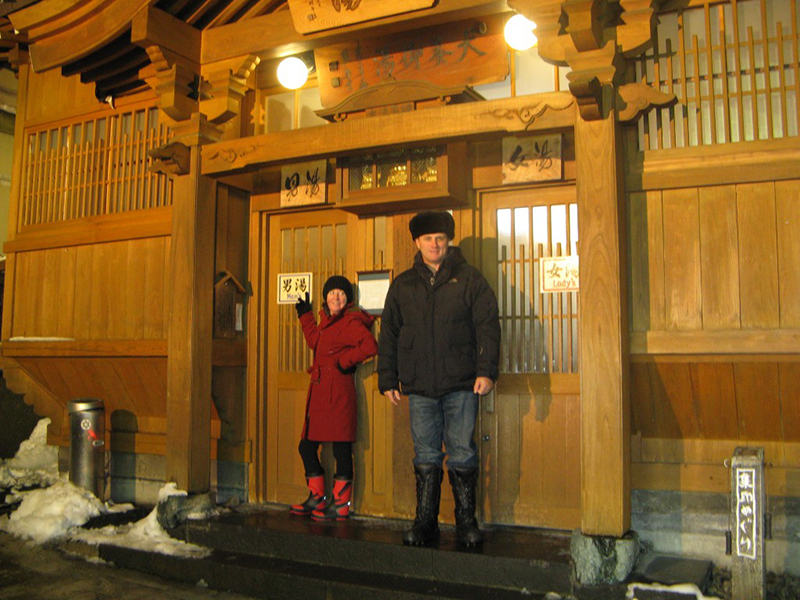
Outside the male and female onsens in Nozawa Onsen, Japan
It does not mean forsaking seeing iconic things like the Eiffel Tower, the Colisseum, and the Taj Mahal because there are very good reasons why these places became famous in the first place. Experiential travel means having it all. Seeing wonderful things, and watching people do their washing, or shopping at the markets.
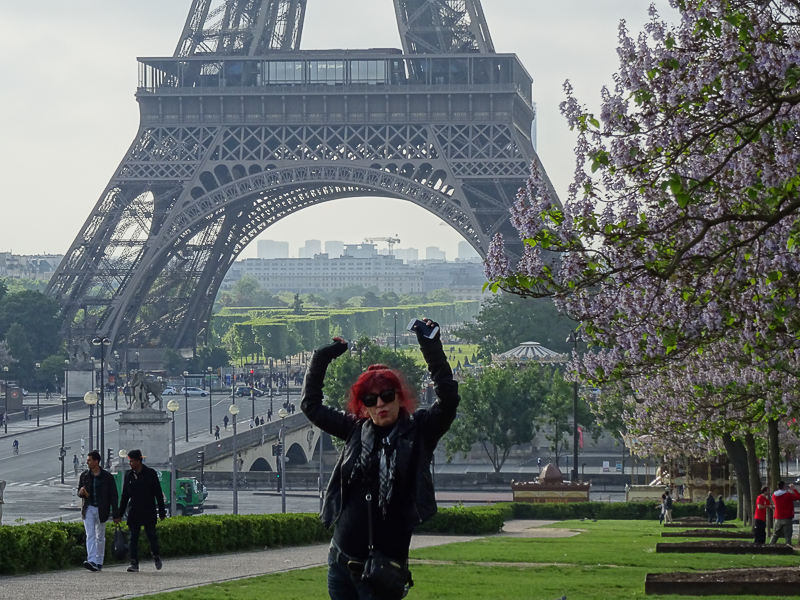
What Travelers Want
Let’s think about this logically. Are you going to go to Ireland and not have a Guinness? Now, I don’t even like the stuff, but I will surely be having one when we go later next year ..to be sure, to be sure. I am planning on sitting in a pub, listening to Irish music, hearing lamentable and drunken poetry readings, and there will be a Guinness in front of me. I will listen to James Joyce, and Oscar Wilde readings, and probably endure Waiting for Godot just once . Why? Other than I don’t like Samuel Beckett’s play, these are the things that I associate with Ireland. The literary heritage that emerged from the pubs. And I will be looking for Leprechauns too. You can read all about our experiences in Ireland.
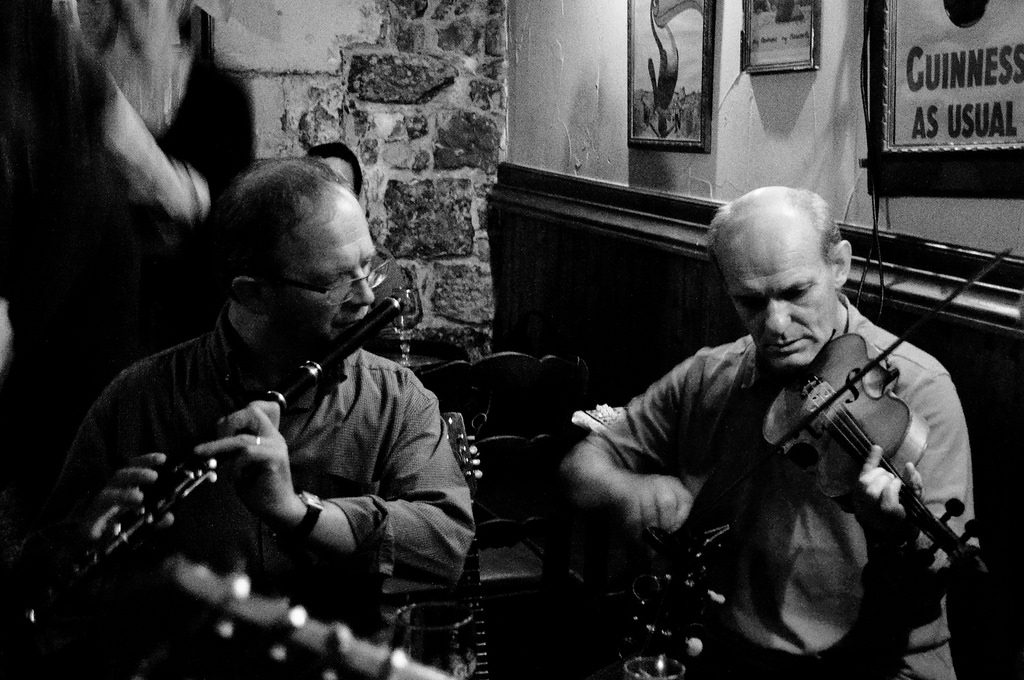
Music in an Irish Pub
Photo: Mitternacht
I associate struggling artists like Van Gogh in the Parisian cafes of Montmartre. It is why you could have a totally immersive and drunken travel experience if you trod in the footsteps of Ernest Hemingway. The man was everywhere from Paris to Madrid, from Cuba to Idaho. In fact, what an amazing experiential travel experience that would be, except that he might have committed suicide after this, possibly linked to his lifestyle choices, or it could have been Haemochromatosis .
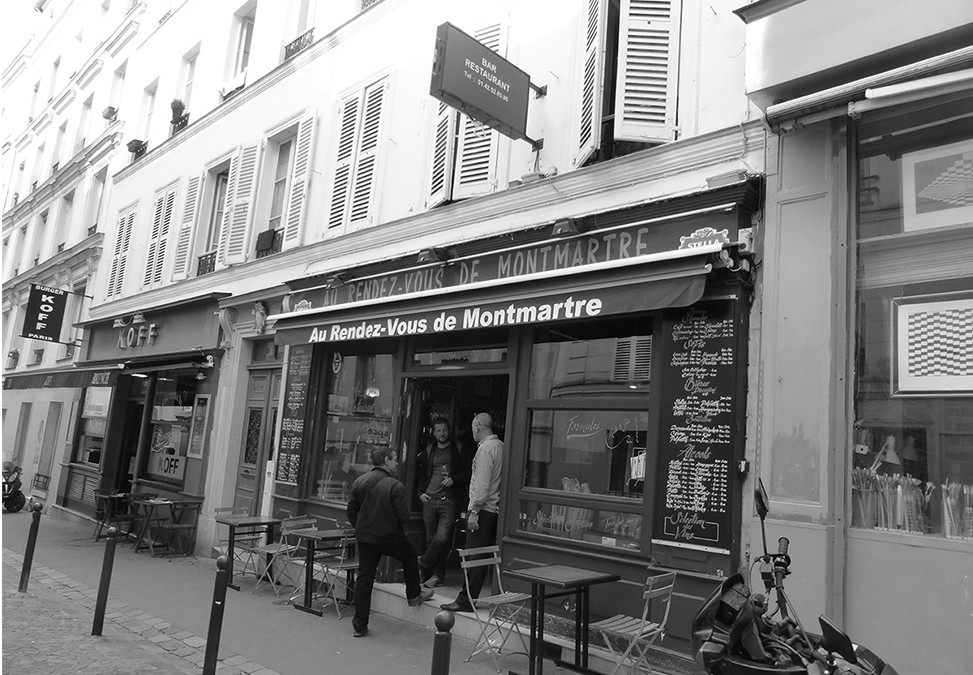
street scene Montmartre
Why the Rise of Experiential Travel
Experiential Travel is the catch phrase in the travel industry, and is all about the rise of having immersive travel experiences. This travel term has been spoken about over the years, but 2017 would appear to be THE year where people are seeking these experiences in the places that they visit. This has been touted at many travel conferences like to World Trade Market held in London and will be a focus at the Arabian Travel Market in Dubai in 2017.
Trying to organize these serendipitous moments of getting a glimpse into others lives is difficult. It sometimes just happens like the barman we briefly met from Newport, Rhode Island , where he worked at a fish whisperers restaurant, and who we still keep in contact with, despite him not living in Iceland.
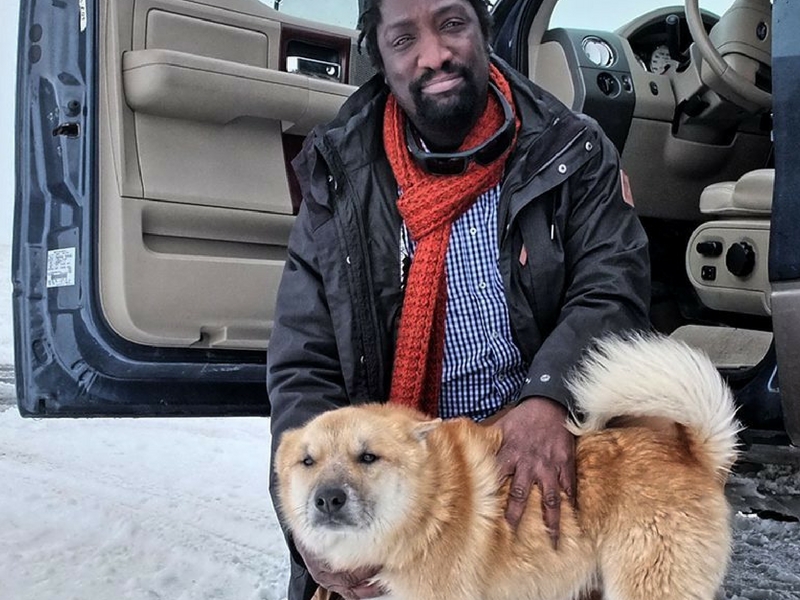
People you meet while traveling
As Jeremy Smith, at the World Travel Market said,
“If there was a First Rule of Authenticity, it would be: You cannot create Authenticity. […] If there was a Second Rule of Authenticity for 2016, it would be: You do not talk about being authentic. At least not if you actually are.”
But, one of the best qualities of man is our ability to try to understand others, our innate curiosity in others and this is why experiential travel often just happens.
New? No, and many will correctly argue that no transient traveler, can ever truly be immersed in another culture. Does it matter if they or we are only getting a snapshot or a caricature of the place? I don’t think so. It is better than not getting any insights.
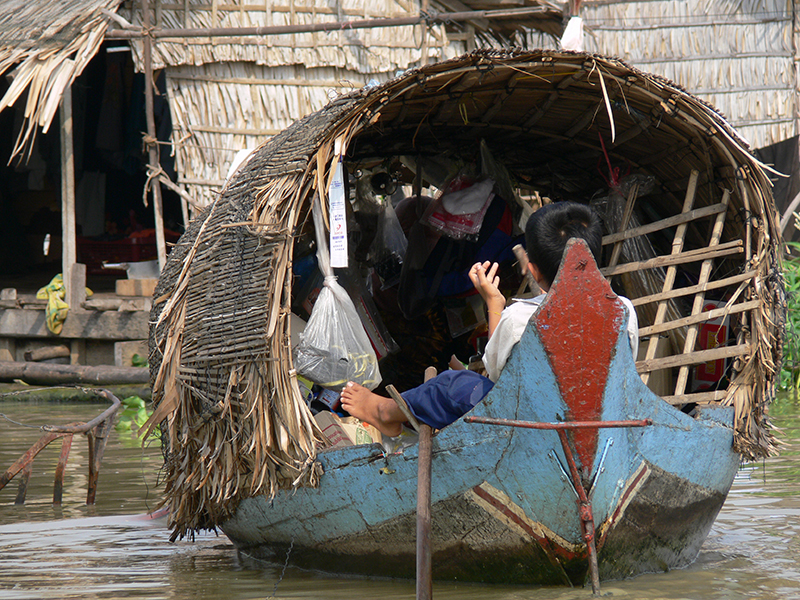
On the way to Battambang, Cambodia you see people living on the Tonle Sap River
What does Experiential Travel mean for Travel Bloggers?
People will base their travel decisions on many emotive factors. They have seen a beautiful photo, read an engaging story, seen an amazing video or documentary that makes a destination or/and an experience more appealing to them. Yes, there are iconic things that they want to see , but they and we also want to get a feel of the place. They and we want that Guinness in the pub in Dublin.
It means for travel bloggers and writers that as we share our experiences, our readers can get a feel and a sense of a place. We involve readers and fellow travellers in our stories. It could probably be suggested that the trend for travel bloggers in 2017 is the rise of the story teller. The rise of humanistic storytelling, grammatical errors and all, show we as travel writers are human also. OK, I made up the grammatical errors because this is not my forte, but at least people know when they are reading a Paula article. Travel blogs need to engage on this personal level with the readers and fellow travelers.
If you want to start a travel blog, click here .
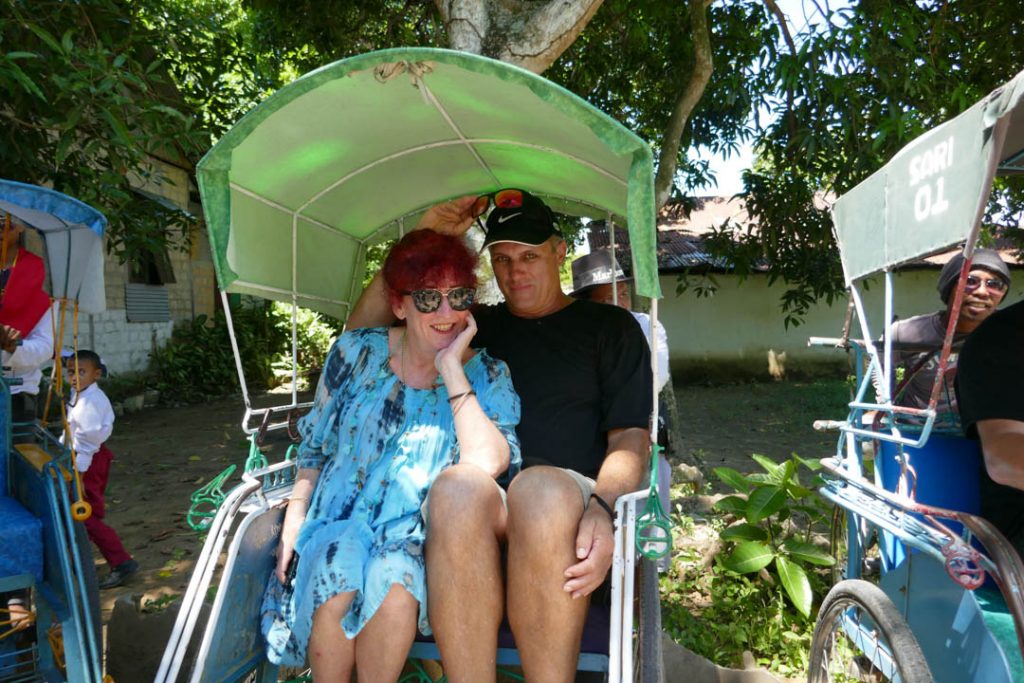
Doom Island is in Indonesia on the way to Raja Ampat
Let me tell you about more Chef Cross
Chef Cross rode my ass all day as I learned how to make this Valencian dish of paella. This was probably because I was busy chatting to two lovely people from Switzerland, and figured that Gordon was sanctifying himself by being a model student. Chef Cross called me outside. I thought, OMG he is kicking me out of his school. But no, he sat down to have another beer and gave me another sip. We looked up and down the cobblestoned lane, and we just enjoyed a day in the sun in a Spanish city with little to no words spoken.
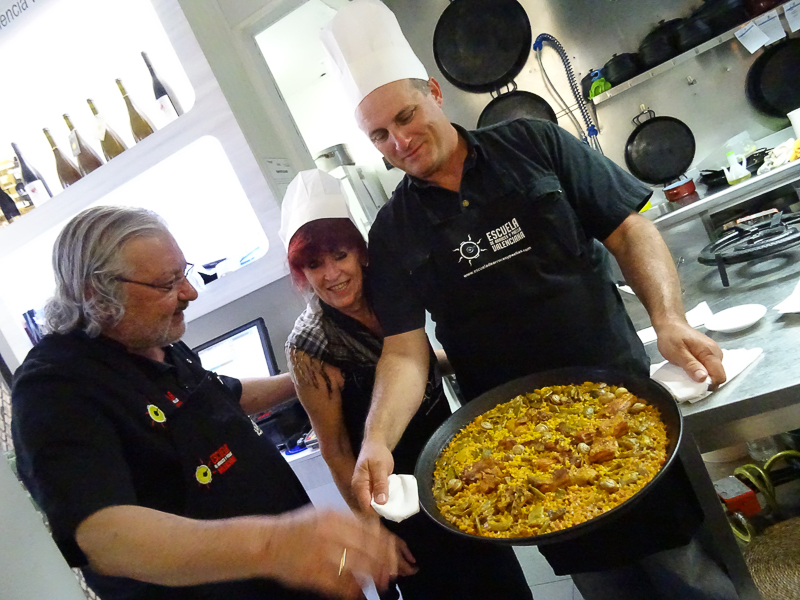
It was a perfect day, and he presented us with our Paella Graduation Certificates because he and I had got to understand one another a little better, and Gordon is just a good student. It was an authentic travel experience. The experience where you don’t mention the word authentic.
- Google Plus
Related posts:
No related posts.
This is the very reason I travel. I agree with the point about not being able to create authenticity and I’m not sure how satisfied travellers will be if they expect their travel agent to “arrange” this for them. I get that we can arrange immersive activities with a tour company etc, but whilst experiential travel definitely requires us to explore wider and approach people, in my experience the most memorable moments of when I’ve befriended a local or witnessed a display of typical culture have often been chance encounters. Sometimes it seems to pay when you don’t try too hard and simply let fate take its course. And that’s what I love about experiential travel!
100% agree, we say it is all about serendipity when we have some of our best encounters when traveling.
Count me in! I love doing, seeing, tasting, smelling and experiencing everything when I travel. You ask my husband – I’m like a puppy let out of the kennel! I love your sentence “We involve readers and fellow travellers in our stories”. I think this so true about travel bloggers. We do tell it like it is. Nice post. 🙂
I am the same, I love everything about travel. I feel quite childlike at times, but I love the puppy analogy – as did Gordon when I read this to him.
Love this! My thought is that the reason for the rise in the desire for experiential travel is a direct juxtaposition to the consumerist, “stick in a box and put a name on it” kind of travel that has been doing the rounds for a while now. Warning though, don’t go too hard on the Guinness, I put on 5kg in 4 weeks drinking the stuff 😉
I am just going to get photos of me with a Guiness in front of me 🙂 You have a distinct point about experiential travel.
Experiential travel is my favorite way to travel. Seeing sites is fine but learning about and from people makes travel come alive.
I want it both ways, and that is the best part of travel, that you can.
Submit a Comment Cancel reply
Your email address will not be published. Required fields are marked *
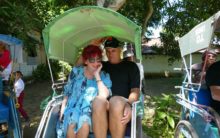
We love experiencing a country, city or place by connecting to its history, people and culture.
We know that today’s traveller seek experiences, because that is what we also do.
Pin It on Pinterest

What is experiential tourism?
The EXPERIENCE model is about doing tourism differently and this requires a shift in thinking from traditional tourism to being more responsive to the needs and the emotions of visitors or tourists alike. Equally, EXPERIENCE is about adapting and responding to the urgency of climate change and creating more sustainable options. The focus is on encouraging visitors to explore their local regions and tourists to travel off the beaten track. An experience should aim to stimulate the five senses (sight, hearing, touch, smell, and taste) and/or arouse positive emotions (happiness, fun, surprise, joy, contentment…). To design such experiences, you need to be clear what you want your customers to experience when they are with you.

This is where you can find presentations, manuals, studies and so much more to help you understand experiential tourism.

Case studies
Here you can find case studies and good examples of how businesses are benefiting from experiential tourism

Video resources
Use our video resources - workshop recordings, bite-size video training, interviews - to learn more about experiential tourism and how to develop experiences.
The force of change in the travel experience
T he last couple of years have rewired what travelers care about and how they act. In fact, half of consumers say that the pandemic caused them to rethink their personal purpose and re-evaluate what’s important to them. 1
This reveals a massive white space for travel brands—an opportunity to differentiate themselves and follow new paths to accelerate and grow their business.
The place to start? Understanding the new traveler today.
Travelers’ demands
The pandemic forced travelers—en masse—to shift their expectations completely and more rapidly than we’ve seen at any other time in history and caused them to rethink their purpose.
Travelers are now channel-less, contact-less, time-less and audience-less.

We explore the shift in travelers’ demands and the critical accelerators that will help travel companies drive growth through the travel experience.
What does this mean for travel brands?
To help companies respond to these new travel preferences, we have identified critical accelerators to drive market differentiation and improve the travel experience :
1. Creativity to inspire.
Driving differentiation with scalable communications and innovative experiences will allow travel brands to meet rising motivations and ignite growth. Learn more .
2. 0-Channel distribution.
Travel brands need to adapt to new liquid demand in the distribution landscape to achieve better return on investment.
3. Tech-empowered.
The right technology foundation for recovery and growth requires incremental transformation with agility, innovation and resilience at the heart. Learn more .
4. Data as guidance.
The combination of cloud and data expertise makes it possible to experiment with new loyalty initiatives, booking flows, customer care and experience. Learn more .
5. Sustainability, the north star.
Travelers are attracted to companies with a track record of green operations, so travel brands need to build sustainability into their DNA. Learn more .
The takeaways
Travel companies have important choices ahead. It’s one thing to be aware of how the acceleration of new travelers’ demands is pressuring the industry. It’s another to see the opportunities in of all this change—and seize them. We can help you. Let’s begin with these takeaways:
- Redesign your inspiration strategy
- Adopt a liquid demand centric distribution strategy
- Use data as a guidance layer to orchestrate the whole customer experience value chain
- Design, build and communicate your sustainable platform
1 Life Reimagined: Mapping the motivations that matter for today’s consumers

Managing Director – Products Lead, Iberia

MANAGING DIRECTOR – SONG

CONSULTANT – SONG

ANALYST – SONG

The Guide: Travel industry magazine

Break the mold on travel loyalty programs

Travel industry recovery: Business or leisure?
Related capabilities, travel consulting.
Accenture helps travel companies outmaneuver uncertainty in a new era of travel.
Traveler experience
Traveler needs have changed, and experiences must change with them to bring back customers and regain trust.
The responsible travel company
We help travel companies act effectively on ESG goals to achieve a sustainable recovery.
National Geographic content straight to your inbox—sign up for our popular newsletters here
- THE BIG IDEA
Why travel should be considered an essential human activity
Travel is not rational, but it’s in our genes. Here’s why you should start planning a trip now.

In 1961, legendary National Geographic photographer Volkmar Wentzel captured two women gazing at the surf off Peggy’s Cove, Nova Scotia. This and all the other images in this story come from the National Geographic image collection.
I’ve been putting my passport to good use lately. I use it as a coaster and to level wobbly table legs. It makes an excellent cat toy.
Welcome to the pandemic of disappointments. Canceled trips, or ones never planned lest they be canceled. Family reunions, study-abroad years, lazy beach vacations. Poof. Gone. Obliterated by a tiny virus, and the long list of countries where United States passports are not welcome.
Only a third of Americans say they have traveled overnight for leisure since March, and only slightly more, 38 percent, say they are likely to do so by the end of the year, according to one report. Only a quarter of us plan on leaving home for Thanksgiving, typically the busiest travel time. The numbers paint a grim picture of our stilled lives.
It is not natural for us to be this sedentary. Travel is in our genes. For most of the time our species has existed, “we’ve lived as nomadic hunter-gatherers moving about in small bands of 150 or fewer people,” writes Christopher Ryan in Civilized to Death . This nomadic life was no accident. It was useful. “Moving to a neighboring band is always an option to avoid brewing conflict or just for a change in social scenery,” says Ryan. Robert Louis Stevenson put it more succinctly: “The great affair is to move.”
What if we can’t move, though? What if we’re unable to hunt or gather? What’s a traveler to do? There are many ways to answer that question. “Despair,” though, is not one of them.

In this aerial view from 1967, wall-to-wall seaside sunbathers relax under umbrellas or on beach towels in Ocean City, Maryland .

A 1967 fall festival in Guadalajara, Mexico , starred traditionally costumed musicians and dancers.
We are an adaptive species. We can tolerate brief periods of forced sedentariness. A dash of self-delusion helps. We’re not grounded, we tell ourselves. We’re merely between trips, like the unemployed salesman in between opportunities. We pass the days thumbing though old travel journals and Instagram feeds. We gaze at souvenirs. All this helps. For a while.
We put on brave faces. “Staycation Nation,” the cover of the current issue of Canadian Traveller magazine declares cheerfully, as if it were a choice, not a consolation.
Today, the U.S. Travel Association, the industry trade organization, is launching a national recovery campaign called “ Let’s Go There .” Backed by a coalition of businesses related to tourism—hotels, convention and visitor bureaus, airlines—the initiative’s goal is to encourage Americans to turn idle wanderlust into actual itineraries.
The travel industry is hurting. So are travelers. “I dwelled so much on my disappointment that it almost physically hurt,” Paris -based journalist Joelle Diderich told me recently, after canceling five trips last spring.
(Related: How hard has the coronavirus hit the travel industry? These charts tell us.)
My friend James Hopkins is a Buddhist living in Kathmandu . You’d think he’d thrive during the lockdown, a sort-of mandatory meditation retreat. For a while he did.
But during a recent Skype call, James looked haggard and dejected. He was growing restless, he confessed, and longed “for the old 10-countries-a-year schedule.” Nothing seemed to help, he told me. “No matter how many candles I lit, or how much incense I burned, and in spite of living in one of the most sacred places in South Asia, I just couldn’t change my habits.”
When we ended our call, I felt relieved, my grumpiness validated. It’s not me; it’s the pandemic. But I also worried. If a Buddhist in Kathmandu is going nuts, what hope do the rest of us stilled souls have?
I think hope lies in the very nature of travel. Travel entails wishful thinking. It demands a leap of faith, and of imagination, to board a plane for some faraway land, hoping, wishing, for a taste of the ineffable. Travel is one of the few activities we engage in not knowing the outcome and reveling in that uncertainty. Nothing is more forgettable than the trip that goes exactly as planned.
Related: Vintage photos of the glamour of travel

Travel is not a rational activity. It makes no sense to squeeze yourself into an alleged seat only to be hurled at frightening speed to a distant place where you don’t speak the language or know the customs. All at great expense. If we stopped to do the cost-benefit analysis, we’d never go anywhere. Yet we do.
That’s one reason why I’m bullish on travel’s future. In fact, I’d argue travel is an essential industry, an essential activity. It’s not essential the way hospitals and grocery stores are essential. Travel is essential the way books and hugs are essential. Food for the soul. Right now, we’re between courses, savoring where we’ve been, anticipating where we’ll go. Maybe it’s Zanzibar and maybe it’s the campground down the road that you’ve always wanted to visit.
(Related: Going camping this fall? Here’s how to get started.)
James Oglethorpe, a seasoned traveler, is happy to sit still for a while, and gaze at “the slow change of light and clouds on the Blue Ridge Mountains” in Virginia, where he lives. “My mind can take me the rest of the way around this world and beyond it.”
It’s not the place that is special but what we bring to it and, crucially, how we interact with it. Travel is not about the destination, or the journey. It is about stumbling across “a new way of looking at things,” as writer Henry Miller observed. We need not travel far to gain a fresh perspective.
No one knew this better than Henry David Thoreau , who lived nearly all of his too-short life in Concord, Massachusetts. There he observed Walden Pond from every conceivable vantage point: from a hilltop, on its shores, underwater. Sometimes he’d even bend over and peer through his legs, marveling at the inverted world. “From the right point of view, every storm and every drop in it is a rainbow,” he wrote.
Thoreau never tired of gazing at his beloved pond, nor have we outgrown the quiet beauty of our frumpy, analog world. If anything, the pandemic has rekindled our affection for it. We’ve seen what an atomized, digital existence looks like, and we (most of us anyway) don’t care for it. The bleachers at Chicago ’s Wrigley Field; the orchestra section at New York City ’s Lincoln Center; the alleyways of Tokyo . We miss these places. We are creatures of place, and always will be.
After the attacks of September 11, many predicted the end of air travel, or at least a dramatic reduction. Yet the airlines rebounded steadily and by 2017 flew a record four billion passengers. Briefly deprived of the miracle of flight, we appreciated it more and today tolerate the inconvenience of body scans and pat-downs for the privilege of transporting our flesh-and-bone selves to far-flung locations, where we break bread with other incarnate beings.

Landscape architects work in their Rio de Janeiro, Brazil , studio in 1955.

A tourist photographs a towering century plant in St. Thomas, U.S. Virgin Islands, in 1956.
In our rush to return to the world, we should be mindful of the impact of mass tourism on the planet. Now is the time to embrace the fundamental values of sustainable tourism and let them guide your future journeys. Go off the beaten path. Linger longer in destinations. Travel in the off-season. Connect with communities and spend your money in ways that support locals. Consider purchasing carbon offsets. And remember that the whole point of getting out there is to embrace the differences that make the world so colorful.
“One of the great benefits of travel is meeting new people and coming into contact with different points of view,” says Pauline Frommer, travel expert and radio host.
So go ahead and plan that trip. It’s good for you, scientists say . Plotting a trip is nearly as enjoyable as actually taking one. Merely thinking about a pleasurable experience is itself pleasurable. Anticipation is its own reward.
I’ve witnessed first-hand the frisson of anticipatory travel. My wife, not usually a fan of travel photography, now spends hours on Instagram, gazing longingly at photos of Alpine lodges and Balinese rice fields. “What’s going on?” I asked one day. “They’re just absolutely captivating,” she replied. “They make me remember that there is a big, beautiful world out there.”
Many of us, myself included, have taken travel for granted. We grew lazy and entitled, and that is never good. Tom Swick, a friend and travel writer, tells me he used to view travel as a given. Now, he says, “I look forward to experiencing it as a gift.”
Related Topics
- TRAVEL PHOTOGRAPHY
- VINTAGE PHOTOGRAPHY
You May Also Like

Don’t rely on social media: Here’s why you should keep a travel journal

How to take perfect portrait photos
For hungry minds.

What's new in London's museums ahead of King Charles III's Coronation

Explore 6 of history’s most infamous scams and hoaxes

We swapped baths for showers—but which one is better for you?

An antique process helps this photographer capture coastlines bound by Celtic soul

Do you have an inner monologue? Here’s what it reveals about you.
- Environment
History & Culture
- History & Culture
- History Magazine
- Mind, Body, Wonder
- Coronavirus Coverage
- Paid Content
- Terms of Use
- Privacy Policy
- Your US State Privacy Rights
- Children's Online Privacy Policy
- Interest-Based Ads
- About Nielsen Measurement
- Do Not Sell or Share My Personal Information
- Nat Geo Home
- Attend a Live Event
- Book a Trip
- Inspire Your Kids
- Shop Nat Geo
- Visit the D.C. Museum
- Learn About Our Impact
- Support Our Mission
- Advertise With Us
- Customer Service
- Renew Subscription
- Manage Your Subscription
- Work at Nat Geo
- Sign Up for Our Newsletters
- Contribute to Protect the Planet
Copyright © 1996-2015 National Geographic Society Copyright © 2015-2024 National Geographic Partners, LLC. All rights reserved
Life-changing travel experience stories
There’s nothing like other travelers’ tales to get inspiration . When you are home longing to be on the road, or when you are on a journey wondering why you left the comfort of your house, submerge into these life-changing travel experience stories, beautiful tales of how a trip can alter the trajectory of your life .
I’m sure my regular readers are used to me talking about travel experiences . But for those who are discovering this little window to my soul called Experiencing the Globe , you can see that it all started with a bucket list of all the –surprise, surprise– travel experiences I want to have around the world.
The list is my goal in life, so I’m spending as much time as I can on the road. But when I’m home in between trips I seek inspiration in other travelers’ tales. I’ve read as many books about exciting journeys as I could put my hands on. And recently I got a hold of Lonely Planet’s Travel Goals: Inspiring Experiences to Transform Your Life .
It got me thinking of my own life-changing travel experiences . Like my transformation into a sustainable traveler after fully grasping what that meant for the planet and all the life in it. I have a trip to the Caribbean to thank for that. The first trip I took alone, when I was starting to test my boundaries, empowered me as a solo female traveler, and opened my eyes to a new world of possibilities! I’m so thankful I chose Italy , an amazing destination to explore on your own! I reaffirmed my faith in human kindness after spending a month in Iran , meeting the loveliest people I’ve ever encountered. And the most literal life-changing travel experience, moving to Croatia after meeting the love of my life in this beautiful country that now I call home.
The book also encouraged me to ask other travelers if they had a story in their own travels that changed their lives in one way or another. I was overwhelmed with the beautiful tales… some of the best life-changing stories that’ll inspire you to travel!
Life-changing travel experience stories that’ll inspire you to travel
Collecting memories, not counting countries.
I want to start this series of tales with my own. As I told you, many aspects of my life have changed over the years due to a travel experience, but the one I want to elaborate on is the one that defined what my life would be. Traveling hasn’t changed me, it has made me. It’s who I am. Several trips to the south of Chile showed me where I was going. This is the story of how I became the person I am today:
My parents took me camping to the Chilean Lake District every summer while growing up. This was in the dark age, before the internet. Back then we had to rely on maps and guidebooks. So through the endless hours of our road trips, I kept myself entertained glancing at a map, reading about the small towns we passed, and convincing my folks to take a detour to visit some place that caught my attention.
During one trip I told them that I have decided I wanted to go everywhere in the world. After a few laughs, my dad told me about the Travelers’ Century Club (TCC), a group for people who have visited 100 or more of the world’s countries and territories. My eyes sparkled with the thought of being a member, and I made it my goal.
Obviously, I started asking to go to another country instead of the same National Park we always visited. They laughed again –conscious of the monster they have created– and offered a compromise: they’d take me to our neighbor Argentina, my first trip abroad, but I had to see more of my own country before I embarked on my adventure of visiting another hundred. I happily accepted.
See, what I immediately realized is that –as much as I wanted to be part of the TCC– the main reasons to travel should revolve around what I’ll get out of a trip –whether that’s meeting locals, tasting the typical cuisine, exploring nature, or adventuring into an activity– it shouldn’t be just to count countries . I know the “why you should travel” is super personal, but ticking countries off a list only because you put your feet there feels meaningless to me.
Why do people travel? Well, there are as many reasons as people traveling, but even if it is to get a tan while you’re permanently sipping from a cocktail, that trip will always be part of your story, so you should make the most of it.
After visiting every region in Chile, I started to go abroad. Nowadays, getting closer to 100 countries and territories of the TCC list properly visited, what I knew instinctively, transformed into lessons I learnt during my travels … What inspires me the most to hit the road is experiences, because they feed my adventurous soul –the TCC list (and my own bucket list) became the means to guide my journey, not an end themselves.
Spreading the word about the truth of traveling
Claudia’s life story is remarkably similar to my own. Being avid travelers changed the way we perceive a destination, and the story that should be told about it. We both left behind an academic career and repurposed our research abilities towards travel writing. Now we both blog from a distinct point of view. This is the story of how in a visit to Cuba she found her true calling:
“Cuba changed my life because it was nothing like I had expected it to be –quite the opposite, in fact. You see, being the avid traveler that I am, before my trip to Cuba I spent months reading just about anything I could put my hands on. If it talked about Cuba, I had to read it. Everything made it sound like traveling to Cuba would be easy, and locals would be generous and welcoming.
My time in Cuba was less than fabulous. Don’t get me wrong, it is a gorgeous country and now, a few years later, with much more traveling experience and understanding, I am ready to go again. But back then, it was awful. My 23 days there were a constant challenge to avoid scams –a challenge that a few times saw me succeed but that other times saw me fail miserably. It was frustrating. I felt I could not trust anybody. Where were the lovely Cubans everyone talked about in their blogs?
Cuba taught me that people lie, even (or especially) online. Because nobody really wants to say they have had a bad experience, and nobody is really interested in reading about others’ bad experiences –but is that really the case?
I decided there and then to be different. I decided that I had to warn others, tell them the truth, let them know what they should expect and what they should do to avoid scams. That’s why I opened my blog. It was just a pastime at the beginning.
Fast-forward 2 years and I realized that I did want to make an effort to make it work out. After all, what did I have to lose? My contract as a research fellow at the university had expired and I had no real prospect if not a series of menial short-term teaching jobs I was less than interested in. So, I gave blogging my heart and soul. And it worked. I’m a much happier person now. I love what I am doing. I wake up in the morning to face a long list of to-do things and I read it with a smile on my face, which is priceless.
Cuba changed my life. And despite all the frustration I felt back when I was there, it changed it for the best.”
RELATED POSTS:
- Marrakesh: the good, the bad and the ugly
- Azerbaijan: what I loved and what I hated
Encountering wildlife to find yourself
Camilla was looking for something, but she wasn’t sure what it was. Her heart lead her to India , and after that trip her life would never be the same. Animals can have different impacts in our life, but for this former vegan chef, one particular big cat meant more than anything. This is her story:
“January 2017. That’s the date I first arrived in India. By that time, I used to work as a freelance vegan chef in the hustling city of Paris. Having attended a 4-weeks course on yoga and Ayurveda, I had planned to spend the following month exploring this amazing country.
Little did I know that a special encounter would change my life forever.
Always an animal lover, over the years I had developed a passion for the most majestic of big cats: the tiger. The striped animal had somehow summoned me. To what reason and to convey what message I do not know, but to such a call one can hardly resist.
India is home to more than 60% of the world’s remaining wild tigers. The critically endangered species is highly protected, and the country has given to many of its national parks the status of Tiger Reserve.
It was time for me to see my first one in the wild.
With zero safari experience and many hours of research, I booked 4 drives in Ranthambhore, one of India’s most famous Tiger Reserves .
I will always remember the excitement before that first drive in the jungle, and I will never forget the distress of realizing that finding the elusive cat is no easy task.
But all of a sudden, there it was. Glorious in its fierce black striped orange coat, a killer look and an attitude to die for. My first wild tiger.
That fleeting moment was enough to make me want more. Today, I have moved to Central India, prime tiger landscape of the world, and I have seen 103 different individuals. But every time I see those eyes, I feel the same excitement that I felt as a total beginner that day in Ranthambhore.”
Finding love in an unexpected place
Traveling is full of surprises. A spontaneous detour can change your life forever. Don’t I know it! A quick, unplanned stop in Split after exploring Dubrovnik ended up seeing me move continents for love. A simple recommendation of a town in The Philippines had the same in store for Alya. This is the tale of the trip that lead her to her husband:
“Meeting my future husband was definitely one of the most life-changing travel experiences I’ve ever had. We met 6 years ago in the Philippines. I was traveling alone around Southeast Asia for a couple of months. After completing my dive course in Gili Air Island in Indonesia and didn’t know where to go next. I was looking for a good place to learn to surf. My dive instructor told me about a small town on Luzon Island in the Philippines. It sounded like the perfect place for me. I bought a plane ticket immediately and two days later arrived in San Fernando.
The hostel I stayed at had a big dormitory with many beds. I met many travelers including Campbell. In fact, we had neighboring beds in the dormitory. He traveled alone as well and we liked each other, so we started going together to the beach, surfing and going out at night. By chance we had very similar travel plans and decided to continue our trip together.
We both like doing the same things, like surfing, diving and hiking. We left San Fernando and traveled around the Philippines together for 2 months. From there we went to Singapore. Unfortunately, I had to go back home, my 4-month holiday was over. We arranged to meet up again two months later in Nepal since we both had trekking to Everest Base Camp on our bucket list. So we did, it was our first multi-day trek together.
We met up a couple of times on the road again in different countries. After 6 months of on and off I decided to quit my job and join Campbell on his around the world adventure. Three years later we got married and decided to start a travel blog . In the last 6 years we’ve done hundreds of hikes, spent a year hitchhiking through Latin America, drove thousands of kilometers across Africa and walked seven Camino de Santiago routes.
Now I can’t imagine how my life would look like if I hadn’t gone to that place in the Philippines and had never met my husband.”
Giving is better than having
A trip to South East Asia gave Corritta’s life a whole new meaning. Possessions are overrated, true happiness comes from giving. She and her family left a comfortable life in the United States behind to fill their souls while making the world a better place. This is the tale of their journey:
“My life changing experience prompted me to sell our house, car and possessions to take off on a journey to see the world. That may seem a little extreme but let me explain. My first international trip was to Bangkok in 2018. I thought this trip would be a great way to get away from the stress in my life. It turned out to be a life altering experience that made me realize I was existing, not living.
While in Bangkok we took a day trip to Wildlife Friends Foundation Thailand and it changed my life. We learned how cruel animal tourism is and how we, as tourists, are unwitting accomplices. We support illegal pouching and animal cruelty by taking part in animal tourism. This includes taking pictures with large cats or monkeys and riding elephants. When we do these things, we are not only hurting the animals, we are ensuring things will never get better. I must admit I was never an animal lover but being up close and personal with elephants changed something within me. It made me want to give back.
So, two years later, with my partner and our one-year old baby boy, decided to take off for a family gap year . We sold everything and left San Diego to live a life of service. We will use this time to give back to those less fortunate.
When I left Thailand my definition of happiness changed. It was no longer associated with material possessions, but by the quality of life I wanted to live. I realized what truly matters is the love of your family. The Thai people with their families were happier than most Americans. So I decided to take back one of the most invaluable things in the world, time. Never forget, all the money in the world can’t buy you more time.”
Small changes can make the world a better place
A trip to Australia developed plastic-issue awareness in Simona. Seeing how the tides brought tons of plastic to the shores made her change her approach to traveling. From carrying her own grocery bags and water bottle, little adjustments made her a much more responsible traveler. This is how her journey towards sustainability started:
“The first time ever I realized that plastic was a serious matter for our planet was during a road trip in Western Australia, almost 12 years ago.
We stopped at a supermarket along the Coral Bay coast to buy some groceries and the lady at the counter told us they didn’t sell any shopping bags to prevent plastic in the ocean and to help preserving the endangered turtles living in that area. After a first reaction of surprise, we gathered all our shopping in our arms and left, reflecting on what we had been told.
This was just one of the many experiences I’ve lived that made me more conscious about my impact and pushed me to adopt various habits to live and travel more sustainably. For example, after that trip, I am always carrying a cotton bag when I go shopping.
Our eco-honeymoon to Borneo was another life-changing experience that has strengthened my resolution to turn to a zero-waste lifestyle. I selected three ecotourism projects to visit. In Asia finding safe drinkable water is always a challenge, but we traveled with our water bottle, and we chose the right service providers engaged in sustainable travel so, with a little effort, we managed to avoid almost entirely the use of plastic during our trip.
However, we were seriously struck by our stay on Libaran Island, where a sustainable and turtle conservation project was launched 10 years ago. Despite the big efforts carried out by the project and the community in cleaning up the beaches and creatively re-use plastic, the shore is washed daily with tons of plastic coming from the tides. Walking on a carpet of plastic that almost prevented us from seeing the beach underneath was quite shocking.
Facing this global issue in person, raised in me a contrasting feeling of sadness and anger that soon turned into determination: to do as much as possible to reduce plastic in our life. Sometimes we may feel helpless in front of big problems, but we should be aware that small changes can actually make a difference!”
- The Ultimate Guide to Sustainable Travel
- Sustainable Travel Photography
- Eco-friendly hiking: sustainable tips and packing guide
- Plant-based diet & Sustainability
Discovering happiness in simplicity
When her career and personal relations were failing, Soujanya decided to retreat to the mountains. The Himalayas were the perfect setting to get away from everything and regain perspective. In a small village she discovered that technology is overrated, and that what counts are real connections. This is how a trip to India changed her take on life:
“Back in mid-2019 I wasn’t in a good place in life. I was getting out of a serious relationship, I was burn out at my job, I had problems within my family, and the ever-increasing sense of loneliness had thrown me into a pit of depression. During that time, I turned to the only positive thing I had going on for myself, which was travel and blogging.
After some contemplation, I decided to quit my job to travel. I had saved up enough money that would last me 8-10 months so I didn’t give it much thought because I knew it was the only thing that would keep me from tipping over the edge.
The first thing I did after leaving my job was to head to the Himalayas in India. I spent a month in the Kinnaur and Spiti valleys in the state of Himachal Pradesh. The Kinnaur district was a breath of fresh air. The snow-clad mountain range in the distance, the lush green vegetation all around, the sparse population and the friendly people spoke to my soul.
There was one village called Chitkul , which lies on the Indo-Tibet border and has no cell connectivity, that helped heal me the most. A remote village with a population of less than a thousand people and only a handful of tourists, with nothing around it for many miles.
I spent my days sitting by the river, hiking to the nearby hills and walking through meadows. Just being there surrounded by the Himalayas, without any social media due to lack of connectivity, and making real connections with other travelers and the villagers had some sort of magical effect on me. Not only I have the best travel experience of my life, but the place also healed my mind. I came back happier than ever, with a renewed spirit, ready to enjoy everything that life had to offer.”
Uncovering a braver version of yourself
We all have that one thing we’d love to do but we’re too scared to try. A trip to Thailand taught Allison that life is what we made of it. Pushing her boundaries not only allowed her to have a ton of fun, but also gave her a new path, one in which she gets to do what she loves. This is her story, an encouragement for you to get out of you comfort zone too:
“Shortly after I graduated from college, I moved to a new state to start a full-time job. One day at work, I found myself wanting to go traveling. As I didn’t have any friends there, I decided it was the perfect opportunity to go on my first ever solo trip. So I quickly started doing research on where I’d like to go.
I had never traveled alone before, especially overseas, so I decided to sign up for a guided group that was going rock climbing in Thailand . This gave me a sense of security, being new to solo traveling. It felt like a great way to dip my toes into being alone and meeting strangers, but also doing something that sounded really fun and engaging for 2 weeks.
The entire Thailand trip forced me out of so many comfort zones that ended up being one of the big turning points of my life. The time I spent in Thailand navigating airports and taxis alone, meeting a group of complete strangers, and spending 2 weeks climbing with them in often remote parts of the country, ended up being one of the greatest experiences of my life. Up until this point I had always considered myself a ‘shy’ and ‘cautious’ kind of person, but this travel experience lit me up to become different. It showed me a brave, strong, and self-sufficient side of myself that went on to influence my life in dramatic ways when I returned home.
When I got back, I pretty much dedicated my life to spending as much time as possible outdoors whether that be climbing, hiking, or backpacking… essentially doing things that I once thought I wasn’t ‘capable of’ or was ‘too scared of’. Today, roughly 6 years later, I’m an outdoor empowerment coach and backpacking educator.
My trip to Thailand was the spark that I needed to make that change. It showed me what was possible. I don’t know if it was the people I met, the experiences I had, or the beauty of traveling in Thailand – likely a bit of all of it– but whatever it was, it changed the trajectory of my life, and I’ll forever hold Thailand (and all the people I met) in a special place in my heart.”
A leap of faith towards a new life
Getting to visit a new place after a business trip is nothing out of the ordinary. For most people. For Derek and Mike it was literally life-changing. After a quick trip to Copenhagen , they packed up and started a new chapter of their lives as expats in a different continent. This is the tale of their journey:
“In November 2016 we had a life-changing travel experience in Copenhagen, Denmark. My partner Mike was asked to make an unexpected business trip to the city to help with a project. His company had recently acquired another company in Denmark, and he was asked to help with the integration. He flew there from our hometown, Philadelphia, with only a few days’ notice, and on his first day in the office they asked if he would stay a few weeks longer. He agreed but asked for time off during the American Thanksgiving so that I could fly to Denmark and take advantage of the opportunity to enjoy a cheap trip to Europe with no-cost lodging and some meals expensed.
We loved getting to check out a city that we didn’t have on our travel bucket list before this opportunity came about. We did a few tours, visited the Christmas markets and dined out. At one restaurant we got to try the Christmas traditional Danish meal . I enjoyed Copenhagen for 5 days and Mike remained there for work until the end of November.
On his last night in Denmark, he had dinner at his boss’ home. They shared a meal with a lot of wine and then Mike called me when he got back to his hotel. I could hear the excitement in his voice. He asked if I liked Copenhagen, which seemed odd because he knew I enjoyed myself when I was there. Then he asked if I liked it enough to move there, because on that final night, his boss asked if we would take an expat assignment in Denmark.
We didn’t hesitate to accept and our life abroad began almost right away. That trip to Copenhagen was certainly life-changing!”
Learning to fully appreciate what’s in front you
No matter how much you have traveled, there are places that will bring up the best of you. No matter how much there is still to see, some places will take your breath away and will forever stay in your heart. A trip to Antarctica transformed Wendy into a student. She acquired as much information as she could to fully absorb the beauty that she was about to witness. And now she is longing to go back. This is her story:
“Before my cruise from Ushuaia to Antarctica , I was already quite well-traveled. I had visited about 75 countries and seen plenty of natural beauty before. But all of that paled in comparison to the White Continent. The Perito Moreno glacier in Argentina had mesmerized me just days earlier, but now I was seeing dozens, even hundreds, of sparkling white glaciers practically everywhere I looked. These landscapes were so different from anything I’d ever seen that it felt like I’d traveled to another planet.
On the times when the weather was bad, and on the long days of crossing the Drake Passage between Tierra del Fuego and Antarctica, I soaked up every bit of knowledge that I could about this snow-and-ice-covered land. Our ship, the MV Ushuaia, was manned by a full staff of scientists and lecturers who were experts in a number of relevant topics, from geology to ornithology. When we were out on the high seas with nothing to do, these experts held lectures on the flora, fauna, history and geology of Antarctica, and I attended every single one.
When we stopped at the British base at Port Lockroy on Goudier Island, I grilled the staff there with questions about how I too could go live and work on the island. And while that dream never materialized, my memories of Antarctica are still sharp in my mind 11 years later, and I still dream of returning one day.
Such an expensive voyage would normally be the trip of a lifetime, not a return destination. But if you’re willing to try your luck, sharply discounted last-minute deals can be found at the port in Ushuaia a day or two before departure. In recent years, these huge discounts have become few and far between, as most ships fill up months in advance. But still I’m thinking of a return trip to Antarctica for some more adventure!”
No matter where you go, every single place in the world has the potential to change your life! Tell me in the comments if you’ve had any life-changing travel experiences!
Liked it? Want to read it later? Pin it!
Did you like what you read? A lovely way to show your appreciation is by buying me a coffee 🙂 Your support will ensure I keep bringing you stories and insights from around the world! Thanks so much!
16 thoughts on “Life-changing travel experience stories”
Wow this is really amazing,I pray that I will be opportuned to travel around the world one day
Sometimes we think it’s a far away dream because it’s dangerous, or expensive, or because we can’t take time from work. I’m aware that for some people it’s actually quite impossible due to their passport or the political situation in their country. For others, their responsibilities are far too great to leave behind. But for most of us, it’s just a matter of priorities. Don’t wait until you have all the money you think you need, or all the time you’d like to spend on the road. Just go! Even if it’s a weekend trip to your neighboring city, or to the countryside close to your place. You got to start somewhere, and every trip has the potential to be life-changing! Let me know how it goes! 🙂
I was looking for inspiration, and inspiration I found. I can’t travel at the moment, but I’m already thinking of how to be more sustainable on my next trip. Thank you all for sharing!
That’s amazing to hear, Dani! Welcome to the sustainable traveler’s team! 🌱
I googled inspiring travel stories to see if my day could be picked up, and I’m so glad this popped up! Lovely stories, super inspiring! I can’t wait for the pandemic to be over to create some travel stories of my own ❤️
Awww! I’m so happy to read your comment, Monty! Hopefully the pandemic will be under control soon and you’ll get to have some travel stories too. Make sure you tell me about them!
Beautiful tales! I can’t wait to start traveling again. Travel already has changed my life, but I’d be happy living through any of the wonderful experiences described here!
When you get to travel again, keep an open mind and an open heart… amazing experiences will happen! ❤️
Very inspiring stories! Thank you for sharing them!
It was a blast to write this, and collect other wonderful tales!
Love all these stories! Love how travel has shaped everyone!
In one way or another, every trip makes us a bit different. It was great to get these wonderful travelers to share their stories -now I’m sure it’s not only me who is deeply changed by travel!
These are all such inspiring stories! Really goes to show you how much travel can impact your life. Thanks for sharing!
It’s crazy how much travel can change us, and how much we can learn from it, no matter where we go!
I loved reading this! All of the stories are such an inspiration! I can’t wait to get back on the road 😍
In times of armchair travel, nothing like beautiful stories to keep the wanderlust up, right? ❤️
Leave a Comment Cancel Reply
Your email address will not be published. Required fields are marked *
Save my name, email, and website in this browser for the next time I comment.
Let's go round the world in 201 experiences! Get tons of tips and inspiration in your own inbox.
Check our Privacy policy
An Artificial Intelligent English Learning Platform
Learn Advanced English Expressions for Talking about Travel Experiences
Introduction.
Imagine you’re just back from an awe-inspiring trip. The azure skies, the ancient architectural marvels, the exotic cuisine – you’re bursting to share these experiences with your friends and colleagues. But when it comes to expressing these adventures in English, you feel as if your words don’t do justice to the beauty and excitement you’ve experienced. You’re not alone. Here at Lillypad.ai, we understand that one of the most enchanting aspects of learning English (or any language, for that matter) is articulating your unique experiences fluently and effortlessly.
With a team composed of experienced English language teachers and linguists, we’ve been on both sides of the language learning journey. We’ve observed, understood, and addressed the challenges faced by English learners worldwide, from grappling with complex grammar rules to finding the right expressions to convey their thoughts effectively.
In this blog post, we aim to help you master advanced English expressions for talking about travel experiences. These are not just randomly picked phrases but contextually relevant expressions commonly used by native English speakers while narrating their travel stories. Our goal is not only to help you expand your vocabulary but also to guide you on how to use these expressions in a way that feels natural and engaging.
By mastering these advanced English expressions, you’ll gain a more profound linguistic understanding and boost your confidence, enhance your communication skills, and pave the way for more meaningful conversations about your travels. With us, you’ll transform from a hesitant speaker to a compelling storyteller. So buckle up, and let’s embark on this exciting language journey together!
Your Passport to Success: Mastering Advanced English Expressions for Sharing Travel Experiences
Travel – it’s an activity that unites us all. Experiencing different cultures, sampling exotic cuisines, and marvelling at breathtaking landscapes – these are universal joys that we all share. And when it comes to sharing these experiences with others, the ability to effectively express ourselves in English is an invaluable asset.
The importance of mastering travel-related English expressions cannot be overstated, especially in the globalized world we live in today. Experts agree that travel experiences can be powerful learning tools, not only for broadening one’s worldview but also for developing language proficiency. Expressing travel experiences in English, thus, allows learners to connect with a global audience while simultaneously honing their language skills.
Consider this scenario – you’ve just returned from a fantastic trip to London. You’ve seen the iconic Big Ben, experienced the buzz of Piccadilly Circus, and indulged in some traditional English tea. Now, you want to share these experiences with your friends, colleagues, or perhaps a community of fellow travel enthusiasts. Isn’t it exciting to be able to narrate your adventures in English, connecting with listeners as they virtually travel through your words?
We understand, though, that talking about travel experiences in English might seem like a tall order. It might be intimidating to remember the right words, phrases, or idiomatic expressions. But remember, just like the first step of any journey, the key is to start.
With this content, I’m here to guide you through the nuances of travel-related English expressions. By the end of our journey, you’ll be equipped with advanced English expressions that will help you vividly narrate your travels, making your listeners feel as if they were right there with you.
Never forget, Lillypad.ai is here to support you. Whether you’re sharing a funny anecdote, expressing concern, or narrating your latest adventure, our tool is designed to assist you in every situation, making your English language journey as exciting as your world travels.
List of 20 Advanced English Phrases for Talking about Travel Experiences
Talking about travel experiences allows us to share our adventures, explore different cultures, and connect with others. In this section, we’ll explore 20 advanced English phrases that you can use to discuss your travel experiences. Let’s dive in!

Expression 1: It was a trip of a lifetime.
Explanation: This expression is used to describe a travel experience that was extraordinary and unforgettable.
Meaning, Usage, and Cultural Nuances: It conveys the idea that the trip was incredibly special and something that may only happen once in a lifetime.
When to Use It: Use this expression when you want to emphasize how remarkable and unique your travel experience was.
- After a safari in Africa, Sarah said, “It was a trip of a lifetime! Seeing the wildlife up close was an incredible experience.”
- Upon returning from a backpacking adventure in Southeast Asia, Mark exclaimed, “I can’t believe how amazing it was! Truly a trip of a lifetime.”
- While sharing stories from a visit to the Great Wall of China, Emma said, “Walking along the Great Wall was a dream come true. It was a trip of a lifetime.”
Expression 2: I was blown away by…
Explanation: This phrase is used to express intense amazement or astonishment about a particular aspect of your travel experience.
Meaning, Usage, and Cultural Nuances: It conveys a strong sense of wonder and surprise.
When to Use It: Use this phrase when you want to highlight something that deeply impressed you during your travels.
- Reflecting on a visit to the Grand Canyon, John said, “I was absolutely blown away by the breathtaking beauty of the landscape.”
- Recounting a visit to the Taj Mahal, Lisa exclaimed, “The Taj Mahal is an architectural masterpiece. I was completely blown away by its grandeur.”
- Sharing memories from a trip to Paris, Tom said, “The art and culture in Paris were incredible. I was blown away by the Louvre Museum.”
Expression 3: The scenery was out of this world.
Explanation: This expression is used to describe exceptionally stunning and captivating natural landscapes.
Meaning, Usage, and Cultural Nuances: It conveys a sense of awe and wonder at the beauty of the surroundings.
When to Use It: Use this expression when you want to emphasize the extraordinary beauty of the scenery you encountered during your travels.
- After a hike in the Swiss Alps, Sarah exclaimed, “The views were out of this world! The snow-capped peaks and pristine lakes were absolutely breathtaking.”
- Reflecting on a visit to the Great Barrier Reef, Mark said, “Diving into the crystal-clear waters was a surreal experience. The underwater scenery was out of this world.”
- Recounting a road trip through Iceland, Emma said, “The landscapes in Iceland were unlike anything I had ever seen. The volcanic landscapes and waterfalls were out of this world.”
Expression 4: I got lost in the maze of…
Explanation: This phrase is used to describe getting immersed in the vibrant and intricate surroundings of a particular place.
Meaning, Usage, and Cultural Nuances: It conveys the feeling of being captivated and enchanted by the surroundings.
When to Use It: Use this phrase when you want to express how you became completely absorbed and fascinated by the atmosphere of a location.
- Talking about a visit to the bustling streets of Tokyo, John said, “I got lost in the maze of neon lights and skyscrapers. The energy of the city was incredible.”
- Recounting a trip to the narrow alleyways of Marrakech, Lisa exclaimed, “Walking through the bustling souks, I got lost in the maze of colours, scents, and sounds.”
- Reflecting on a visit to the historic streets of Rome, Tom said, “Exploring the ancient ruins and charming neighbourhoods, I got lost in the maze of history and culture.”
Expression 5: The local cuisine was a culinary delight.
Explanation: This expression is used to describe the exceptional and delicious food you encountered during your travels.
Meaning, Usage, and Cultural Nuances: It conveys the enjoyment and satisfaction derived from trying local dishes.
When to Use It: Use this expression when you want to highlight the gastronomic experiences and the pleasure you derived from tasting local cuisine.
- After a trip to Thailand, Sarah said, “The street food in Bangkok was a culinary delight. The flavours and spices were incredible.”
- Recounting a visit to Italy, Mark exclaimed, “I indulged in pasta, pizza, and gelato. The local cuisine was a true culinary delight.”
- Reflecting on a culinary tour in France, Emma said, “From croissants to cheese and wine, the French cuisine was a culinary delight at every turn.”
Expression 6: I was immersed in the rich cultural heritage of…
Explanation: This phrase is used to convey the experience of fully engaging with the traditions, customs, and history of a particular place.
Meaning, Usage, and Cultural Nuances: It conveys a sense of deep involvement and appreciation for the cultural aspects of a destination.
When to Use It: Use this phrase when you want to express how you embraced and experienced the cultural heritage of a place you visited.
- Talking about a trip to Kyoto, John said, “I immersed myself in the rich cultural heritage of Japan. From visiting ancient temples to participating in tea ceremonies, it was an incredible experience.”
- Recounting a visit to Machu Picchu, Lisa exclaimed, “Exploring the ancient ruins and learning about the Inca civilization, I was immersed in the rich cultural heritage of Peru.”
- Reflecting on a journey through India, Tom said, “From experiencing traditional dance performances to trying local crafts, I was immersed in the rich cultural heritage of India.”
Expression 7: The locals were incredibly hospitable and welcoming.
Explanation: This phrase is used to describe the warm and friendly nature of the local people you encountered during your travels.
Meaning, Usage, and Cultural Nuances: It conveys a sense of gratitude and appreciation for the hospitality received.
When to Use It: Use this phrase when you want to express how the local community made you feel welcomed and embraced during your journey.
- After a trip to Greece, Sarah said, “The locals were incredibly hospitable and welcoming. They made me feel like part of their family.”
- Recounting a visit to Morocco, Mark exclaimed, “From staying in riads to engaging in conversations with locals, I experienced the genuine warmth and hospitality of the Moroccan people.”
- Reflecting on a trip to Thailand, Emma said, “The Thai people were so friendly and welcoming. Their hospitality made my journey even more memorable.”
Expression 8: I was in awe of the architectural marvels of…
Explanation: This phrase is used to express admiration and wonder for the impressive architecture of a particular place or landmark.
Meaning, Usage, and Cultural Nuances: It conveys a sense of astonishment and appreciation for architectural achievements.
When to Use It: Use this phrase when you want to highlight the remarkable architectural features that captivated you during your travels.
- Talking about a visit to the Eiffel Tower, John said, “I was in awe of the architectural marvel of the Eiffel Tower. It’s even more impressive up close.”
- Recounting a trip to Istanbul, Lisa exclaimed, “The Hagia Sophia and the Blue Mosque were architectural marvels that left me in awe.”
- Reflecting on a visit to the Colosseum in Rome, Tom said, “Standing inside the Colosseum, I was in awe of its grandeur and historical significance.”
Expression 9: The adventure gave me an adrenaline rush.
Explanation: This expression is used to describe an exhilarating and thrilling experience during your travels.
Meaning, Usage, and Cultural Nuances: It conveys the excitement and energy felt during adventurous activities.
When to Use It: Use this expression when you want to convey the sense of excitement and the rush of adrenaline you experienced during your travels.
- After a bungee jumping experience, Sarah said, “The jump gave me such an adrenaline rush. It was an unforgettable adventure.”
- Recounting a white-water rafting trip, Mark exclaimed, “Navigating the rapids gave me an incredible adrenaline rush. It was an adventure of a lifetime.”
- Reflecting on a hiking expedition, Emma said, “Reaching the summit of the mountain and taking in the breathtaking views gave me an adrenaline rush like no other.”
Expression 10: I found serenity in the peaceful landscapes of…
Explanation: This phrase is used to express the feeling of tranquillity and calmness experienced in serene natural settings.
Meaning, Usage, and Cultural Nuances: It conveys a sense of peace and inner harmony found in peaceful landscapes.
When to Use It: Use this phrase when you want to convey the serenity and tranquillity you experienced in the natural surroundings during your travels.
- Talking about a visit to a secluded beach, John said, “I found serenity in the peaceful landscapes of the beach. It was a perfect escape.”
- Recounting a trip to a tranquil mountain retreat, Lisa exclaimed, “Surrounded by lush forests and the sound of chirping birds, I found true serenity in the peaceful landscapes of the mountains.”
- Reflecting on a stay at a countryside farmhouse, Tom said, “Waking up to the gentle sounds of nature and the picturesque views, I found serenity in the peaceful landscapes of the countryside.”
Expression 11: The experience left me with lasting memories.
Explanation: This phrase is used to convey that the travel experience was so impactful and meaningful that it created lasting memories.
Meaning, Usage, and Cultural Nuances: It suggests that the experience was significant and will be remembered for a long time.
When to Use It: Use this phrase when you want to express the profound impact and the lasting impression the travel experience had on you.
- After a visit to the ancient ruins of Machu Picchu, Sarah said, “Exploring Machu Picchu left me with lasting memories. It’s a place I’ll never forget.”
- Recounting a road trip through the Scottish Highlands, Mark exclaimed, “The breathtaking landscapes and charming villages left me with lasting memories. It was a journey I’ll always cherish.”
- Reflecting on cultural immersion in Japan, Emma said, “Immersing myself in the traditions and vibrant city life left me with lasting memories. Japan holds a special place in my heart.”
Expression 12: I had the time of my life!
Explanation: This phrase is used to express that the travel experience was incredibly enjoyable and unforgettable.
Meaning, Usage, and Cultural Nuances: It conveys a sense of utmost joy and fulfilment during the journey.
When to Use It: Use this phrase when you want to emphasize how much fun and happiness you experienced during your travels.
- Talking about a beach vacation, John said, “I had the time of my life! The sun, sand, and endless laughter made it an unforgettable experience.”
- Recounting a backpacking adventure, Lisa exclaimed, “Exploring new places and meeting amazing people, I had the time of my life. It was an adventure like no other.”
- Reflecting on a music festival abroad, Tom said, “Dancing to my favourite bands and being surrounded by incredible energy, I had the time of my life. It was a celebration to remember.”
Expression 13: I was mesmerized by the vibrant atmosphere of…
Explanation: This phrase is used to describe the captivating and lively ambience of a particular place.
Meaning, Usage, and Cultural Nuances: It conveys a sense of being enchanted and captivated by the energetic atmosphere.
When to Use It: Use this phrase when you want to emphasize the vibrant and dynamic atmosphere you experienced during your travels.
- Talking about a visit to a bustling market in Marrakech, Sarah said, “I was mesmerized by the vibrant atmosphere of the souks. The colours, sounds, and aromas were incredible.”
- Recounting a trip to New Orleans, Mark exclaimed, “The lively jazz music and the bustling streets mesmerized me. The city has such a vibrant atmosphere.”
- Reflecting on a night out in Tokyo, Emma said, “Walking through the busy streets of Shibuya, I was mesmerized by the vibrant atmosphere and the bright neon lights.”
Expression 14: The experience was a feast for the senses.
Explanation: This phrase is used to describe an experience that stimulated multiple senses, such as sight, sound, taste, and smell.
Meaning, Usage, and Cultural Nuances: It conveys the idea of being immersed in a sensory-rich environment.
When to Use It: Use this phrase when you want to convey how the experience delighted your senses and created a memorable sensory journey.
- After attending a traditional dance performance, John said, “The vibrant costumes, the rhythmic music, and the graceful movements—it was a feast for the senses.”
- Recounting a visit to a local market, Lisa exclaimed, “The colourful produce, the aroma of spices, and the lively chatter of vendors—it was a true feast for the senses.”
- Reflecting on a food tour in Thailand, Tom said, “The explosion of flavours, the aroma of street food, and the sizzling sounds of stir-frying—it was a culinary feast for the senses.”
Expression 15: I stepped out of my comfort zone and embraced new experiences.
Explanation: This phrase is used to express that you willingly pushed yourself to try new things and embrace unfamiliar experiences during your travels.
Meaning, Usage, and Cultural Nuances: It conveys a sense of adventure, personal growth, and openness to stepping beyond one’s comfort zone.
When to Use It: Use this phrase when you want to highlight your willingness to explore and engage in new activities during your travels.
- Talking about a hiking expedition, Sarah said, “I stepped out of my comfort zone and embraced the challenge of hiking to the summit. The breathtaking views made it all worthwhile.”
- Recounting a solo travel experience, Mark exclaimed, “Traveling alone allowed me to step out of my comfort zone and connect with new people and cultures. It was an enriching experience.”
- Reflecting on a language immersion program, Emma said, “Living with a host family and attending local classes, I stepped out of my comfort zone and fully embraced the language and culture.”
Expression 16: The journey sparked my sense of wanderlust.
Explanation: This phrase is used to describe how your travel experience ignited a strong desire to explore and travel more.
Meaning, Usage, and Cultural Nuances: It conveys the idea of being inspired and motivated to seek new adventures.
When to Use It: Use this phrase when you want to express how your journey fueled your passion for travelling and discovering new destinations.
- After a backpacking trip through Europe, John said, “The journey sparked my sense of wanderlust. I can’t wait to plan my next adventure.”
- Recounting a road trip across the United States, Lisa exclaimed, “Exploring the vast landscapes and diverse cities sparked my sense of wanderlust. There’s so much more I want to see.”
- Reflecting on a volunteer experience abroad, Tom said, “Being immersed in a different culture and making a positive impact sparked my sense of wanderlust. I’m already planning my next volunteer trip.”
Expression 17: The journey was full of serendipitous moments.
Explanation: This phrase is used to describe unexpected and delightful occurrences or coincidences that happened during your travels.
Meaning, Usage, and Cultural Nuances: It conveys the element of surprise and the joy of unexpected encounters.
When to Use It: Use this phrase when you want to convey how your journey was filled with unexpected and positive surprises.
- Talking about a chance encounter with a local artist, Sarah said, “The journey was full of serendipitous moments. I met an incredible artist who shared their story with me.”
- Recounting a spontaneous adventure with new friends, Mark exclaimed, “From stumbling upon a hidden beach to joining a local festival, the journey was full of serendipitous moments.”
- Reflecting on a hiking trip, Emma said, “Discovering a hidden waterfall and encountering wildlife along the trail were serendipitous moments that made the journey unforgettable.”
Expression 18: I found solace in the tranquillity of…
Explanation: This phrase is used to express that you experienced a sense of peace, calmness, and inner reflection in a particular place.
Meaning, Usage, and Cultural Nuances: It conveys the idea of finding emotional and mental solace in a serene environment.
When to Use It: Use this phrase when you want to emphasize the soothing and peaceful impact a destination had on your well-being.
- Talking about a visit to a remote mountain retreat, John said, “Surrounded by nature’s beauty and the absence of city noise, I found solace in the tranquillity of the mountains.”
- Recounting a stay in a secluded beach resort, Lisa exclaimed, “The sound of the waves, the gentle breeze, and the lack of distractions allowed me to find solace in the tranquillity of the beach.”
- Reflecting on a meditation retreat, Tom said, “Being immersed in silence and connecting with my inner self, I found solace in the tranquillity of the retreat centre.”
Expression 19: I had the privilege of immersing myself in the local culture.
Explanation: This phrase is used to express the sense of privilege and gratitude for being able to deeply engage with the local culture during your travels.
Meaning, Usage, and Cultural Nuances: It conveys the appreciation for the opportunity to learn and experience the traditions and customs of a place.
When to Use It: Use this phrase when you want to emphasize the depth of your cultural immersion and the value you placed on connecting with local traditions.
- After a homestay experience, Sarah said, “Living with a local family allowed me the privilege of immersing myself in the local culture. I learned so much about their traditions and way of life.”
- Recounting a traditional festival participation, Mark exclaimed, “Being part of the festival was a privilege that allowed me to immerse myself in the local culture. The vibrant celebrations were unforgettable.”
- Reflecting on a language exchange program, Emma said, “Attending local language classes and connecting with native speakers gave me the privilege of immersing myself in the local culture. It was a transformative experience.”
Expression 20: The journey taught me the importance of embracing the unknown.
Explanation: This phrase is used to express the realization and understanding gained from stepping into unfamiliar territory and embracing uncertainty during your travels.
Meaning, Usage, and Cultural Nuances: It conveys the lesson learned about the value of embracing new experiences and the growth that comes from embracing the unknown.
When to Use It: Use this phrase when you want to emphasize how your journey taught you the significance of embracing unfamiliarity and venturing outside your comfort zone.
- Talking about a solo backpacking trip, John said, “The journey taught me the importance of embracing the unknown. I discovered my own strength and resilience.”
- Recounting an expedition to a remote location, Lisa exclaimed, “Navigating uncharted paths and immersing myself in unfamiliar cultures taught me the importance of embracing the unknown.”
- Reflecting on a spontaneous adventure, Tom said, “Stepping into the unknown and saying yes to new experiences taught me the importance of embracing uncertainty. It opened doors to incredible opportunities.”
Contextual Understanding
Talking about travel experiences is a common topic in English conversations, as people love sharing their adventures and exploring different cultures. When discussing travel experiences, specific expressions can enrich the conversation and convey the excitement, emotions, and cultural insights associated with travelling. Understanding the broader context of travel, including the diversity of destinations and the personal significance of these experiences, is essential for effectively communicating and connecting with others.
Tips for Mastery
- Expand your travel-related vocabulary: Familiarize yourself with travel-related expressions, idioms, and vocabulary specific to different aspects of travel, such as transportation, accommodations, sightseeing, and cultural experiences. Learn words and phrases that capture the essence of various travel experiences.
- Share vivid descriptions: Practice using descriptive language to paint a vivid picture of your travel experiences. Incorporate sensory details, such as sights, sounds, smells, and tastes, to transport your listeners to the destinations you visited.
- Use expressions for expressing preferences and recommendations: Learn expressions for expressing your preferences, such as favourite destinations, memorable experiences, and must-visit places. Additionally, develop the ability to provide recommendations and tips for fellow travellers based on your experiences.
- Learn cultural etiquette: Understand the cultural norms and etiquette of different countries and regions to navigate conversations about travel experiences sensitively. Respectfully engage in discussions about cultural differences and share insights into the customs and traditions you encountered during your travels.
Common Mistakes to Avoid
- Oversharing or monopolizing the conversation: Be mindful of not dominating the conversation by talking extensively about your travel experiences without allowing others to share their own stories. Practice active listening and show genuine interest in others’ travel experiences.
- Neglecting cultural sensitivity: When discussing travel experiences, avoid making assumptions or generalizations about cultures or countries. Respect diversity and embrace a curious and open-minded attitude when engaging in conversations about different travel destinations.
- Lack of clarity or coherence: Ensure that your descriptions of travel experiences are clear, organized, and coherent. Structure your narratives to engage your audience and help them follow your story.
- Using clichés or generic expressions: Aim for authenticity in your expressions and avoid relying on clichés or generic phrases when talking about travel experiences. Instead, use specific and personal expressions that reflect your unique encounters and perspectives.
By understanding the contextual nuances, expanding your travel-related vocabulary, using descriptive language, and avoiding common mistakes, you can effectively communicate your travel experiences in English and engage in engaging conversations about travel with others.
As we reach the conclusion of this journey through advanced English expressions for talking about travel experiences, it’s important to take stock of what we’ve learned. By mastering these phrases and expressions, you’ve unlocked a whole new dimension to your English communication. You’re now better equipped to vividly recount your adventures, discuss the cultures you’ve experienced, and engage others with your travel stories.
Sharing travel experiences is more than just conveying facts. It’s about painting a picture with words, immersing your listener in the sensations, emotions, and awe-inspiring moments that you’ve encountered. This skill is a valuable asset in fostering deeper connections and sparking engaging discussions.
However, as experienced language educators, we understand that language mastery doesn’t happen overnight. Remember that each conversation you have is a step forward in your journey towards fluency. Practice, apply, and learn from each interaction. Don’t shy away from using your new vocabulary during conversations. The more you use them, the more natural they will become.
In conclusion, the use of advanced English expressions for talking about travel experiences is a crucial component of effective English communication. By mastering these expressions, you’re not just enhancing your vocabulary; you’re also enriching your ability to share experiences, convey emotions, and connect with others. So, don’t stop here. Continue practicing, keep exploring, and watch as your English communication skills reach new heights.
Learn from History – Follow the Science – Listen to the Experts
For learners of all ages striving to improve their English, LillyPad combines the most scientifically studied and recommended path to achieving English fluency and proficiency with today’s most brilliant technologies!
What’s the one thing that makes LillyPad so special? Lilly! Lilly’s a personal English tutor, and has people talking all over the world! Lilly makes improving your English easy. With Lilly, you can read in four different ways, and you can read just about anything you love. And learning with Lilly, well that’s what you call liberating!
Additionally, the platform incorporates goal-setting capabilities, essential tracking & reporting, gamification, anywhere-anytime convenience, and significant cost savings compared to traditional tutoring methodologies.
At LillyPad , everything we do is focused on delivering a personalized journey that is meaningful and life-changing for our members. LillyPad isn’t just the next chapter in English learning…
…it’s a whole new story!
Do you want to improve your English? Visit www.lillypad.ai .
Follow us on Facebook or Instagram !
Bethany MacDonald
Bethany MacDonald has contributed articles LillyPad.ai since 2020. As their Blog Lead, she specialises in informative pieces on culture, education, and language learning
Related Articles
8 ways to improve your english by reading what you love with an ai tutor, how to read like a professional, what are the benefits of reading aloud, the world of online book clubs, improve your english faster with lilly an artificial intelligent tutor.
Latest Posts
Understanding YLTE: Importance of English Test for Young Learners
Top 10 errors in english proficiency tests & how to avoid them, challenges in english proficiency tests for language learners.
FLUOROSCOPE LANGUAGE CALCULATOR
How long will it take you to improve your English?
Design, write and practice your own phrases or learn 3,500+ premade English phrases with Lilly!
© 2023 LillyPad.Ai
7 Personal Benefits of Travel
:max_bytes(150000):strip_icc():format(webp)/greg-rodgers-adventure-ed92646b25f247049e53af6d36f6c15f.jpg)
Forget milling around in your finest evening wear, Singapore Sling in hand: You'll be lucky to get peanuts. Flying isn't quite the party it was in Sinatra's days, and lots of time, energy, and money are expended to leave home, so why travel? How long do the personal benefits of travel last?
Getting away from home and stepping outside of your usual routine is beneficial for both mind and body. The long-lasting personal benefits of visiting a foreign country far outweigh the costs and time to get there.
The great travel writer Pico Lyer said: "Travel is not really about leaving our homes, but leaving our habits." Here are seven ways that travel, especially international travel, will enhance your life.
Travel Sharpens the Mind
You've done your old routine for so many years that you could run through it on autopilot. Being dropped into a new environment engages a dormant part of your mind and gets those synapses firing again.
Suddenly, you'll be required to navigate unfamiliar places, read foreign languages , try new things, make quick decisions, and choose your new eating and sleeping schedule.
Unlike at home, all the new sights, sounds, and places will require mental processing and filing. Your brain will welcome the workout! Once you return home, you'll be sharper than ever for better organizing and sprucing up your daily routine.
A Shift in Perspective
"Nobody comes back from a journey the way they started it." — Unknown
Being exposed to new cultures and people will greatly shift your paradigm and create a healthier perspective once you return back home. Seeing different social classes creates compassion and really makes you feel more blessed and content. Large portions of the world's population have to deal with daily threats such as hunger, disease , and landmines .
A hard day at work suddenly doesn't seem so bad when you see people in developing countries toiling in sun-scorched fields from morning to dark, or begging for a drink of water.
A Chance to Try New Things
"Do not follow where the path may lead. Go instead where there is no path and leave a trail." — Ralph Waldo Emerson
While you may branch out at home from time to time by trying new restaurants or splurging on expenditures, traveling kicks you out of the comfort zone and forces you, for better or worse, to try new things!
Even if you don't enjoy your first attempt at scuba diving , at least you'll be able to relate in a new way the next time you see it in a movie or hear someone talking about it.
Becoming a well-rounded individual enhances self-confidence and will help you find new material for conversation in social settings with a wider variety of people.
Who knows, you may accidentally discover your new favorite food or find out that you want to pursue a new career in karaoke!
Meet New People
"A journey is best measured in friends, not in miles." — Tim Cahill
You'll meet far more friendly people on the road than you will under ordinary circumstances at home.
Other travelers are always looking to share experiences, give tips on places to go, and meet people from all over. Striking up a conversation with other travelers is extraordinarily easy.
A polite "so where are you from?" breaks the ice quite easily and may lead to lasting friendships with people from all over the world.
See the Real Deal
"To travel is to discover that everyone is wrong about other countries." — Aldous Huxley
Until you visit a place and form your own opinions, your understanding only comes from what you were taught in school, read in books, or saw on media, which may or may not be a complete truth.
Don't over-research your upcoming destination in guidebooks. Do your best to avoid building a bias toward a place or installing mental filters before you visit. Wait to form your own opinion, remaining objective until you can make up your own mind.
Exercise and Sunshine
Sure, you could just go sweat in the gym under fluorescent lighting, but chances are that you'll be much more active from day to day while on the road, regardless of whether your trip is an adventurous one or simply a relaxing beach trip .
You could be exploring new cities on foot, hiking , swimming, walking between places, and hopefully soaking up some needed sunshine while doing so. And it's guaranteed to smell better than the gym.
Come Home Renewed
After stepping away from home for a while, you'll return with renewed energy, a new set of mental filters, and ready to take on the next big project or challenge. Call it a life reboot.
Getting away for some time, even though it requires effort, will greatly enhance your attitude and productivity once you return home. Sure, you may have some mail piled up and matters to attend, but those are simple challenges easily knocked out.
Breaking up the monotony for a while is a great way to reduce stress and give your life an injection of excitement. Don't be surprised if shortly after your return, you're already counting down days until the next trip!
11 Ways to Beat Your Post-Travel Depression
9 Tips for Traveling With Kids During the Pandemic
The Pros and Cons of Solo Travel
Travel Editors and Writers Share Their Favorite Food Crawls for 7 US Cities—From New Orleans to Austin
Bike Travel Is Surging Around the World. Will It Last?
The Good and Bad of Pokemon Go for Travelers
The 10 Best Places to Buy Luggage of 2024
Tips and Advice for Dealing With Homesickness
10 Hotel Add-On Charges to Avoid
The Unexpected Perks of Solo Travel
What Documents Do I Need for Mexico Travel?
I Went on a 60-Day Duolingo Streak Before My Trip to France—Here's How It Went
Zicasso Travel Agents Offer Custom Vacations for Adventurous Travelers
Tips for Traveling Solo With a Tour Group
What Is the Future of Couchsurfing?
9 Best Travel Apps for a Great American Road Trip

19 Inspiring Travel Experience Stories About Life-Changing Trips
Love inspiring travel experience stories ?
Then you’re in the right place!
Grab a snack and your favorite beverage and get ready to settle in, as you’re about to read some truly inspiring travel stories about life-changing trips.
In this roundup, some of my favorite bloggers share their best travel stories.
You’ll hear about travelers embarking on sacred pilgrimages, growing after a first solo female travel trip, deeply connecting with locals on the road, and getting out of their comfort zones in ways that completely alter the course of their life.
And if you’re looking for a unique travel experience, you’ll likely find it in the short stories about travel below.
Table of Contents
Free Travel Resources
But first…
Make sure to grab free access to my #BeyondTheGuidebook Travel Resource Library:

Want to take the hassle out of trip planning?
Enter your name + email below to subscribe and snag access to my FREE Ultimate Travel Planning Resource Library, full of trip planners, cheat sheets, packing lists, Google Map itineraries + more! // Privacy Policy .
Woohoo! You’re officially a member of the Jessie on a Journey community.
Make sure to also connect with me on Instagram , on YouTube , and on Facebook to start traveling #BeyondTheGuidebook.
I regularly share about solo female travel, New York City, lesser-known destinations, unique experiences, active adventures, and how to turn your passion for exploring the world into a profitable business through travel blogging.
Click here to head back to the travel blog .
There is so much included!
Plus, I’m constantly adding new resources, guides, and personality quizzes to help you travel beyond the guidebook!
On that note, let’s dive into the inspiring travel stories .
1. Travel Experience Stories In South America
My travel story takes place in South America, back when I used to travel solo for months at a time.
I was in my mid-20s, and even though I’d backpacked Europe, Southeast Asia, and China and had studied abroad in Australia, the mix of intense excitement and nerves I had leading up to my South America backpacking trip was different.
And despite family and friends warning me that South America wasn’t a place for a solo female traveler , it ended up being my best trip ever.
There are so many interesting short travel stories and unforgettable travel experiences woven into this trip, like:
- Getting invited to have dinner with my Brazilian plane seatmate and her grandma
- Having a group of complete strangers on Couchsurfing take me out for dinner and dancing on my birthday in Mendoza
- Attending a small house party in Argentina and learning about the tradition of mate
- Getting stuck on a broken-down bus and having an impromptu language exchange with an elderly woman in Peru
- Having a love interest back home break up with me via text, and then experiencing the kindness of strangers as a woman in my hostel who I barely knew treated me to ice cream to cheer me up
- Having a romance with a hostel mate in Ecuador and then traveling through the country together
- Living in a giant treehouse with a group of strangers during a solo trip in Brazil and spending our days exploring hiking trails and swimming and our nights drinking and exchanging stories about traveling
- Taking a 4×4 from Chile to Bolivia across the Siloli Desert to see otherwordly sites like rainbow lagoons and train graveyards in the middle of nowhere
- Experiencing some of the world’s most incredible natural wonders, like Iguazu Falls, Torres del Paine, the Amazon River, Uyuni Salt Flats, and Perito Moreno Glacier
At times the trip was also challenging, from dealing with long bus rides and car sickness to flipping over my bicycle handlebars in Peru and getting my body (and ego) badly bruised.
But, I was okay.
In fact, I was more than okay, as the trip showed me how independent I could be and what I was truly capable of. It also showed me the beauty of immersing yourself in cultures different than your own and connecting with locals who want to share them with you.
Years later, when people ask what my best travel experience has been this is the trip that comes to mind.
-Jessie from Jessie on a Journey
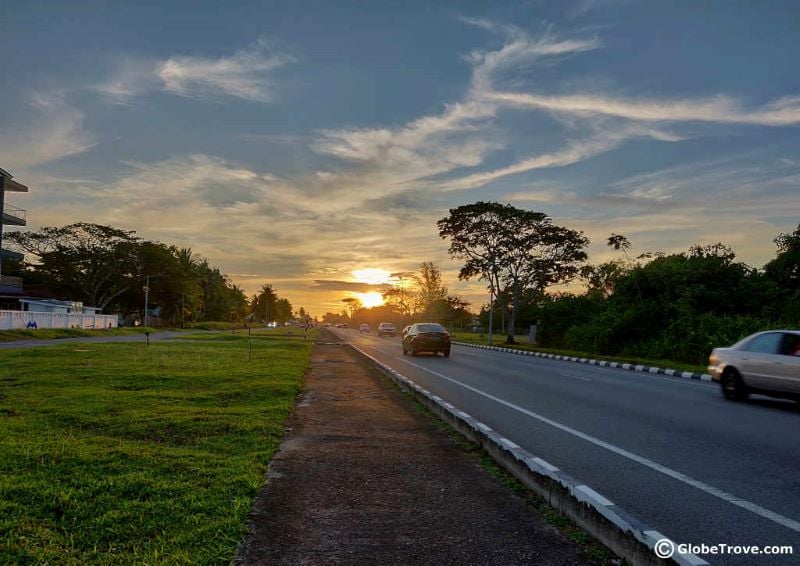
2. Traveling With An Open Mind
Many people think of travel as an experience and rightly so. Sometimes, however, you cannot choose the places you travel to.
This happened to me in 2019.
My husband found himself posted in Brunei for work.
Three months pregnant meant that I had a choice:
Either stay with him in Brunei for three months before returning back to India or remain in India, alone.
I chose the former. Not because of my love for the country but because I wanted to be close to him.
Brunei had never held any appeal to me. Whatever research that I pulled off the Internet showed me nothing other than one beautiful mosque.
The flights in and out of the country were expensive so traveling frequently out was not an option either.
I was engulfed by a sense of being trapped in a remote place.
Needless to say, I reached Brunei in a pretty foul mood. I think one of the things that struck me the most even in the midst of that bad mood was the large swaths of greenery that surrounded us.
Mind you, we were not staying in the big city but as far away on the outskirts as you could imagine. I’m not a city girl by any stretch and the greenery eventually soothed my nerves.
It took a week, but I soon found myself interacting with people around me. Fellow expats and locals all went out of their way to make me feel comfortable.
The more comfortable I felt, the more we explored. We trekked (yes, while pregnant!), we joined the board game community, and we enjoyed the local cuisine.
Three months later when it was time to leave, I found myself reluctant to say goodbye to the warmth of the country I had called home for a short while.
I think that my time in Brunei taught me a valuable lesson:
Don’t judge a place by what others say or a lack of information.
Sure, you may not always like what you see, but there will always be something that you will like. You just need to look hard enough to find it!
-Penny from GlobeTrove
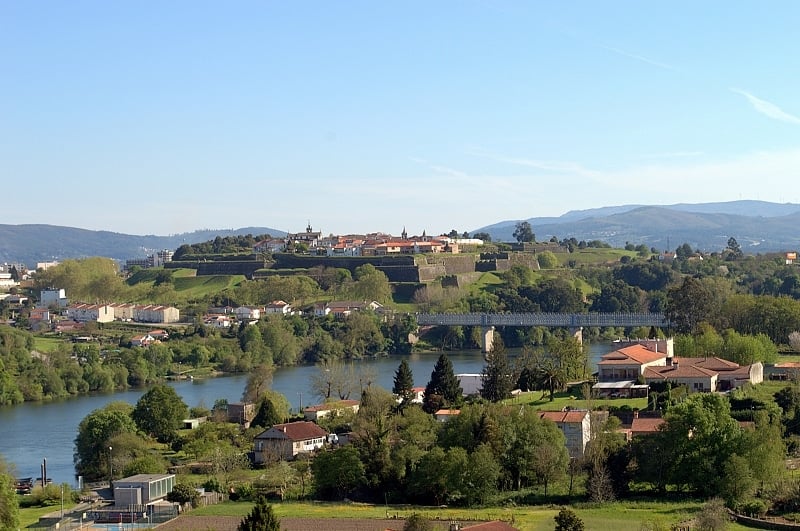
3. From Half-Day Hiker To Walking Holiday Enthusiast
I’ve always enjoyed walking but never in a million years did I imagine I’d end up walking over 200 kilometers (~124 miles) in 10 days, become a fan of walking holidays, and end up developing self-guided hiking routes in Portugal with a local tour operator as part of my business.
The shift from being someone who was content with an easy three-hour walk to an experienced multi-day hiker began with a brief taste of the Portuguese Camino de Santiago, an ancient pilgrim trail through Portugal to Santiago de Compostela Cathedral in Spain.
Back in 2013 I did a guided one-day hike along one of the most beautiful stretches of the Camino, north of Ponte de Lima. It’s also one of the most challenging sections so it was hard work, but the views from the top of Labruja Mountain made the climb worthwhile.
My guides were so enthusiastic about the thrill of arriving at Santiago de Compostela Cathedral after the challenges of day after day on the Camino that I began to think I might want to give it a go, despite not being religious.
Fast forward a few years and I set off from Barcelos with a friend of mine to follow the Portuguese Camino de Santiago.
Apart from suffering from chronic back pain, I thought I was quite fit but nothing had prepared me for how utterly exhausted I would feel at the end of each walking day.
This was truly a slow travel experience, as we were averaging about 20 kilometers (~12 miles) per day and by the time we reached our hotel, I would barely have enough energy to get cleaned up and find food before collapsing. I had envisioned plenty of sightseeing but that ended up being minimal.
Quickly, I realized the moral of this unique travel experience:
The Camino was all about making the most of the journey rather than the destination.
For me, that was quite a shift in thinking as I am usually all about getting to where I want to be as soon as possible so that I can start exploring. It was, perhaps, also my first step on the path towards mindfulness.
I will never forget the sense of achievement and progress at the end of each walking day, and the relief and pride I felt when we finally made it to Santiago de Compostela.
We met people who had walked the Camino several times and I can totally understand how it can become addictive.
-Julie from Julie Dawn Fox in Portugal

4. A Story About Traveling & Its Ripple Effect
Tucked away in far eastern Indonesia is a tiny archipelago of islands called the Banda Islands.
Apart from world-class snorkeling and some crumbling colonial buildings, the Banda Islands are mostly forgotten and would be described as a backwater by all accounts.
However, the Banda Islands are possibly the main reason that I am who I am today.
Well, the Bandas are the original Spice Islands.
Nutmeg used to grow on this tiny group of islands alone and nowhere else. The Dutch colonized Indonesia and promptly became the owners of islands where money grew on trees.
The only problem was that Indonesia was so far away that they needed a halfway stop to and from Indonesia.
That’s where my travel experience story comes in.
The same Dutch East India Company that traded in spice set up a halfway station at the foot of Table Mountain to break up their long journey. As a result, my Dutch ancestors arrived in the southernmost point in Africa , and generations later we are still there.
When I visited the Banda Islands, it dawned on me how something happening on the other side of the world can ripple out and affect people on the other side of the planet.
And I’m not the only one!
The spice trade was so important to the Dutch that they even traded a tiny island in the Banda archipelago for a much bigger island…Manhattan.
Yes. That Manhattan.
Before visiting the Banda Islands I never really knew about this part of my history.
Along with the spice that the ships carried back to Amsterdam, it also carried slaves. These slaves, more often than not, ended up in Cape Town.
Just like my European ancestors, they too became a part of Africa and added another shade to our beautiful Rainbow Nation.
It was in the Banda Islands that I realized how much of my culture, food, stories and even words in my mother tongue, Afrikaans, actually originated in Indonesia.
Because of these tiny islands, I am a true mix of Europe, Africa, and Asia. While I always thought I knew how all things in life are somehow connected, I didn’t really grasp it until my visit to Indonesia.
This could have been a resort travel experience story, as I went to Indonesia to swim and snorkel and relax on the world’s best beaches. And while I did get to do that, I also learned a lot about who I am as a person, my people, and my country…on another continent.
My visit to the Bandas has sparked a fascination with Indonesia, which I have visited seven times since. I’m already planning another trip to this spectacular country!
-De Wet from Museum of Wander
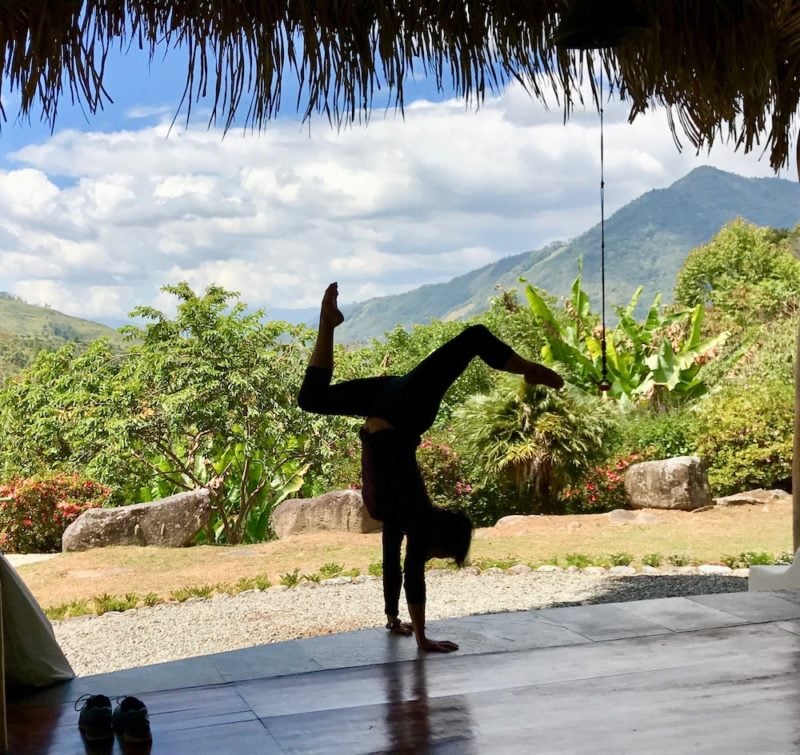
5. Awakening My Spirit In A Costa Rican Cloud Forest
In February 2017, I was just coming out of a decade of mysterious chronic illness that had shrunk my world.
And one of the things that finally helped me to resurface during the previous year was an online Qi Gong course I stumbled upon:
Flowing Zen .
To the casual observer, Qi Gong looks a lot like its better-known cousin, Tai Chi — the ancient art of moving meditation — but it’s actually energy medicine for healing.
In fact, it’s commonly used in Chinese hospitals.
My daily practice that year made such a difference for me that I dangled a reward for myself:
If I stuck with it all year, then I’d head to Sifu Anthony’s annual retreat in a cloud forest in Costa Rica the following February.
And I did! It was my first trip out of the country for more than a decade.
Just like that, I booked a solo trip — something I hadn’t done since I was an exchange student to Europe 30 years earlier — to San Jose where I met up with a dozen strangers and Sifu Anthony, our Qi Gong master.
We boarded a tiny bus and rode up, up, up around carsick-inducing curvy mountain roads into a magical cloud forest jungle where we finally arrived at The Blue Mountain (“La Montana Azul”) for a weeklong Qi Gong retreat.
There were no Internet or distractions here — just delicious organic vegetarian meals made with love and shared with the community under a gorgeous open-air palapa.
There were also colorful tropical birds singing in the jungle, as well as the largest arachnid I’ve ever seen in my gorgeous (but also roofless) room for a little extra adventure.
I’d felt a little energy movement during my year of online practice, but during that week on The Blue Mountain, my body began to really buzz with Qi — life force energy — as I Lifted the Sky, stood in Wuji Stance, and practiced Shooting Arrows.
I felt electrified and joyful.
And that was when everything changed for me.
At home, I had a successful career as a freelance writer, but I decided during my week in the cloud forest that I wanted more from life.
I wanted to explore the beauty, diversity, nature, and culture in every corner of the world.
And I wanted to share this intoxicating joyful feeling of life-giving freedom and adventure with anyone who wanted to come along for the ride.
Shortly after that, at age 53, I launched my travel blog.
Dreams really do come true. They are just waiting for you to claim them.
-Chris from Explore Now or Never
Enter your name + email below to subscribe and snag access to my FREE Ultimate Travel Planning Resource Library, full of trip planners, cheat sheets, packing lists, personality quizzes, travel guides, Google Map itineraries + more! // Privacy Policy .
6. From Rome With Love
This wasn’t the way I wanted to see Rome.
Sure, I was happy to spend Christmas in Rome and stand in awe of the city’s many iconic attractions. But, life wasn’t meant to turn out like this.
I was supposed to go to Rome with my mom back in 2012; however, life had different plans, because a week before our trip, I got a double kidney infection. A condition that required a week of hospitalization.
Although I was annoyed I had missed my trip, it wasn’t the end of the world since I was fine and everything seemed okay…until my mom developed a cough.
A cough that later became a heartbreaking diagnosis of stage four ovarian cancer.
My mom spent the final months of her life in chemo, desperately trying to fight a horrific disease so that she wouldn’t let her family down.
And she didn’t.
Instead, she showed us how to never give up on life, even if it was a losing battle.
So, when she eventually passed away, I booked a trip to Rome.
Sure, it wasn’t the trip I had hoped for. But, I knew that as her daughter, it was my job to live enough for the both of us.
And that’s exactly what I did.
Was I an anxious, sad, angry mess of a person?
Absolutely. I was still getting used to a world that my mother wasn’t a part of.
And honestly, you never get used to that world. You just deal with it because you don’t really have a choice.
But I also knew that I wanted my mom to live on through me and that I didn’t want to live a life where the haunting phrases “should of,” “could of,” and “would have” swirled through my head and ate away at my happiness.
So, I went. I packed a boatload of tissues, sobbed my heart out, and attended Christmas mass at the Vatican.
I also threw a coin in the Trevi Fountain, walked through the Colosseum, chowed down on gelato, and spent two weeks doing all the things my mom and I had wanted to do.
And that’s when it hit me. I had never gone to Rome alone because my mom had always been there with me. Maybe she wasn’t physically there, but I thought of her and felt her presence every minute of every day.
Her presence also reminded me that life isn’t about the things we buy or the money that we have.
It’s about making memories with the people we love; people that never really leave us since they are constantly influencing our lives in countless ways.
And after my trip to Rome, I finally knew that my mom would always be there because she had forever changed my life in the best possible way.
-Kelly from Girl with the Passport
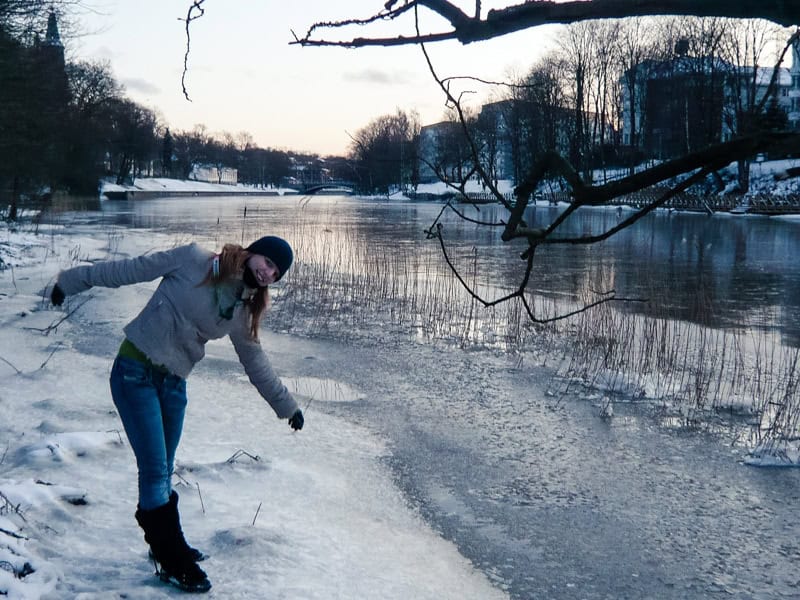
7. Studying In Finland
One of my major life-turning points happened during my exchange studies in Finland.
Until then, I was studying at a university in Prague, had a part-time job at a renowned management-consulting firm, and thought I was on the right path in life.
At the University of Economics where I studied it was notoriously difficult to get on an Erasmus exchange trip abroad since the demand was huge. Everyone wanted to go!
Regardless, I decided to sign up early for my last semester, just to see what the process was like to be better prepared for applying again in a year.
I did make it through all the three rounds and surprisingly got a spot at a University in Turku, Finland! I was ecstatic. The success brought its own challenges, but once you set your eyes on the goal, nothing can stop you.
And I had the time of my life in Finland.
I met the most amazing people, traveled a ton, partied a lot, and bonded with friends from all over the world.
Given I was one of the few people there who really needed to pass all her courses and additionally write her thesis, I managed to run on an impossible sleep schedule of four hours per night. But I made it!
My studies in Finland opened up my horizons, too.
The summer after, I wrapped up my life in Prague and went on to study in Germany and China . The whole time I traveled as much as possible, often going on solo adventures. It was only a matter of time when I’d start my own travel blog.
My Finland adventure led me to a life of freedom made up of remote work, travel blogging , and plenty of traveling. I couldn’t have asked for a better outcome. And it gave me one of my favorite true adventure stories that I can now share with others.
-Veronika from Travel Geekery
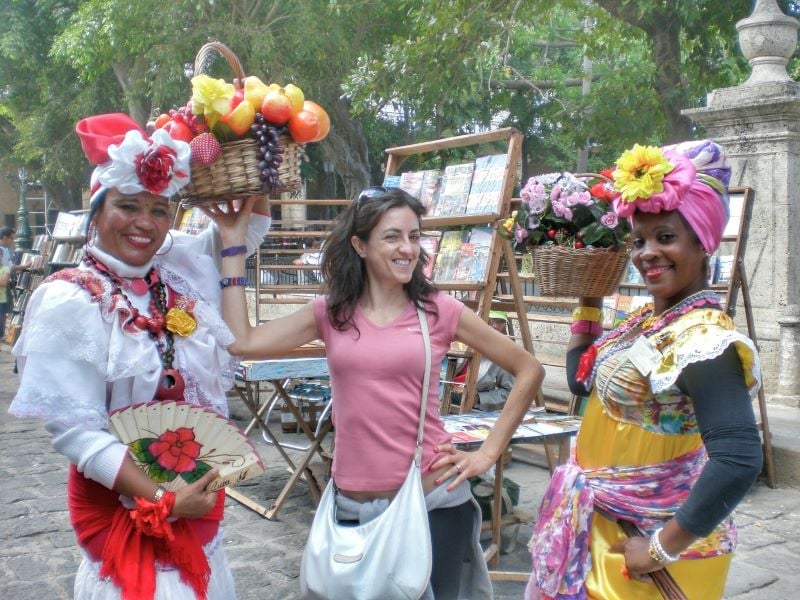
8. How Cuba Changed My Life
One of my favorite inspiring stories about travel takes place in Cuba.
I visited Cuba in February 2013 and it changed my life — and I like to think it did so for the better.
Interestingly, I expected a completely different country and was compelled to write about it when I got back home.
But let me tell you more.
I read copious amounts of blogs and travel diaries to prepare myself for the trip to Cuba so I thought I’d go in with a fairly good idea of what to expect. Each and every post I read spoke of marvelous landscapes, pristine beaches, crumbling but charming cities, and welcoming locals.
All of it was true, in my experience — except for the locals.
I didn’t find them so welcoming. At least, not genuinely so. They only seemed to welcome me as far as they could get something in exchange: money, clothes, pens, soap, you name it.
Each and every day in Cuba was a challenge to avoid the scams, to avoid being ripped off, to fight off each and every attempt of people trying to take advantage of me. I usually managed, but it was exhausting and it left a sour taste in my mouth.
Once I got back home I felt the urge to write about my experience — not for other sites or papers as I’d often do. This time I was afraid I’d be censored.
So I opened my own blog. With zero tech knowledge, zero understanding of online content creation and SEO, I started writing and telling people what they should really expect during a trip to Cuba.
I’d put up the occasional post, but continued with my usual job.
At the end of the year, my contract as a researcher in international human rights law at the local university ended, and I decided to stop pursuing that career for a while.
I packed my bags and left for a long-term trip to Central and South America . I started writing on the blog more consistently and learning, and eventually took my blog full-time , turning it into a career.
As of today, I have never looked back and have no regrets.
The one thing I’ll do, as soon as I can, is travel to Cuba to say thank you — because it changed my life in a way nothing else has ever done.
-Claudia from Strictly Sardinia

9. A Short Travel Story About Finding Inner Peace In Patagonia
Life in London is hard.
Life in London as a gay single brown refugee is harder.
Juggling between work, my passion for traveling, and the prejudices that I dealt with on a daily basis eventually took their toll on me and I reached a breaking point.
The fact that I couldn’t return home to see my family and being away for them for almost nine years was enough to hammer in the final nail in the coffin.
I almost had a nervous breakdown and in that moment of desperation, which I knew would define the rest of my life, I took a month off and headed to Patagonia.
It was probably the best decision I’ve ever made in my life. The 36 hours it took me to get to El Chalten from London were tiring but Patagonia blew me away.
On my first day there I did a 28-kilometer (17-mile) hike which included a steep mountain climb. It was incredible how moving through the forest helped me clear my mind. And as I stood in front of Laguna de Los Tres, the rain and clouds gave way to sunshine and a rainbow.
I felt at peace.
The countless hikes, great food, and the warmth of locals in Chile and Argentina helped me get back in my skin and find the peace I was missing in my heart.
Nature is indeed the best medicine when it comes to stress relief and I won’t be coy about hugging trees to speed up the process (it did).
Patagonia was life-changing for me.
The beauty of nature struck me at each point and every time I thought it wasn’t possible to beat the view, the next one did just that.
I came back a changed, resilient, and most importantly, a happy person.
-Ucman from BrownBoyTravels

10. Looking Inwards & Making Connections With Strangers
It was decades before I traveled solo for the first time in my life.
This trip — a six-day escape to Colorado — was the first trip that was not for business or family reasons but just to travel and discover.
As I prepared for it, I had a strange feeling of excitement and nerves at the same time. I had all sorts of thoughts and doubts:
Would it be fun?
Would I be bored?
Would I stay in bed all day or would I bounce with excitement to do the next thing?
I wasn’t sure. Little did I know that it was going to be a memorable journey of self-discovery.
As a good wife and mom, for me travel is always about the family; always thinking of who would enjoy what. It’s about family time and bonding. It’s about creating memories and travel stories together. It’s all so wonderful.
But on a solo trip who would I connect with? What would I say?
Well, I found that I got to do anything I wanted!
Usually when I travel with my family, if I feel like going on a drive that’s not on the itinerary or getting a snack no one else is interested in, we simply don’t do that.
So it was weird to just go do it. Really, that’s a thing?
As for making connections, it was so easy to meet locals while traveling and also to connect with other travelers. Honestly, I had conversations everywhere — on planes, while hiking, in restaurants, in the hotel lobby.
It was quite an eye-opening experience to meet a mom of 18 kids and hundreds of foster kids, a cookie baker, a professional photographer, a family of Fourteener hikers, and an internationally ranked marathon runner.
The inspiring stories I discovered were amazing and nothing like my wonderful safe life at home.
In terms of travel safety , I got to go rock climbing, solo hiking, driving up a Fourteener, eating alone.
And it was all fine. Actually, it felt surprisingly normal.
It was was just me, my SUV, and my backpack for a week. Most of all, it was a breath of fresh air that I didn’t know existed.
It’s wonderful to be back home and know that possibilities are endless and there is so much more out there to explore and be wowed by!
-Jyoti from Story At Every Corner
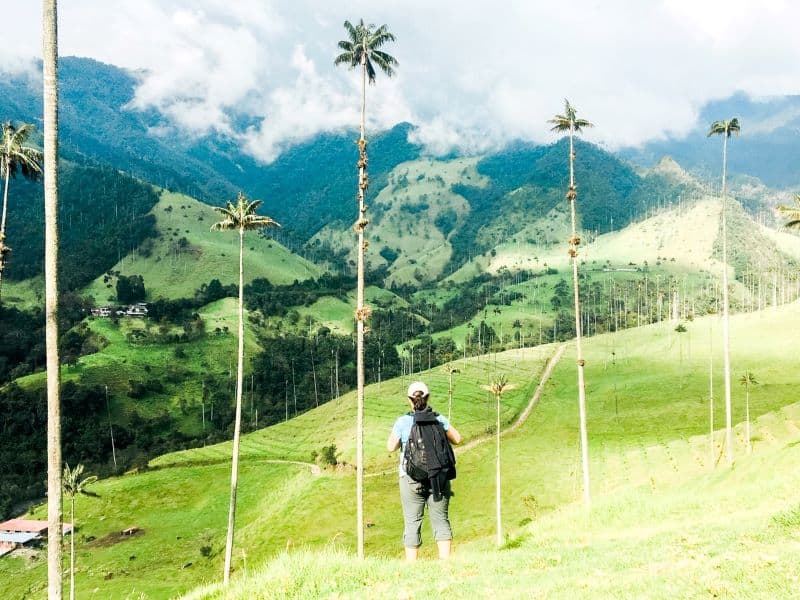
11. A Solo Hike To Find Connection
I have traveled solo many times, but I admit I was a bit uneasy booking my trip to Colombia . In part, due to the country’s dark past. But also because I desperately wanted to do the Cocora Valley hike, and if I’m honest, I was terrified.
This hike is located in the Coffee Triangle, an area recognized for its beauty as a UNESCO World Heritage Site. It features both rainforest and a stunning green valley speckled with cartoonishly-tall wax palms rising 200 feet or more.
It’s incredibly beautiful.
It’s also a long hike and quite challenging — it generally takes between six and eight hours and there is a steep area with over 3,000 feet of elevation within a quarter of a mile.
I wasn’t in hiking shape, so I was a little concerned. But, worst of all for me were the seven dodgy-looking suspension bridges.
I’m terrified of heights.
And, I’d be going alone.
I decided to go anyway and I met an incredible woman on the bus to Salento, the town near Cocora. She was also traveling solo and we agreed to hike together.
The town is a backpacker enclave and we met up with a small group of people all traveling solo. As the days passed, our group got larger and it was such a magical experience.
As much as I love city travel, this small town won my heart.
My new friend and I set off on the hike and met two other women who were nervous to do the hike. We all went together.
When we got to the first suspension bridge, I paused. I was embarrassed to admit my fear, but the bridge swayed widely and there was nowhere to hold onto.
When they realized how out of my comfort zone I was and how scared I felt, everything changed. Instead of me dealing with it alone, they were all there to encourage me.
One crossed the bridge to encourage me from the other side and they stayed off of it to limit the sway. Crazy enough, I not only crossed the seven suspension bridges, but I also crossed one an extra time when we went the wrong way on the trail.
I did it!
I was prepared to be blown away by Cocora Valley’s beauty, but what I wasn’t expecting was what a life-changing travel experience my time there would be.
-Sam from My Flying Leap
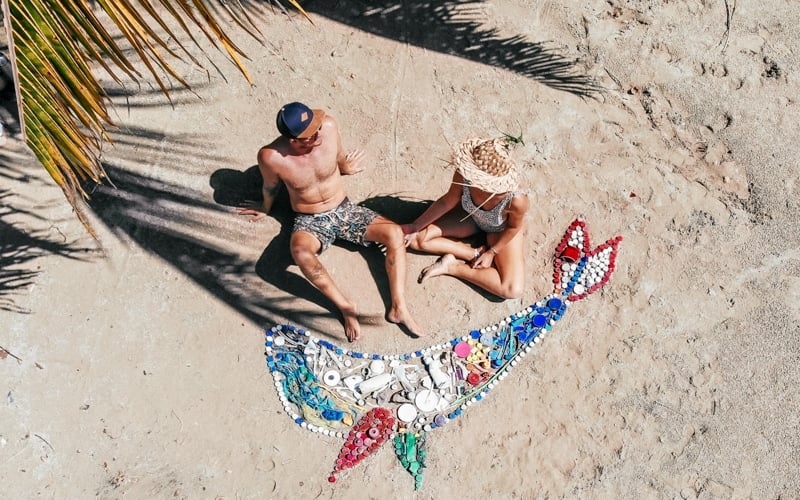
12. How A Pet Sitting Travel Experience Led To A Passionate Career
We wanted to go to the Caribbean but didn’t know much about the islands or how we were going to afford it.
By chance, a friend of ours in Australia mentioned “pet sitting” and that it is something you can do all over the world.
We quickly created an account on a pet sitting website and began searching for options. There were only a couple of sits available in that part of the world, but we tried our luck, sent a request, and to our surprise landed a three-month gig in a beautiful house in the US Virgin Islands — with an infinity pool overlooking the British Virgin Islands.
A month into our sit, we had explored the destination pretty well and so had a lot of time on our hands. We managed to secure another sit in Grenada, so our year was going to be taken up with Caribbean pet sits.
Inspired by a Canadian couple that had previously stayed at our Grenada housesit, we decided to start our own travel blog. We began by writing about The Virgin Islands, highlighting the beautiful beaches and funky bars.
But for every photo of a beautiful beach there were 10 photos of trash.
It was hard to ignore the plastic pollution issue, especially on such pristine and remote beaches. So, we began to share photos of the trash we saw and how much we could pick up on our daily dog walks.
The more we looked into plastic pollution, the more we realized the severity of the global plastic pandemic. From that point, we used our platform to create awareness and highlight ways to say no to plastic and travel plastic-free .
We changed our daily routines, our way of living, and even our diets to accommodate more organic foods and little to no plastic packaging.
It’s been over three years now and we continue to do what we can. This journey has led us to some amazing places, working with great conscious brands and even organizing a country-wide beach clean-up campaign in Grenada.
Our aim now is to keep on going.
We love connecting with like-minded people and love the shift over the last few years that brands have made towards creating more sustainable products and services.
It’s been an amazing few years that was sparked by a conversation about pet sitting. Who would have guessed?
-Aaron & Vivien from The Dharma Trails
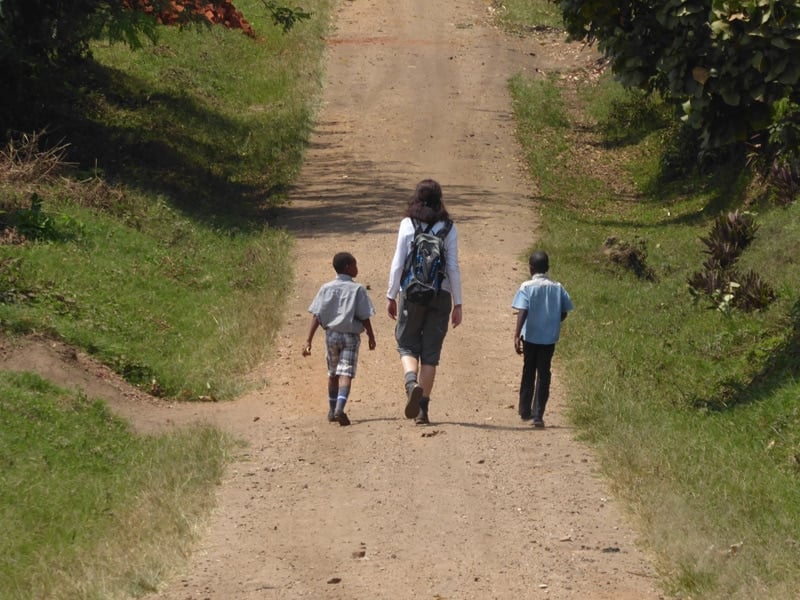
13. Learning To Slow Down The Hard Way
On Christmas of 2017, I was born again.
We like to spend our Christmas holidays somewhere warm abroad, and that year we chose Uganda.
Nature, wildlife, and sunny days were a blessing when it was so cold and dark in Europe. Life was beautiful, and we had a rental car and a busy schedule ahead to explore the country.
This is where this short travel story turns into one of my more scary travel experiences :
At Murchinson Falls National Park, we had a car accident.
I lost control of the car, and it rolled over, destroying windows, chassis, and engine.
But we were alive! My right arm was severely injured, but we managed to walk to our lodge, not far inside the park.
In the lodge, I was happy to learn that there was a pretty decent American hospital in Masindi that was just a one-hour drive from the lodge. Moreover, one of the lodge’s guests was a nurse who cleaned the wound while we were waiting for the taxi from/to Masindi.
The hospital took care of us, and after a couple of injections and stitches, I was ready to head to our new hotel in Masindi; however, my wound required daily dressing and more injections, so we were asked to stay in town for a few days.
Masindi is the kind of place where you may want to stop to buy some food or water, but that’s it.
The town’s highlights were the market and our daily visit to the hospital, so we ended up looking for the small things, chatting with the medical staff, the hotel staff, the people in the market, and learning more about their customs.
We learned to slow down the hard way.
When we were allowed to leave, we took a road trip south through the country to see something else. We did not care about our travel bucket list anymore — we were alive, and we wanted to enjoy Uganda’s unique nature and its people.
In the end, our Uganda trip was not about the places that we saw, but the people that we met. It was travel for experience vs sightseeing.
I hope to revisit Uganda one day, with a stop at Masindi for some food, water, and maybe something else.
-Elisa from World in Paris
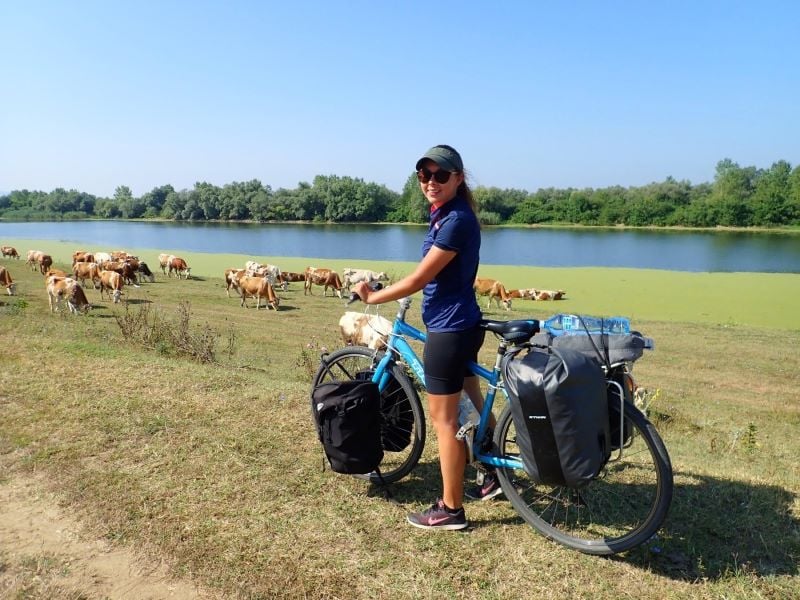
14. A Cycling Trip To Remember
During the summer of 2019, I cycled solo from London to Istanbul. This huge bicycle tour took me 89 days and through 11 countries.
As you might expect, it was a challenging yet incredible journey, which saw me pedal along some of Europe’s greatest rivers, pass through some of its best cities, and witness some of its most beautiful scenery.
It’s becoming more and more important for us to think about the impact that travel can have on our environment. This was the inspiration for my bicycle tour; I wanted to find more responsible ways to explore the world and avoid flights where possible.
I discovered that bicycle touring is one of the most eco-friendly ways to travel, as using nothing but a bicycle and your own pedal power you can carry everything you need while covering surprising distances each day.
The simplicity of life and the sheer amount of time I spent cycling alone gave me a lot of time to just think . This really helped me to come to terms with some personal problems rooted in my past and, as a result, I arrived solo in Istanbul with newly found confidence, independence, and liberation.
Cycling across the entire European continent may seem like an impossibly daunting task, but I assure you, it will make you feel like a new person, just like it did for me.
-Lauren from The Planet Edit
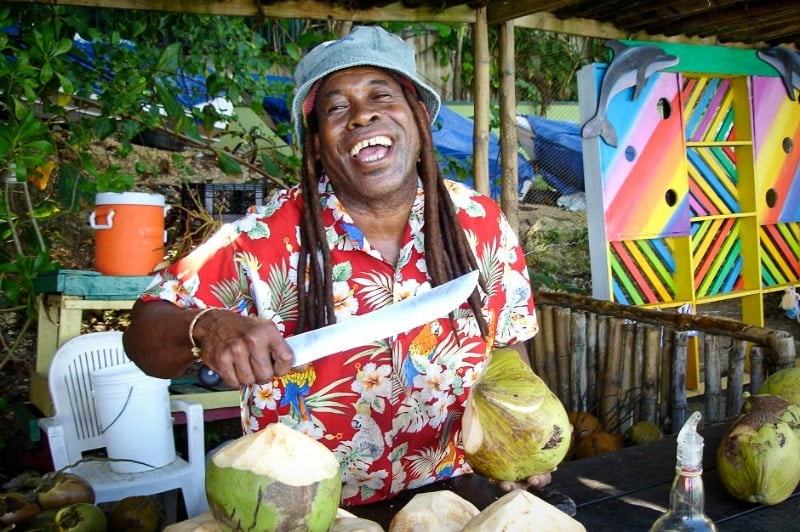
15. How The Caribbean Shaped Me Into A Fully Sustainable Traveler
One of my first international trips as an adult was traveling around the Caribbean .
I checked into my hotel in Jamaica and asked for a recommendation for a local place to eat. The receptionist told me that under no circumstances should I should go into the town because it was really dangerous, but that — to my luck — the hotel’s restaurant offered wonderful Caribbean food.
I pondered my options:
Did I really want to spend all my time on the beach without getting to know a single local?
I was a very inexperienced traveler and very young, but there was only one answer to my question:
Absolutely not. I was not going to be visiting a new place and staying hostage in a hotel chain. So out I went.
The poverty hit me in the face. After only seeing fancy resorts, the reality was hard to swallow.
A few locals approached me and were super curious as to what I was doing there alone, since most tourists didn’t go there.
I told them I was interested in meeting them and experiencing their culture. And just like that, I was embraced.
We met more people, had some food, and then we danced the night away. They had so little, yet they wanted to share it with me. They wanted to make me feel welcome.
And they undeniably did.
The next morning all I could think about was how all the money most tourists spend goes to big corporations. The locals have to be thankful if they get a job that pays minimum wage, while foreign businesses earn millions.
I have always been environmentally conscious, but this trip made it clear that sustainability goes well beyond nature and wildlife.
It’s also about communities.
From then on I always look for locally owned accommodation, eateries, guides, and souvenirs.
Sustainability, with everything it entails, became a motto for me and changed the very essence of the way I travel.
-Coni from Experiencing the Globe
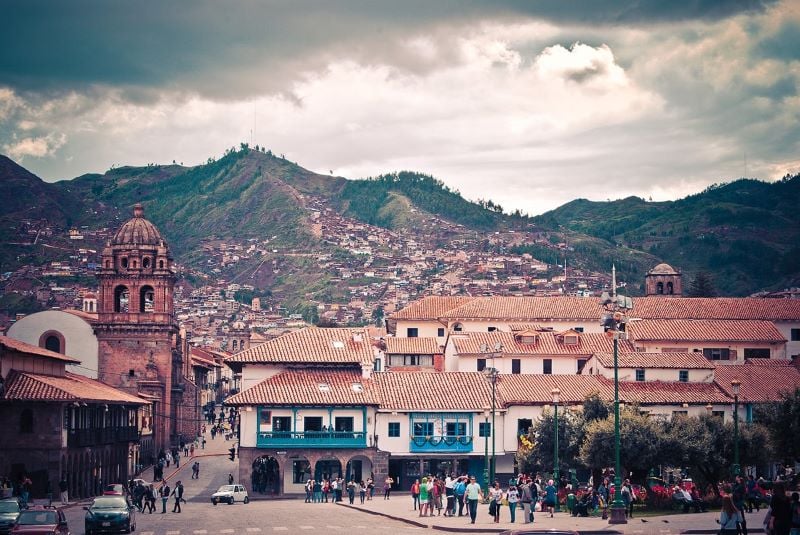
16. Lessons From My Students In Peru
One of the most life-changing trips I’ve ever been on was a volunteering experience in the stunning city of Cuzco in Peru.
I spent a month there teaching English and Italian to a group of local adults. And even though my time there was short, the travel experience was so humbling that it changed my outlook on life.
My lessons took the form of active conversations, which essentially turned into a massive multilingual cultural exchange between me and my students. Hearing my students talk about their lives — and realizing just how different they were from mine — made me look at my own life with a fresh new perspective.
One person spoke about the three years he spent living in a jungle with his dad, where they fed off of animals they hunted in order to survive.
Another student told me about her ultimate dream of mastering English so that she could become a tour guide and have a more stable future.
For me, these stories were a reminder of just how small I am in this world and how much we can get consumed by the small bubbles we live in.
Most of all, my students showed a passion and appreciation for life that I’d never witnessed before.
This is true for the locals I met in Cuzco in general. The quality of life in Cuzco is very modest; hot water is scarce and you learn to live with little.
But the locals there do way more than just that — they spontaneously parade the streets with trumpets and drums just because they’re feeling happy, and their energy for the simple things in life is incredibly contagious.
It was impossible to not feel inspired in Cuzco because my students always had the biggest smiles on their faces, and the locals showed me again and again that simply being alive is a blessing.
I went to Peru to teach, but ended up learning more from my students and the locals there than they did from me.
Ever since I got back from that trip, I made it a goal to slow down and not take the simple things in life for granted.
Every time I get upset about something, I think about the Peruvians in Cuzco parading their streets in song and pure joy, and I tell myself to stop complaining.
-Jiayi from The Diary of a Nomad
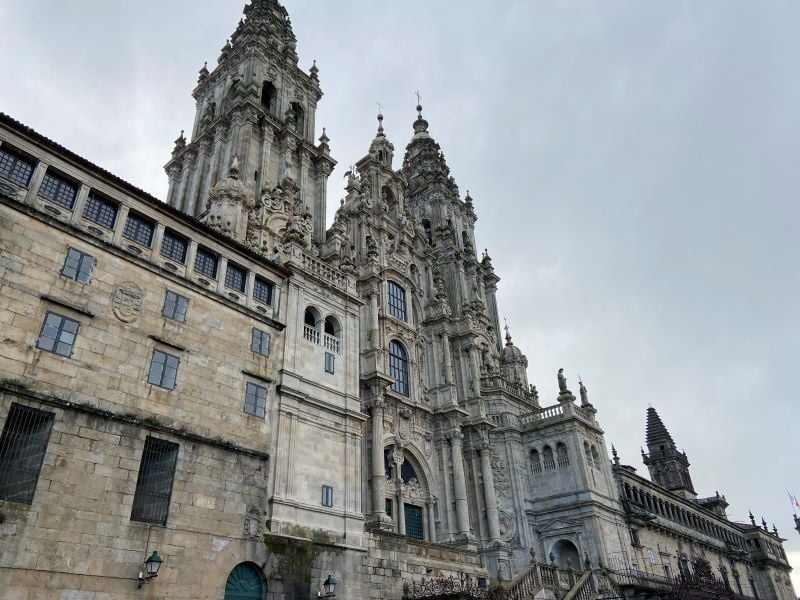
17. Braving Travel With Chronic Pain
Santiago de Compostela is a beautiful city with a prominent cathedral positioned centrally within the city.
While the historical cathedral attracts numerous visitors, even more well-known is the route to Santiago de Compostela, Camino de Santiago –- the world-famous pilgrimage route that has a plethora of trailheads and ends in Santiago.
Home to locals, students, English teachers, and those on a spiritual pilgrimage, personal conquest, or a great outdoor hiking excursion, Santiago is a magical city.
My introduction to Santiago de Compostela doesn’t begin on the pilgrimage route, yet ends with a spiritual awakening analogous with those other unique pilgrimage stories.
It was my first solo trip abroad teaching English in Spain, a country that’s always been on my travel bucket list. A small town outside of Santiago was selected as the school I’d be teaching at for the year.
Unknowingly, this teach abroad program chose the perfect city for me to live in.
A year prior, I suffered a traumatic brain injury that left me unable to function normally and complete average tasks. Migraines, headaches, and dizziness became my body’s normal temperament, a hidden disability invisible to the naked eye.
Braving travel with chronic pain was the first lesson I learned during the trip.
The vast green outdoors and fresh dew from the morning rain enlivened me daily and reminded me about the importance of slowing down so I could enjoy traveling with my hidden disability.
I also learned to stop often for daily tea breaks and to embrace the long lunch hour, siestas , with good food, company, and a nap to rest.
Meeting locals , indulging in local food, and learning Spanish allowed me to connect deeply with the beautiful culture of Santiago. After all, my dream was to travel to Spain, and I more than accomplished that dream.
Difficult or not, I learned to own my dream and I was more than surprised with the results.
Who knew that a year after my injury I’d be traveling the world with chronic pain, and for that, I’m eternally grateful.
-Ciara from Wellness Travel Diaries
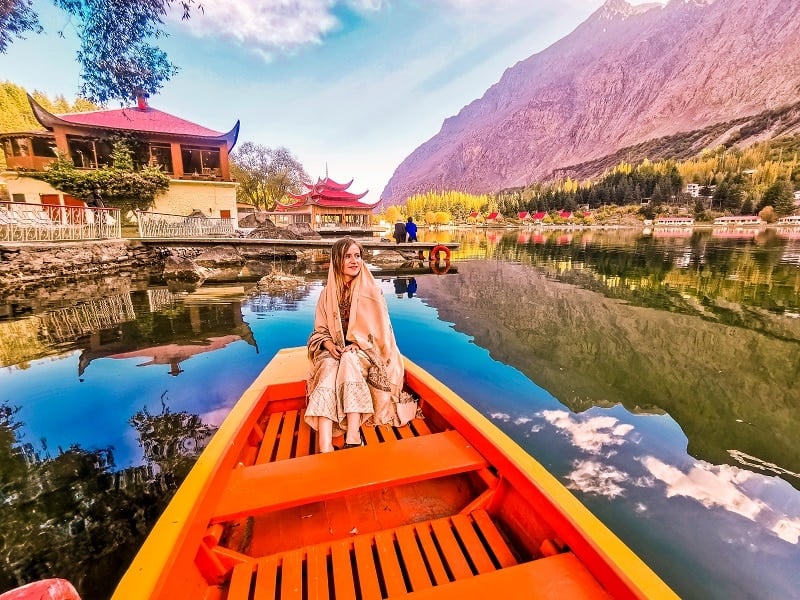
18. A Blessing In Disguise
2020 has been a wild year for all of us and foreign students in China are no exception. As soon as the malevolent virus began to make its rounds in China, our university sent us home for “two weeks.”
However, within a short time, countries began to shut their borders and these “two weeks” turned into months, a full year even.
Crushed by the burden of online lectures and virtual labs, my boyfriend and I packed our bags and caught one of the first flights to his home country of Pakistan.
I had always been an over-ambitious traveler. I believed numbers were everything — the number of countries I visited, the number of hours I spent on a plane, the number of international trips I took in a year. These numbers were what defined me.
My feet were constantly itching and I never liked to spend more than a few days in a place before heading to the next country. Revisiting a place felt superfluous to me.
That’s why I was hoping to spend a month or two in Pakistan and then continue to check new countries off the list — after all, my online classes finally granted me the freedom to “work on my numbers.”
But as is usually the case in 2020, things turned out quite different from what I had expected. Borders remained closed and worldwide infections stayed rampant. At this point, I have already spent nearly half a year in Pakistan.
During this peculiar time, however, an amazing thing happened:
My mindset about travel started to change and I began to look at my long stay in Pakistan as perhaps my most valuable travel experience ever.
I may not have visited dozens of countries like in previous years but my experiences were deeper than ever before.
From trekking to one of the world’s tallest mountains to sharing tea with heavily armed officers at nearly 5,000 meters altitude to exploring hidden beaches in the most secluded regions to spontaneously being invited to village homes, my adventures in Pakistan couldn’t have been more incredible. They opened my eyes to the sheer diversity of many countries and completely transformed my idea about traveling.
It took me nearly a full year of heavy restrictions on international travel and a few months in one of the world’s most fascinating countries to give up on my superficial ideals and become a more mature traveler.
This time will always have a special place in my heart.
-Arabela from The Spicy Travel Girl
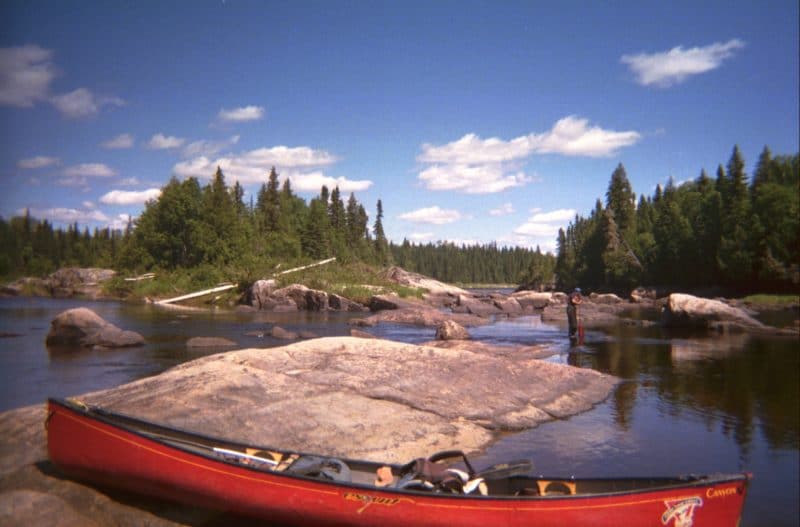
19. What The River Taught Me
My travel story takes place in the summer of 2017 — the final summer before I graduated university — as it continues to play a significant role in the person I’ve become.
When I say that, people ask me if it was the portion of the summer I spent solo backpacking in Europe . And to their surprise, it wasn’t. It was actually the latter portion of the summer where I stayed closer to home.
For July and August I worked as a canoe guide leading whitewater canoe trips on remote rivers in Canada. It was here that I got to canoe the powerful and iconic Missinaibi River, a river that continues to influence me all these years later.
The Missinaibi River flows from the powerful Lake Superior to the even more powerful salty waters of James Bay. Here, I led a group of eight teenagers through dozens of whitewater rapids over 500 kilometers (~311 miles).
With no cell service for 25 days, we were forced to disconnect from anything other than the river.
During this trip I learned two important lessons:
First, I learned to be confident in my own abilities as a leader and problem solver.
There were a few rapids where my campers’ boats flipped and I had to rescue the campers and the canoes. One rescue saw two boats flip on a mile-long rapid. It took six hours to make it down the rapid, and during this time I managed stuck canoes and crying campers.
And while this was one of the most difficult rescues I’ve done, I was amazed at how calm I was throughout it. I gave clear directions, prioritized effectively, and kept my campers safe throughout the entire experience. Following the rescue, I had a newfound sense of confidence in my abilities.
The second lesson I learned on the Missinaibi was the power of disconnecting from society and connecting with the people around you.
A wild river commands all of your attention. Each day, you and your group must take down camp, load canoes, paddle up to eight hours while navigating both rapids and portages, get to a new campsite, set up camp, cook dinner, and go to bed.
And without the distraction of technology, your attention has nowhere else to be. You focus on the river and your teammates.
As someone who had wrestled with anxiety and depression prior to this summer, I felt at total ease on the trip. Now I seek societal disconnection and human connection as much as I can.
Sometimes the most profound, life-altering trips are the least expected trips closer to home.
-Mikaela of Voyageur Tripper
More Short Travel Experience Stories
25 Crazy Travel Stories You Need To Read To Believe
23 Inspiring Travel Stories Sharing The Kindness Of Strangers
17 True Short Adventure Travel Stories To Inspire Your Next Trip
38 Inspiring Travel Love Stories From The Road
16 Short Funny Travel Stories That Will Make You Laugh
20 Embarrassing Travel Stories That Will Make You Laugh & Blush
21 Travel Horror Stories About Scary Travel Experiences
Do you have any inspiring travel experience stories about life-changing trips to share?
Enjoyed these inspiring stories about travel? Pin them for later!
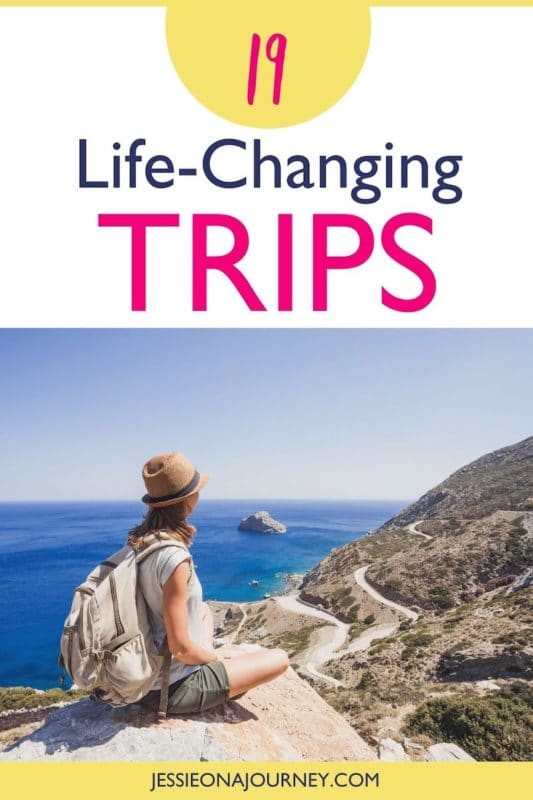
Related posts:
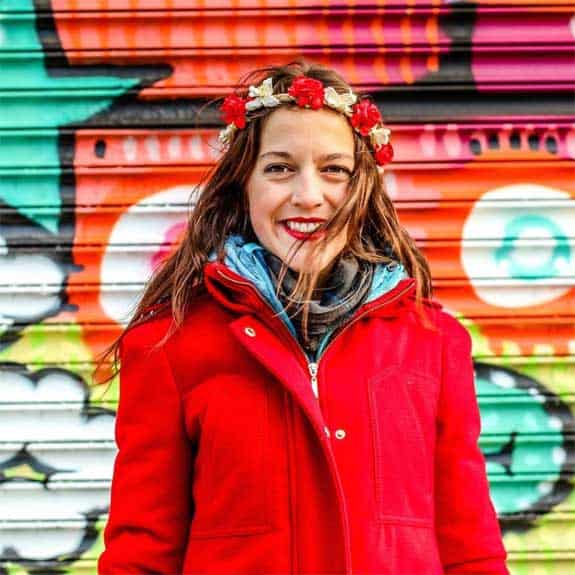
Hi, I’m Jessie on a journey!
I'm a conscious solo traveler on a mission to take you beyond the guidebook to inspire you to live your best life through travel. Come join me!
Want to live your best life through travel?
Subscribe for FREE access to my library of fun blogging worksheets and learn how to get paid to travel more!

Turn Your Travel Blog Into A Profitable Business
Subscribe to my email list to snag instant access to my library of workbooks, checklists, tutorials and other resources to help you earn more money -- and have more fun -- blogging. Oh, and it's totally FREE! :) // Privacy Policy .
Check your inbox for your welcome email + resource library password!
These stories are so much fun to read! Thanks so much for putting a post like this together. It’s great to be able to check out other people’s blogs and read about other people’s experiences!
Always great to read about travel experiences of others. Some great stories to read over coffee. I’ve Pinned your post for future reference and to share with others. Will check out each story author’s blog as well. Great Job! 🙂
Amazing story for new traveler like me thanks for your contribution
Leave a Comment Cancel Reply
- Hispanoamérica
- Work at ArchDaily
- Terms of Use
- Privacy Policy
- Cookie Policy
Why Do We Travel?

- Written by Nicolás Valencia
- Published on September 13, 2019
Everyone wants to travel the world, whether it's to meet new people, taste new food, or visit new places. Travel is consequently an extremely lucrative industry, but tourist destinations are getting more crowded than ever and associated pollution emissions are only worsening the climate emergency .
Why do we travel? In this edition of Editor's Talk , four editors from ArchDaily based in Lebanon, the United States, and Chile share their thoughts on the meaning of travel, and why tourists enjoying a beach in a location like Brazil should also care about the cities they visit.
Nicolas Valencia: Travel was June's Monthly Topic . Back then we published articles about architecture guides and travel-related typologies, but we didn't talk about the experience of traveling. What does travel mean to you?
Dima Stouhi : I was born and raised in Lebanon, but I'm moving to Switzerland next month. This will be the first time that I experience living abroad. Because Lebanon is so different from any other country, traveling is incredibly important for me to see how other people live and what other cultures are like.
Eric Baldwin: I often introduce myself by saying that I’m a farm kid from rural Iowa. My idea of the world, including different cultures and ways of working, was limited for much of my youth. In college, that worldview expanded greatly. I was able to study and travel around the world, in places like China, Italy, and Greece. I believe that context is everything; travel is one way to expand your context.
Christele Harrouk : I was born in Beirut too, coming from French roots, so It was always easier for me to travel, and it was always an option for me to live abroad. Nevertheless, I never opted for this choice: I did spend a couple of months here and there, but to me, the notion of home was more important. Traveling has opened my eyes to what this world holds, and it has also made me better appreciate what I had and took for granted.
Nicolas Valencia: But it's still a luxury nowadays.
Eric Baldwin: Travel has been priceless to me, but it’s also become terribly destructive to our environment. In many ways, it is a luxury. As Greta Thunberg showed when sailing across the Atlantic on a zero-emissions yacht, we have to come up with better ways to travel. Our current conditions are becoming more and more unsustainable.
Dima Stouhi: Traveling is definitely a luxury now. Especially for people who need visas to travel, like me.
If you travel, you are a loser

Nicolas Valencia: In June we published an article titled The Age of Travel is Over . The author says that "if you travel to earn your living, you are a loser. If you travel to see places, or to learn, you are an enemy of the planet."
Eric Baldwin: I think it was meant to be a sort of provocation. Travel is still so important, but that doesn't mean there aren't better ways to travel. Or that we shouldn't continue to imagine new modes of connection that bring us together and expand our context without harming the environment.
Christele Harrouk: Traveling is a pure form of learning, possibly the most genuine way of getting information, but I always go back to the idea that if you don't do anything with these experiences, they become useless and the whole process becomes futile in a way. The more I meet people, the more I discover that a lot of them, who pretend to roam the globe, are so closed into themselves.
Dima Stouhi: The idea of traveling is different now. People want to travel to show everyone that they traveled or just for the sake of traveling. There isn't much thought to what they harm along the way.
Nicolas Valencia: Dima has a point. Traveling has become a sort of meta-traveling: visit a place to say you visited a place. I'm very critical of those who don't learn anything from traveling, but then, I think, "Why should they experience it the same way I do?"
Dima Stouhi: That's the thing, it's a matter of perspective. I doubt that people "never learn" from traveling. Regardless of how different each individual is, at least one experience, building, or even meal is going to get stuck in their head. It's just a matter of what people are paying attention to while traveling.
Eric Baldwin: We travel to work, to discover, to connect with family or friends, to get the perfect Instagram post, to escape. As long as we continue to question why, and whether we are doing so responsibly, I think travel will continue to have meaning. Beyond location, I think being a "good" vs. a "bad" tourist is part responsibility and part perspective. If you travel to escape your daily life and enjoy a beach in Brazil, but you don’t care to learn about the city, people, or culture you visit, is that inherently bad? Again, it’s a matter of context.
Cities for rich tourists

Nicolas Valencia: Bloomberg published a chart on Instagram a few days ago explaining that "tourist destinations are only going to get more crowded," especially in Europe. We recently saw Venice ban large cruises from its historical center . How do we think other cities are going to deal with tourism?
Dima Stouhi: I support Venice's decision. I went to Vatican City last year in August. I remember at one point I just wanted to leave because of how crowded it was. We couldn't even stop for one second to look around us. There was no place to stand in the Sistine Chapel. It's sad.
Eric Baldwin: It’s a tricky thing. It’s tied to preservation: when does saving something relegate it to becoming frozen, functionless scenery? Again, I go back to context. What does tourism give to a city, and what does it take away? Does heritage have a part to play? No city remains the same, and in turn, tourism and travel have to change too.
Dima Stouhi: But Eric, the way we see it, preservation comes first because we know and appreciate the value of historical sites. The majority of people don't.
Eric Baldwin: I question the value of historical sites. How do we measure relevance or heritage? Why are the pyramids worth preserving? It’s a question — and battle — of values and those things that define us. In turn, it’s directly related to why we travel.
Nicolas Valencia: Countries such as Spain rely strongly on tourism — the industry accounts for around 13% of its GDP. It's hard to regulate if your city's economy relies so strongly on tourism. Anyway, I'd assume that restricting access to tourists will eventually punish middle-class tourists.
Christele Harrouk: Well, I'm not sure about this. Maybe not restrict accesses but make them more organized.
Dima Stouhi: I don't believe that increasing prices and limiting access to rich tourists is the way to solve it. I think it's like what Christele said: it's how governments organize it that might make a difference.
Christele Harrouk: This is the responsibility of the cities: they have to advertise different areas. It's not difficult, but they just don't take the initiative. Changes in marketing strategies can indirectly reduce the concentration of tourists in one place and divide it into many regions, making new areas grow and develop as well.
Nicolas Valencia: If I'm going to Venice, I'm going to visit downtown, not a peripheral neighborhood.
Christele Harrouk: But if there is a Zaha Hadid building in the periphery, you will go there, and spend less time downtown.
I Love City Branding

Nicolas Valencia: We have been talking about Europe, but what about Latin America? Africa? Asia? Have you visited these regions?
Dima Stouhi: Dream destinations, big budgets!
Nicolas Valencia: In Latin America, we are more interested in visiting Europe and the US, rather than our own region. This is despite the fact that airfare has plummeted in this region, so it's cheaper than ever to travel across Latin America.
Christele Harrouk: This may be global, but don't you think this is where city branding comes in hand?
Nicolas Valencia: Sure, city branding defines what we think about them. But one thing that freaks me out about traveling is that after spending a week abroad, people think they gain a certain power to explain what a whole country is like. We each have different backgrounds of emotions, ideas, and expectations, so a gay man visiting a city after breaking up might have a totally different experience from a heterosexual woman who meets a guy in that same city. Each person's visions of the same city are completely unique, which means these narratives can't be universal..
Dima Stouhi: I think these assumptions are a normal human reaction. Whatever is different from what they usually see, they pin-point it as if it were a flaw..
Eric Baldwin: I think that's a very hard thing to change. You inherently have more perspective than someone who has never been there, but at the same time, you have an inherently limited understanding as well. I think the after-visit stereotypes will continue to happen, as Identity is always tied to travel and context. How that context is shaped happens in a myriad of ways, and defines who we are.
Image gallery

- Sustainability
想阅读文章的中文版本吗?

编辑论坛:旅行,是对城市片面的定义
You've started following your first account, did you know.
You'll now receive updates based on what you follow! Personalize your stream and start following your favorite authors, offices and users.

- Travel Blankets
- Toiletry Bags
- Duffel Bags
- Travel Accessories
Cookie policy
I agree to the processing of my data in accordance with the conditions set out in the policy of Privacy.
Your cart is empty
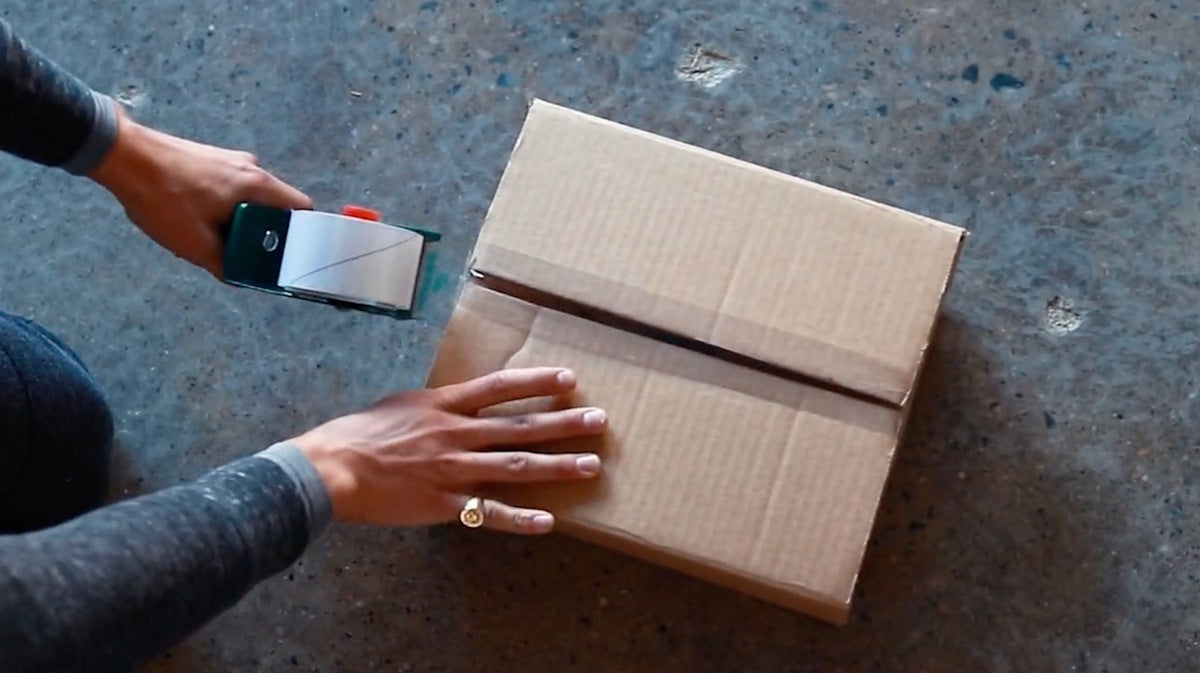
Gravel Travel Shipping Insurance
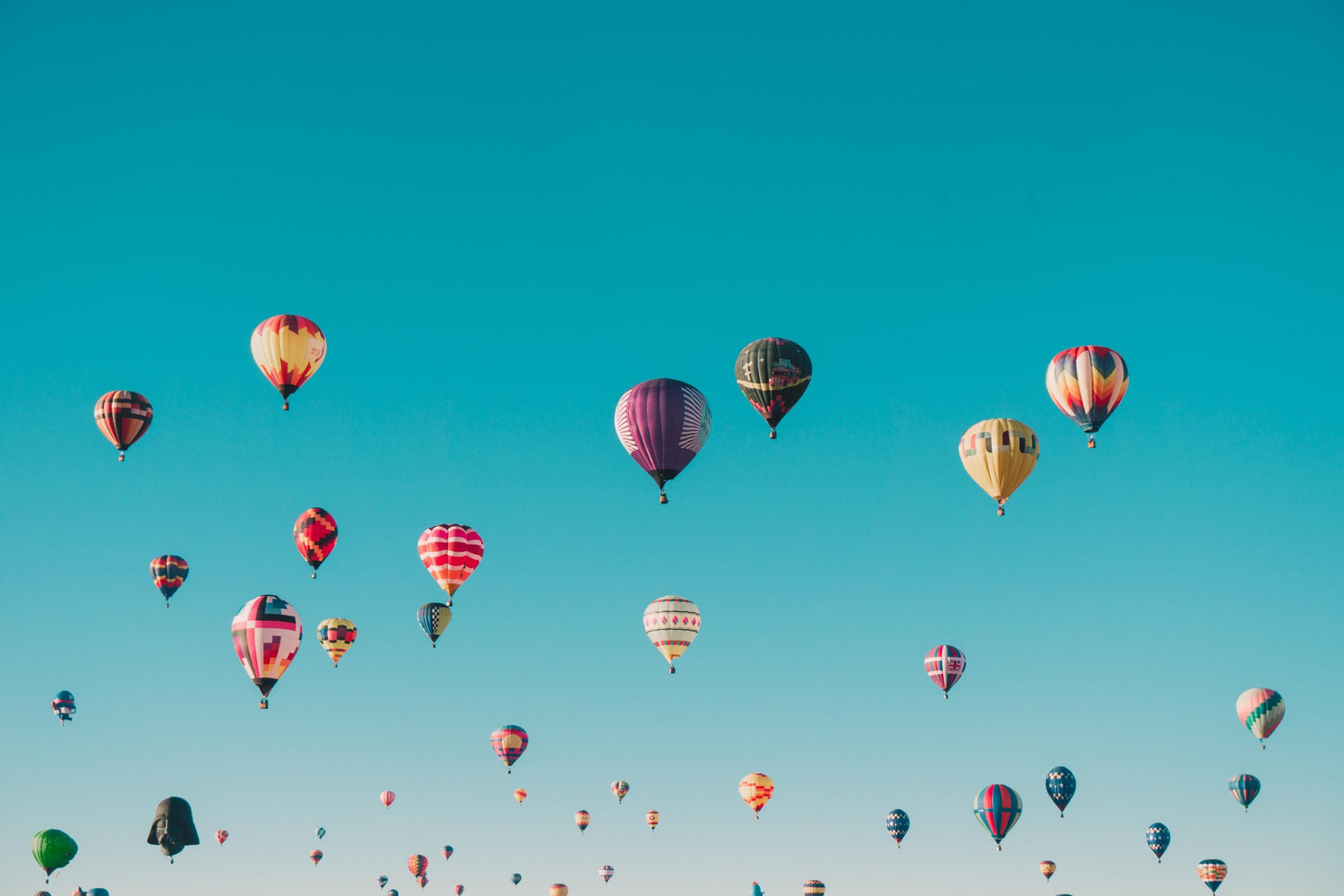
What Is Curated Travel and How Does it Work?
- Gravel Travel
- Travel Tips
Curated travel is a more refined and personalized way of planning not just any ole trip, but an experience that you won't soon forget.
Travel curators are the brains behind the operation. They partner with a select group of hotels, restaurants, and special attractions that offer something unique, like hitching a hot air balloon ride over the temples of Myanmar.
What does this mean for the traveler? Instead of a one-size-fits-all approach, they can now have a tailor-made trip with all the bells and whistles, without having to do all the research themselves.
What Makes Curated Travel Different?
Curated trips usually stick with a theme. This could be anything from culinary to adventure or even history and culture. They also tend to work with smaller groups of travelers.
Rather than crossing off bucket-list destinations simply by showing up and moving on, a curated trip offers a more immersive experience and handles all of the logistics for you. That might mean skipping the long lines at tourist traps and getting VIP access to exclusive events and experiences.
For example, you might tag along on a Mongolian eagle hunt or catch a festival in the Gobi Desert, but you might also have a more low-key experience like retracing Jane Austen's footsteps in England. It all depends on what the curator has put together for you based on your interests.
But perhaps best of all is the level of service and support that comes with curated travel. A good curator will be with you every step of the way, from planning to booking to post-trip follow-up.
What Are Some Real-World Examples of Curated Trips?
There are a variety of ways to experience curated travel. Here are a few examples:
- A wine-tasting tour of the Napa Valley arranged by a sommelier
- A photography workshop in Iceland with a professional photographer
- A tour of New Zealand for "Lord of the Rings" enthusiasts
- A culinary tour of Italy, with visits to local artisanal cheese shops and olive oil mills
- A ski trip in the Swiss Alps, with a personal guide to help you find the best slopes and trails
To plan the perfect curated trip, it's important to know what kind of experience you're looking for and to work with a qualified travel curator who understands your specific needs and interests.

How To Find a Curated Travel Provider
Curators like Explorer X and Superfly specialize in "transformative travel," which is any travel experience that allows individuals to improve their lives in some manner.
You could also find other curated travel providers by doing a quick search online. Start by typing in "curated travel experiences for" followed by the type of adventure or experience you're interested in.
For example, if you're looking for a cultural experience, you might type in "curated travel experiences for history buffs." Another would be "curated travel experiences for foodies."
These search queries should yield a list of unique travel experiences that may be curated to some degree. Once you've found a provider you like, be sure to read reviews from previous customers to get an idea of what to expect.
Travel Gear for the Curated Trip
A travel backpack system may be all the gear you need to explore the "Avatar" mountains in China or the ancient temples of Angkor Wat in Cambodia.
Our bundle includes a 42L travel backpack , an 11L everyday carry, and a sling belt that links the two together. The sling belt can also be used as a crossbody bag or waist pack, giving you plenty of options for how to carry your gear.
The best part is that it's all convertible, so you can use the backpack as a carry-on and the smaller daypack as a personal item on the plane.
Don't forget to pack clothes for a variety of climates and activities. Curated travel often entails going off the beaten path. Ask your travel curator if they offer a packing list for your specific trip or check out our packing list for some ideas.
Finally, make sure to pack your sense of adventure and enthusiasm for a new, transformative experience! After all, the world is your oyster when it comes to curated travel. Why not make the most of it?
Know any curated trips that we left out? We'd love to hear where you've been. Let us know in the comments below!
Continue reading

This Packable Travel Laundry Bag Will Keep Your Clean and Dirty Clothes Separate
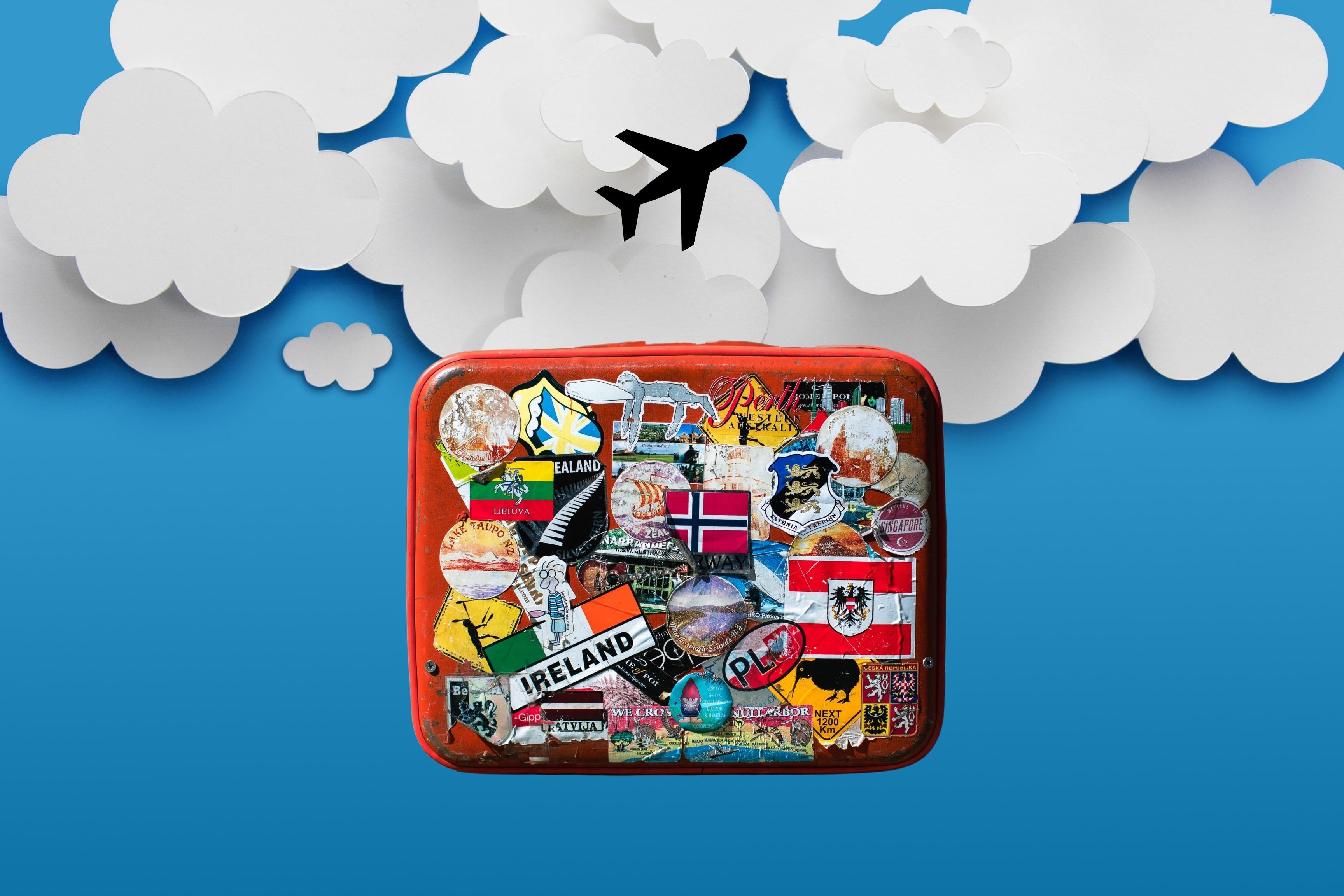
What Is a Personal Item and How Is it Different From a Carry-on Bag?
Leave a comment
All comments are moderated before being published.
This site is protected by reCAPTCHA and the Google Privacy Policy and Terms of Service apply.
Privacy Policy |
Luxury Private Tours | Bespoke Experiences
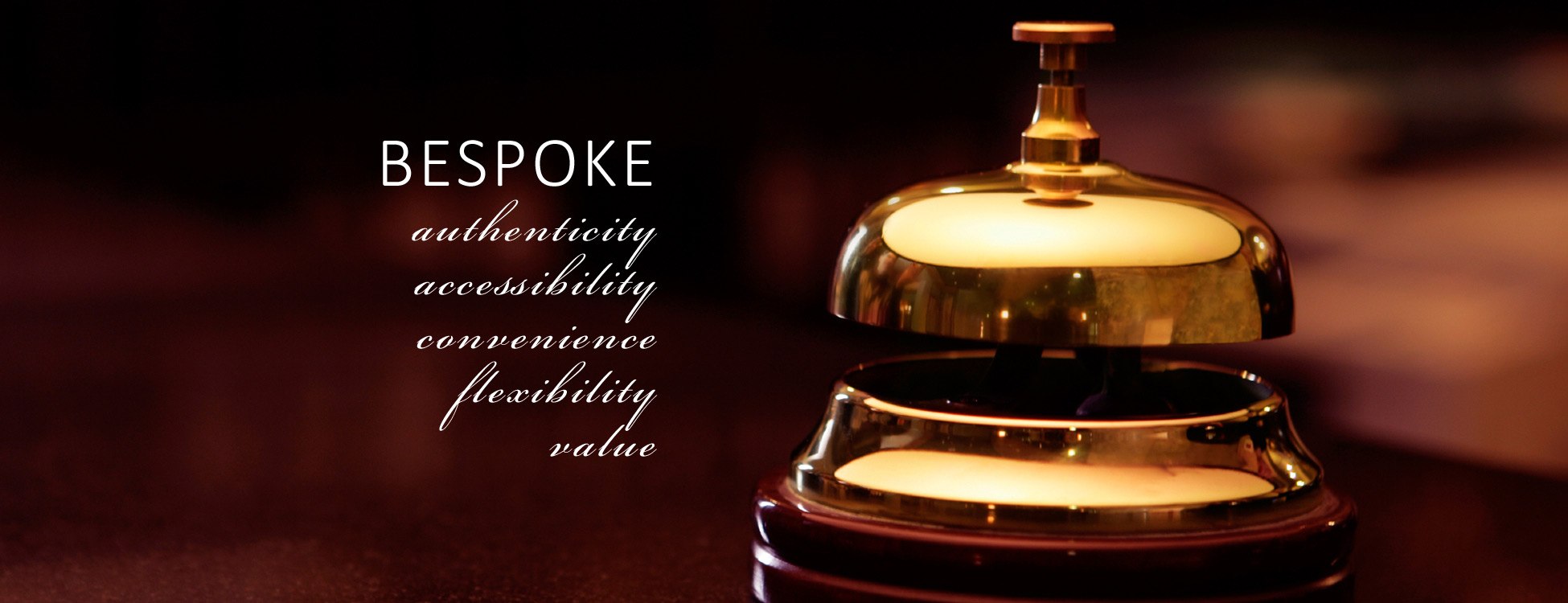
WHAT DOES "BESPOKE" MEAN ?
adjective be-spoke [bih-spohk] -- made to individual order; custom-designed: a bespoke jacket. verb be-speak [bih-speek] -- to reserve beforehand; engage in advance; make arrangements for: to bespeak a seat in a theater.
Bespoke Experiences create and curate exquisitely crafted, truly bespoke luxury travel experiences for you, our discerning clientele. Everything we do is designed to enhance your private tour by delving deeper into the culture in order to tell a richly inspiring travel story which is personalized to your exacting needs, and your locale.
Each itinerary we create is, by definition, unique.
Your private tour has exceptional value, worth every penny for your precious time. With you as co-creators of your travel experience, your itinerary is a uniquely shared adventure with local experts versus a scripted tour package. You have the flexibility to start and end when and where you want, see what you want to see at your own comfortable pace, and ask as many questions as you like via intelligent, personable conversations without interruptions.
And it’s private – just you and those with whom you choose to share this journey. Our business is personal.
Find out more
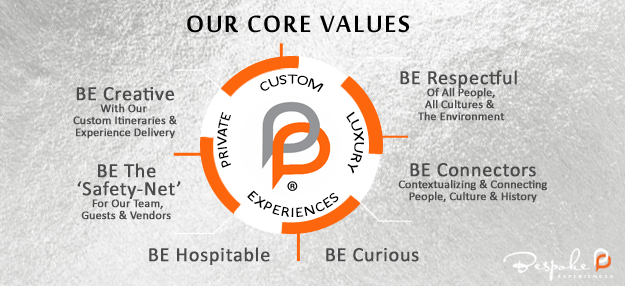
BESPOKE EXPERIENCES is registered as a standard character mark on the principal United States Patent and Trademark Office (Reg. No. 4,846,050). BESPOKE is registered as a standard character mark on the principal United States Patent and Trademark Office (Reg. No. 4,850,277).
All rights are reserved.
THE GREATEST LUXURY TODAY IS SERVICE: Our Philosophy
"We believe you deserve an opportunity to explore the world on your own terms, allowing you to craft a rich personal story based on your individual style. By definition, we believe your experience should be as unique as you."
Bespoke is your definitive source for a private, fully escorted luxury travel experience.
We serve cookies to analyze traffic and customize content on this site. See Privacy Policy

Follow us on Facebook
INSPIRED CRAFTMANSHIP
We’ll handcraft your sophisticated travel experience expertly tailored to your individual needs.
To begin the design process, please call or email us today. Click HERE for our Contact Us page.
Telephone: +1 (866) 514-8874 E-mail: info @ BespokePrivateTours.com

- Forgot your username?
- Forgot your password?

The Busy Retiree
2024’s Top 15 Budget-Friendly Travel Destinations
Posted: May 1, 2024 | Last updated: May 1, 2024

Deciding on a budget-friendly travel adventure doesn’t mean compromising on the excitement of exploration. In 2024, several enchanting destinations offer incredible experiences without breaking the bank.
Whether you’re a nature enthusiast, history buff, or beach lover, these affordable destinations promise a memorable journey. Let’s look into the cheapest places to travel in 2024, where your wallet can breathe a sigh of relief while you create lasting memories.
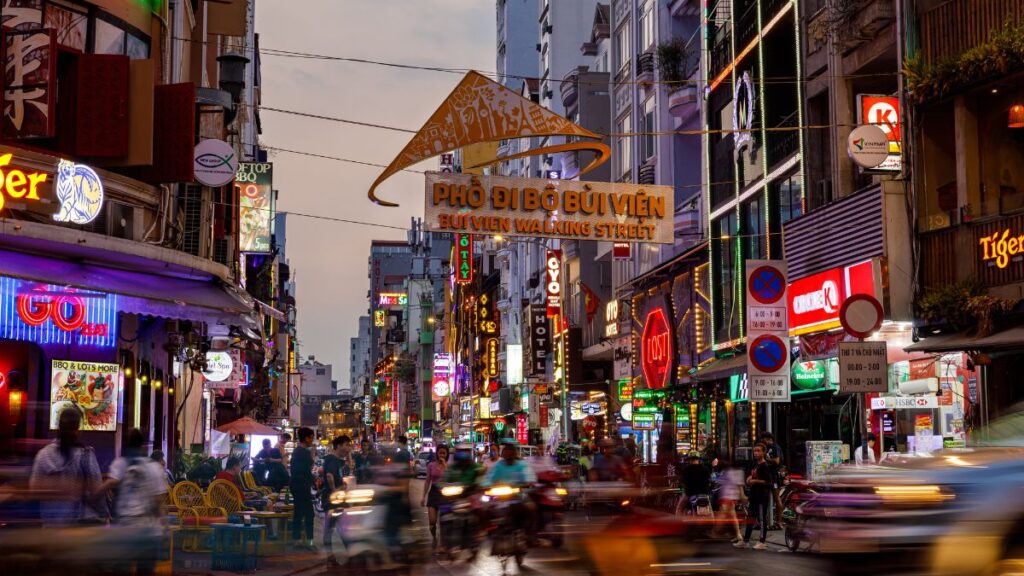
Ho Chi Minh City, Vietnam
Known for its rich history and vibrant culture, Ho Chi Minh City is a budget traveler’s dream. Explore the bustling streets filled with delicious street food, visit historic landmarks like the War Remnants Museum, and take a boat trip through the iconic Mekong Delta.
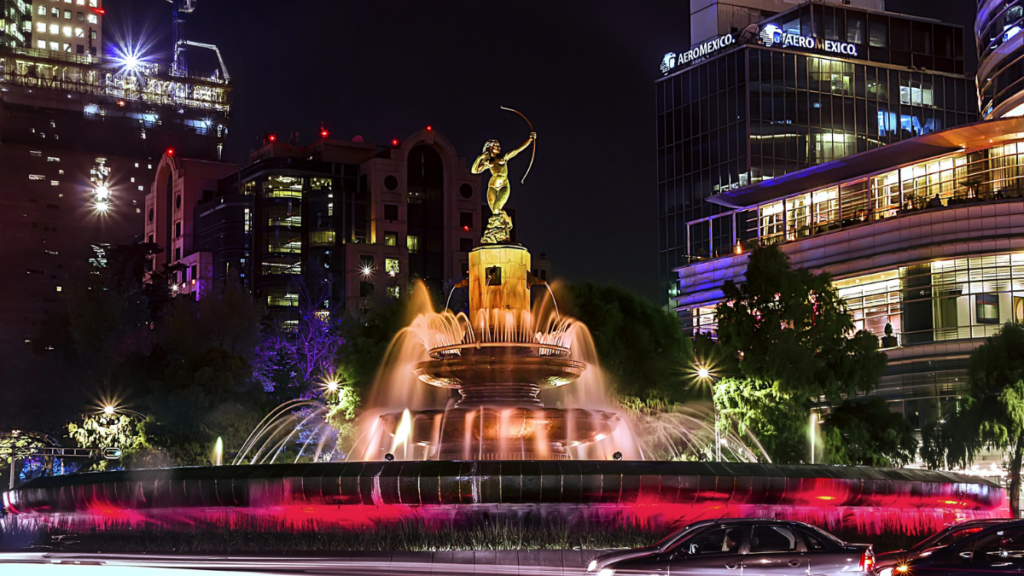
Mexico City, Mexico
Mexico City offers a perfect blend of tradition and modernity. Wander through the historic center, marvel at ancient Aztec ruins in Teotihuacan, and savor authentic tacos at local markets. With affordable accommodations and many free cultural attractions, Mexico City is a top pick for budget-conscious travelers.
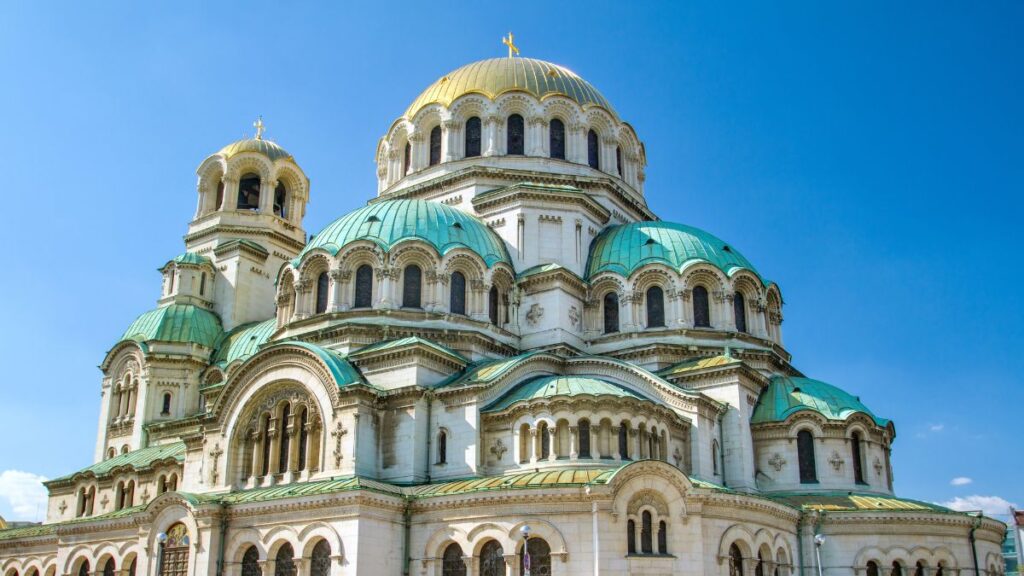
Sofia, Bulgaria
For a taste of Eastern European charm without the hefty price tag, Sofia is an excellent choice. Visit the stunning Alexander Nevsky Cathedral, stroll through Vitosha Mountain, and indulge in budget-friendly local cuisine. The affordable public transportation and low-cost attractions make Sofia an ideal destination for those seeking an affordable European getaway.
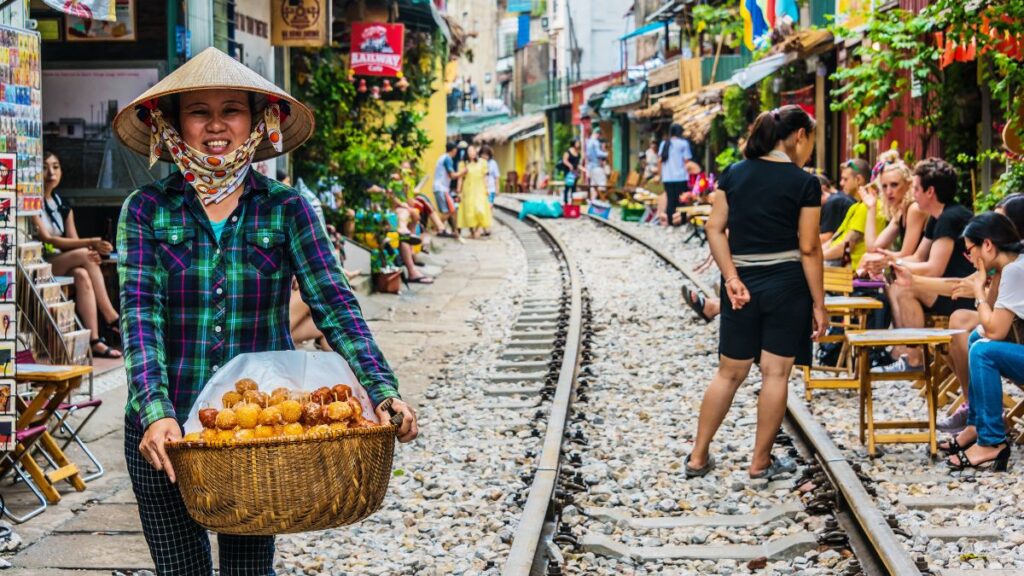
Hanoi, Vietnam
Another gem in Vietnam, Hanoi boasts a unique blend of French colonial architecture and traditional Vietnamese culture. Explore the Old Quarter’s narrow streets, sample delicious pho at street stalls, and take a leisurely stroll around Hoan Kiem Lake. Hanoi’s affordability extends to accommodations and local experiences, making it a top destination for budget travelers.

Quito, Ecuador
Nestled in the Andes, Quito offers a mix of history, culture, and breathtaking landscapes. Explore the UNESCO World Heritage-listed Old Town, take a cable car ride up Pichincha Volcano, and discover the vibrant markets. Quito’s affordability makes it an excellent choice for budget-conscious travelers looking to experience the charm of South America.
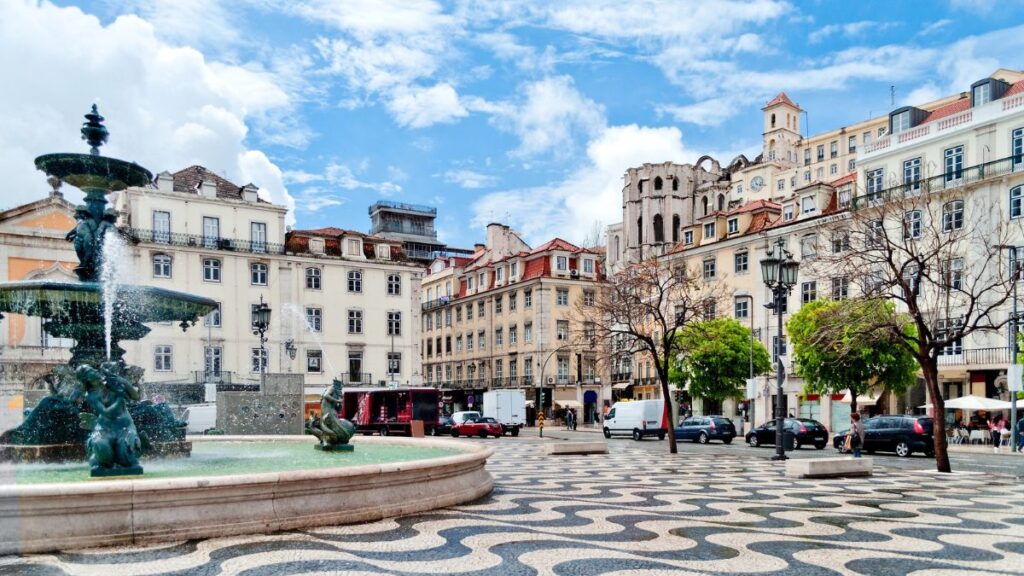
Lisbon, Portugal
Portugal’s capital, Lisbon, charms visitors with its colorful neighborhoods, historic architecture, and scenic views. Enjoy affordable local cuisine, explore the iconic Belem Tower, and soak in the vibrant atmosphere of this coastal gem. Don’t miss the famous custard tarts, Pastéis de Nata, at a fraction of the cost compared to other European capitals.
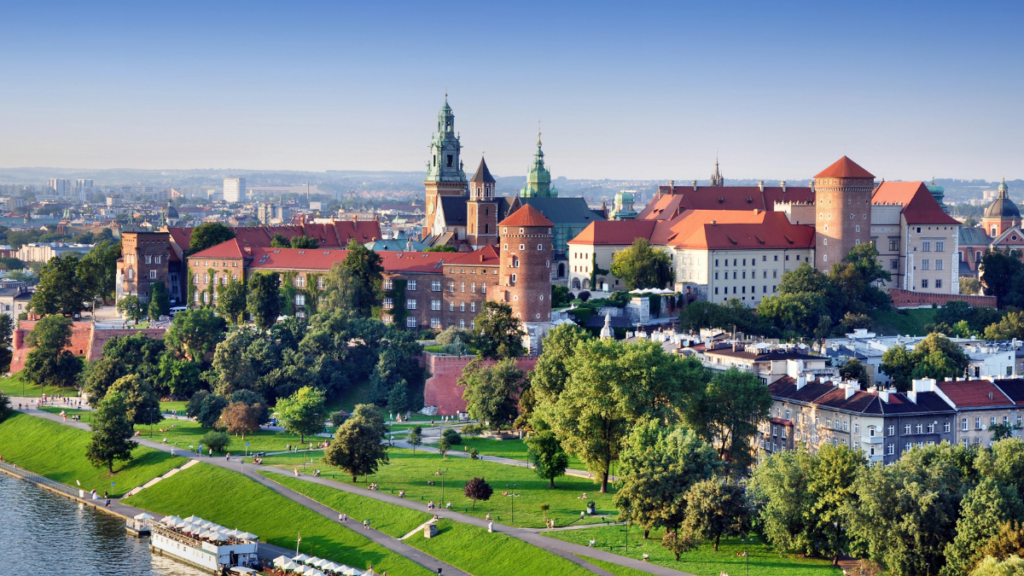
Krakow, Poland
Steeped in history, Krakow offers a budget-friendly European escape. Wander through the picturesque Old Town, visit the Wawel Castle, and experience the lively atmosphere of the Kazimierz district—all at an affordable cost. Enjoy a ride in a traditional horse-drawn carriage through the charming streets of the Old Town.
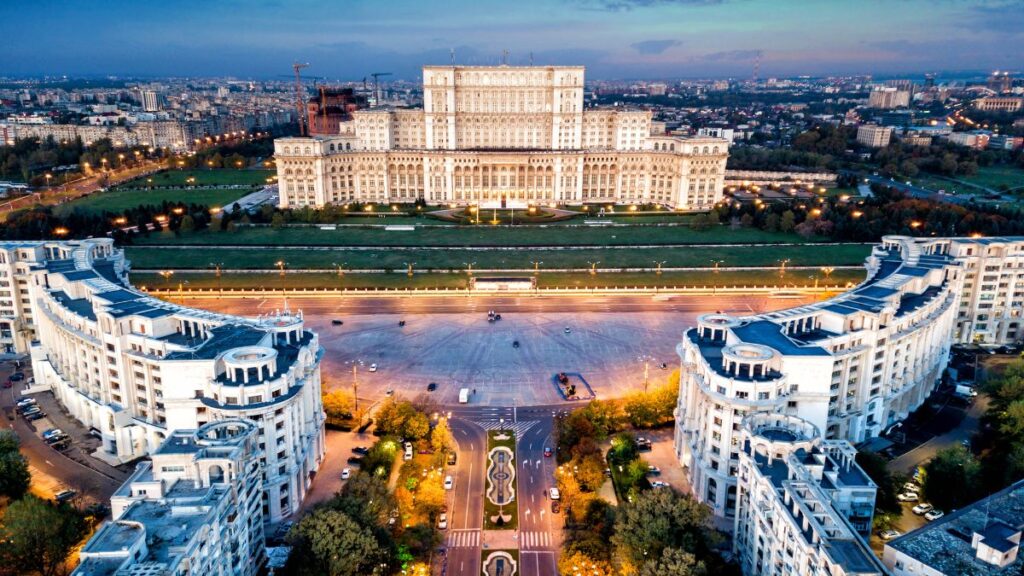
Bucharest, Romania
Romania’s capital, Bucharest, is a blend of grand architecture and modern delights. Explore the Palace of the Parliament, stroll through Herastrau Park, and indulge in the city’s thriving nightlife without breaking your budget. Discover hidden gems in the city’s lively neighborhood of Lipscani, filled with trendy cafes and vintage shops.
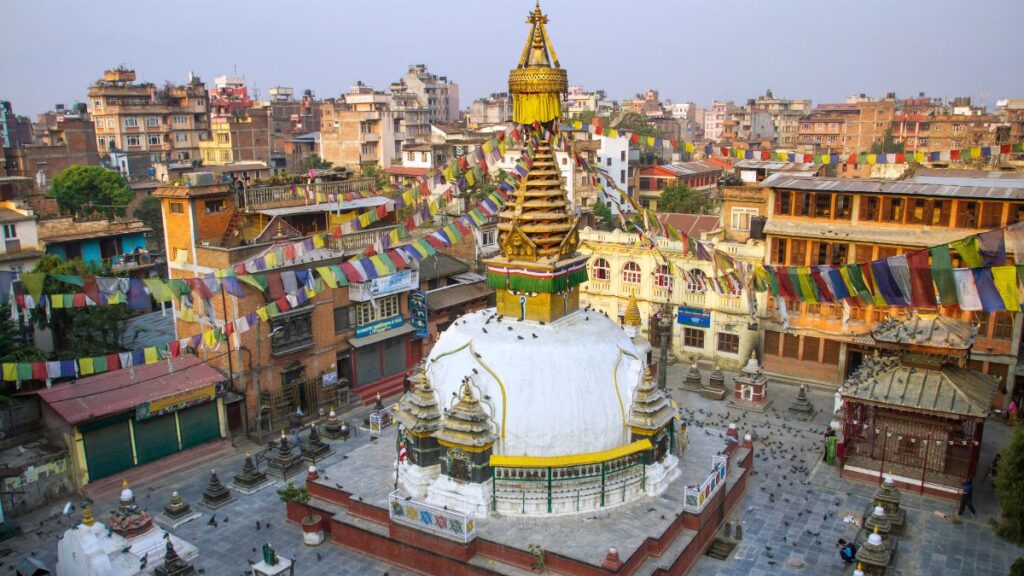
Kathmandu, Nepal
For an adventurous yet budget-friendly trip, head to Kathmandu. Discover ancient temples in Durbar Square, trek the nearby Himalayas, and experience the rich cultural heritage of Nepal without straining your wallet. Dive into the local culture with a visit to the bustling Thamel district, known for its vibrant street markets.
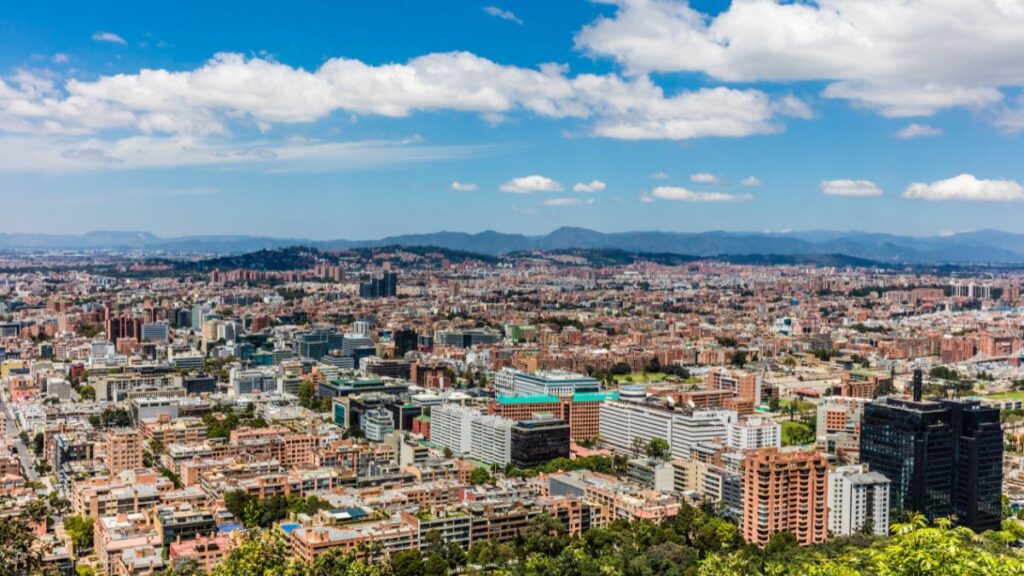
Bogotá, Colombia
Colombia’s capital, Bogotá, is a vibrant city with a rich cultural scene. Explore the historic La Candelaria neighborhood, visit the Gold Museum, and take a cable car ride to Monserrate for panoramic views—all within a budget-friendly travel plan. Immerse yourself in the city’s artistic spirit by exploring the vibrant street art scene in La Candelaria.

Siem Reap, Cambodia
Home to the iconic Angkor Wat, Siem Reap offers a unique blend of history and natural beauty. Explore ancient temples, discover the floating villages on Tonle Sap Lake, and enjoy affordable street food in this enchanting Cambodian destination. Catch a breathtaking sunrise at Angkor Wat, a moment that won’t cost you a dime.
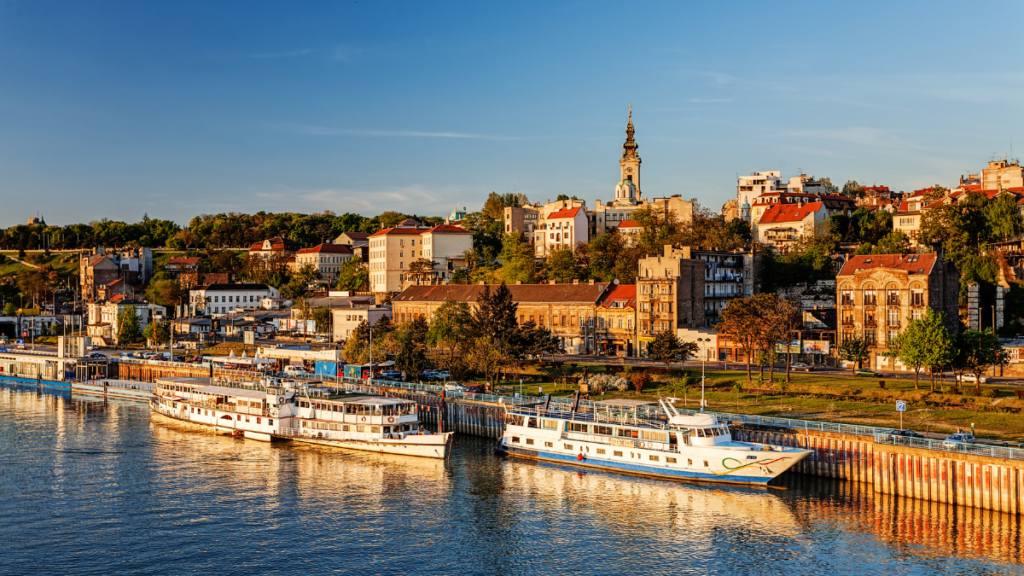
Belgrade, Serbia
Belgrade, the capital of Serbia, is known for its lively atmosphere and diverse cultural scene. Visit the historic Belgrade Fortress, stroll along the Danube River, and experience the city’s vibrant nightlife—all without breaking the bank. Join locals in a traditional kafana for live music and a taste of Serbia’s hospitality.
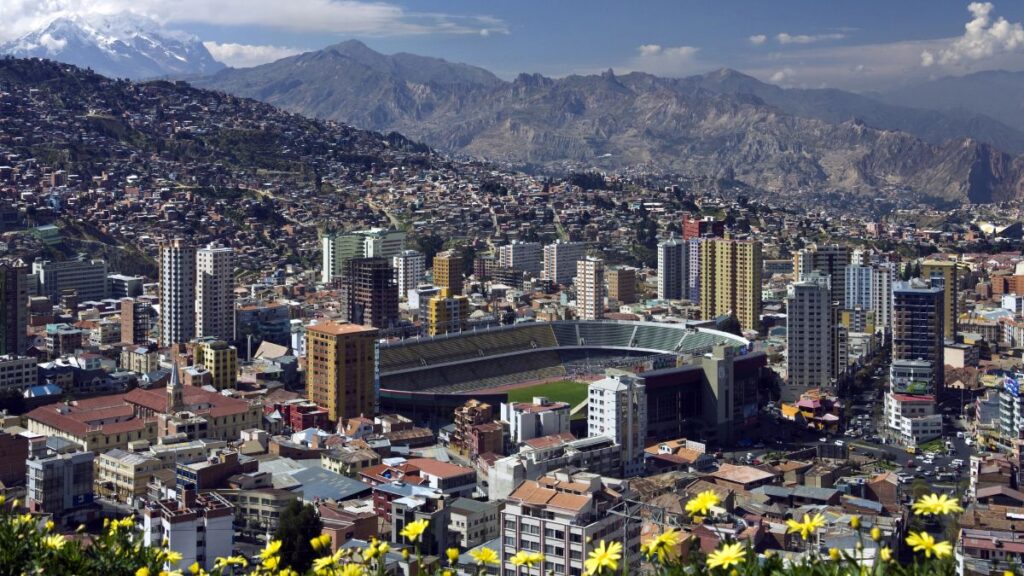
La Paz, Bolivia
Nestled in the Andes, La Paz captivates with its stunning landscapes and indigenous culture. Explore the Witches’ Market, take a cable car ride for panoramic views, and embrace the unique atmosphere of one of the world’s highest capitals. Challenge yourself with a stroll along the famous El Camino de la Muerte, the Death Road, for an adrenaline-pumping experience.
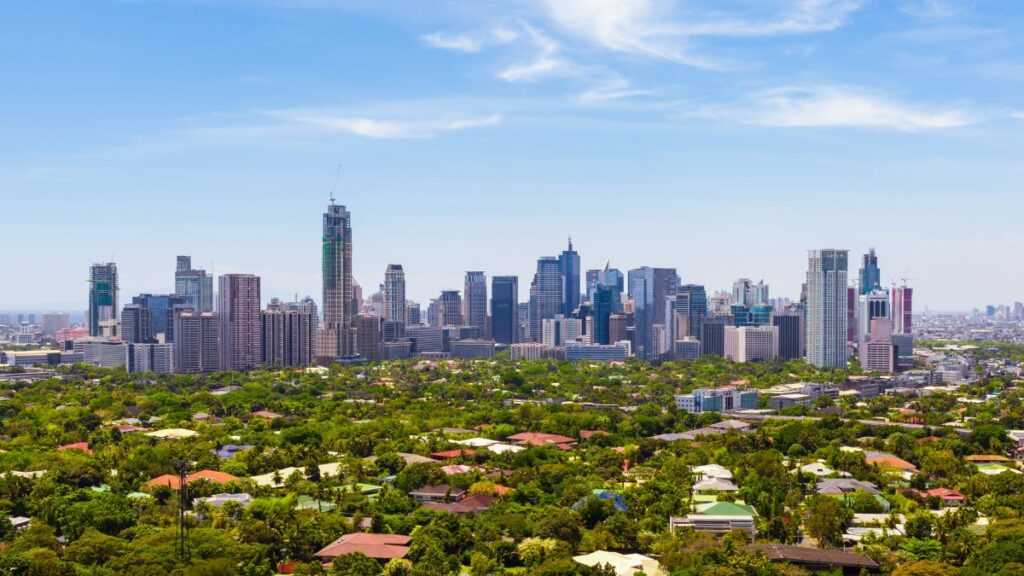
Manila, Philippines
Manila, the capital of the Philippines, offers a mix of history and modernity. Explore the historic Intramuros district, visit Rizal Park, and indulge in the diverse street food scene—all at an affordable cost. Attend a traditional Filipino cultural show to witness the country’s rich heritage come to life.
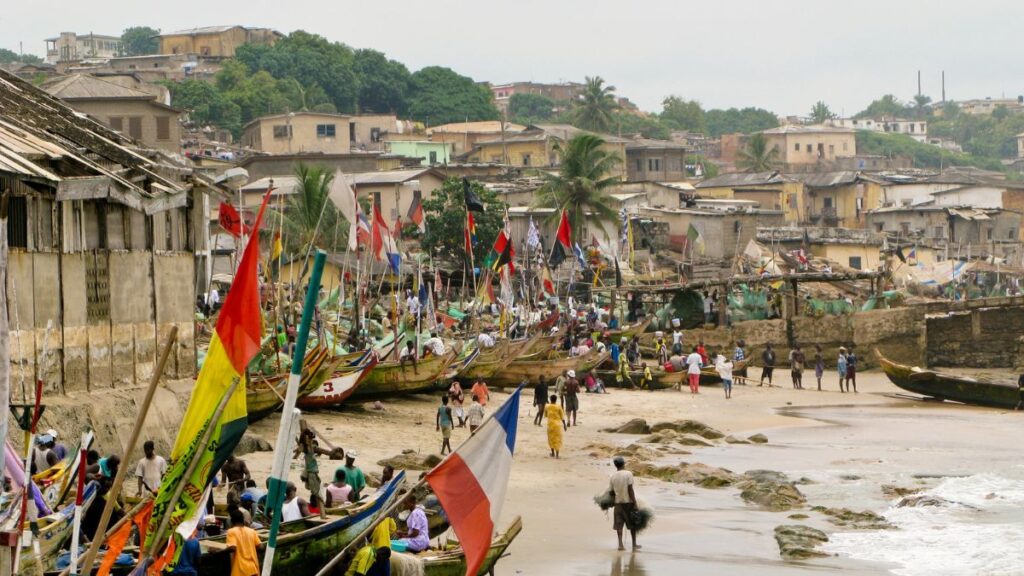
Accra, Ghana
Experience the vibrant culture of West Africa in Accra. Visit the Kwame Nkrumah Mausoleum, explore Jamestown’s colonial architecture, and relax on the beautiful Labadi Beach, all while enjoying the affordability of this welcoming city. Join locals in a dance at Independence Arch during one of Accra’s lively festivals.

15 Things the Middle-Class Will No Longer Be Able To Afford in 5 Years
15 Things the Middle Class Will No Longer Be Able To Afford in 5 Years
As retirement beckons and the golden years unfold, financial security becomes extremely important. However, the economy is ever-evolving, and what was once considered comfortably within reach…

A Guide to Earning Random Money on Cash App
In the digital age, there’s no shortage of innovative ways to make a little extra cash, and cash apps have become a popular avenue for those…

15 Part-Time Jobs For Retirees Who Just Aren’t Ready To Stop Working
Retirement doesn’t necessarily mean an end to productivity. For many retirees, part-time work perfectly balances leisure and engagement. Whether it’s to supplement income, stay active, or…

15 Tips on Navigating Financial Freedom on a Budget After Retirement
Starting on the journey of retirement with limited financial resources may seem daunting. However, with careful planning and strategic decisions, it’s possible to enjoy a comfortable…
More for You
Tips And Tricks Even Seasoned ALDI Shoppers Might Not Know
Ranking the 21 'American Idol' winners
Mountain Dew has been banned in nearly 30 countries. Here's why, plus more American favorites that are illegal elsewhere.
Your senses will shut down in a specific order when you’re about to die
How Much Beer You'd Have To Drink To Equal A Single Shot Of Liquor
In Memoriam: Cloris Leachman's Best Roles
Why do I wake up at 3 a.m. every night?
Liam Neeson thriller proves to be huge hit on Netflix despite critics' reviews
28 celebrities you probably did not know are nonbinary
Chloe Fineman Fills in for Dua Lipa as the Musical Guest in ‘SNL' Promo
We Ordered 7 Fast-Food Breakfast Sandwiches to Find the Best One
What Is the Most Poisonous Spider in the World?
5 Types of Homes That Will Plummet in Value in 2024
10 NFL teams who got worse this offseason, including the Dallas Cowboys
Boeing 737 Max whistleblower Joshua Dean, 45, dead after sudden illness
Famous Roles That 16 Actors Never Want to Play Again
Arby’s Just Launched 3 New Menu Items and Brought Back a Fan Fave
Taylor Swift Claims Record Top 14 Spots on Billboard Hot 100
Here is the true value of having a fully paid-off home in America — especially when you're heading into retirement
Six Red Flag Health Signs That Signal You've Got Dust Mites In Your Bed
Numbers, Facts and Trends Shaping Your World
Read our research on:
Full Topic List
Regions & Countries
- Publications
- Our Methods
- Short Reads
- Tools & Resources
Read Our Research On:
Where people around the world find meaning in life
Sign up for our weekly newsletter.
Fresh data delivered Saturday mornings
1615 L St. NW, Suite 800 Washington, DC 20036 USA (+1) 202-419-4300 | Main (+1) 202-857-8562 | Fax (+1) 202-419-4372 | Media Inquiries
Research Topics
- Age & Generations
- Coronavirus (COVID-19)
- Economy & Work
- Family & Relationships
- Gender & LGBTQ
- Immigration & Migration
- International Affairs
- Internet & Technology
- Methodological Research
- News Habits & Media
- Non-U.S. Governments
- Other Topics
- Politics & Policy
- Race & Ethnicity
- Email Newsletters
ABOUT PEW RESEARCH CENTER Pew Research Center is a nonpartisan fact tank that informs the public about the issues, attitudes and trends shaping the world. It conducts public opinion polling, demographic research, media content analysis and other empirical social science research. Pew Research Center does not take policy positions. It is a subsidiary of The Pew Charitable Trusts .
Copyright 2024 Pew Research Center
Terms & Conditions
Privacy Policy
Cookie Settings
Reprints, Permissions & Use Policy

IMAGES
VIDEO
COMMENTS
For some, experiential travel means doing anything that falls outside of a standard sightseeing, museum-going itinerary. For others, it is defined by interactions with locals or by going to places ...
Experiential travel is also known as immersion travel. This is because people ( tourists) are fully immersing themselves in a particular culture or a certain place - whether that be a specific site or a general country. When travelling in this way, tourists will actively seek out and engage in things that make the place what it is.
Experiential travel is a travel method that has been talked about for decades but has become increasingly popular over the last few years. It's essentially a way of traveling that allows you to really dig deep into the local culture and fully experience every new place you visit. Experiential tourism is mostly focused on experiences as ...
Experiential travel usually delves deeper into a given destination, ensuring visitors can experience it as authentically as possible. As such, tours tend to focus on less-touristy spots. Since the ...
Traveling with a purpose is about seeking a deeper understanding of ourselves and the world around us. It requires us to step out of our comfort zones and challenge our preconceived notions and beliefs. It means being open to new experiences, perspectives, and ways of thinking, and recognizing the value of diversity and inclusivity.
A travel itinerary does provide experiences with meaning and value. What's more is that the focus is broader. Classic examples of a travel itinerary include organized tours around a country or city or a cruise sailing from port to port. Another difference is that a travel itinerary generally means you bebop to multiple destinations; while a ...
Authentic experiences tend to be more memorable too. How memorable a trip is can be measured with an MTE test. The seven factors within MTES are hedonism, novelty, local culture, refreshment, meaningfulness, involvement, and knowledge. 24 items represent the factors; for example, local culture comprises three items (good impressions about the ...
Well, experiential travel, often called immersion experiences, and are what a lot of travelers have been doing for a long time, but what a lot more are now demanding from the travel industry. It is about experiencing a place with all of your senses. Your sense of smell, taste, touch and the other ones, and getting a better feel of how other ...
Equally, EXPERIENCE is about adapting and responding to the urgency of climate change and creating more sustainable options. The focus is on encouraging visitors to explore their local regions and tourists to travel off the beaten track. An experience should aim to stimulate the five senses (sight, hearing, touch, smell, and taste) and/or ...
To help companies respond to these new travel preferences, we have identified critical accelerators to drive market differentiation and improve the travel experience: 1. Creativity to inspire. Driving differentiation with scalable communications and innovative experiences will allow travel brands to meet rising motivations and ignite growth.
A recalled experience suggests it's distinctiveness and evocativeness (Larsen, 2007). Moreover, memorable tourism experiences do not necessarily mean positive experiences (Kim et al., 2021) and the degree of remembering varies depending on the individual's previous encounters, even with the same tourism service providers (Kim, 2018).
Travel entails wishful thinking. It demands a leap of faith, and of imagination, to board a plane for some faraway land, hoping, wishing, for a taste of the ineffable. Travel is one of the few ...
For most people. For Derek and Mike it was literally life-changing. After a quick trip to Copenhagen, they packed up and started a new chapter of their lives as expats in a different continent. This is the tale of their journey: "In November 2016 we had a life-changing travel experience in Copenhagen, Denmark.
Expression 1: It was a trip of a lifetime. Explanation: This expression is used to describe a travel experience that was extraordinary and unforgettable. Meaning, Usage, and Cultural Nuances: It conveys the idea that the trip was incredibly special and something that may only happen once in a lifetime.
Getting away from home and stepping outside of your usual routine is beneficial for both mind and body. The long-lasting personal benefits of visiting a foreign country far outweigh the costs and time to get there. The great travel writer Pico Lyer said: "Travel is not really about leaving our homes, but leaving our habits."
Abstract. Tourism has the potential to trigger lifelong changes through a transformative experience. However, existing tourists' transformative experience (TE) research has been criticized for lacking the embodied dimensions of transformative experiences leading to fragmented and contradictory views on what and where these experiences take ...
Tourist experiences also vary depending on 'who travels, and where' (Moon, 1997). Furthermore, today, as the boundary between 'the original' and 'the copy' is becoming increasingly blurred, the very basis of the question of whether tourism is a search for authenticity or a pseudo-event has lost its meaning.
Experiential travel, also known as immersion travel, is a form of tourism in which people focus on experiencing a country, city or particular place by actively and meaningfully engaging with its history, people, culture, food and environment. It can often be transformative. Therewith the concept is based on very similar mechanisms as for example experiential education, experiential knowledge ...
The tourist experience is a complicated psychological process. Providing a succinct. definition is a difficult task as this can encompass a complex variety of elements ( Jennings, 2006; Selstad ...
8. How Cuba Changed My Life. One of my favorite inspiring stories about travel takes place in Cuba. I visited Cuba in February 2013 and it changed my life — and I like to think it did so for the better. Interestingly, I expected a completely different country and was compelled to write about it when I got back home.
Eric Baldwin: We travel to work, to discover, to connect with family or friends, to get the perfect Instagram post, to escape. As long as we continue to question why, and whether we are doing so ...
Rather than crossing off bucket-list destinations simply by showing up and moving on, a curated trip offers a more immersive experience and handles all of the logistics for you. That might mean skipping the long lines at tourist traps and getting VIP access to exclusive events and experiences. Curated travel is a more refined and personalized ...
Bespoke Experiences create and curate exquisitely crafted, truly bespoke luxury travel experiences for you, our discerning clientele. Everything we do is designed to enhance your private tour by delving deeper into the culture in order to tell a richly inspiring travel story which is personalized to your exacting needs, and your locale.
Deciding on a budget-friendly travel adventure doesn't mean compromising on the excitement of exploration. In 2024, several enchanting destinations offer incredible experiences without breaking ...
The end of brand loyalty. Gen Z travelers are mostly brand neutral: 59% of Gen Z Hopper users are not part of any travel loyalty programs, as compared to 54% of millennials, 47% of Gen X, and 46% ...
Nearly 19,000 adults in publics ranging from the UK, Italy, Greece, Japan, South Korea, Germany, and the U.S., among others, share where they find meaning in their lives and what keeps them going.